jeudi, 02 décembre 2021
La bataille culturelle contre le progressisme : elle ne peut être menée avec des prémisses communes à ce même progressisme!
La bataille culturelle contre le progressisme: elle ne peut être menée avec des prémisses communes à ce même progressisme!
Par Juan Manuel de Prada
Ex: https://kontrainfo.com/batalla-cultural-al-progresismo-no-se-puede-combatir-con-premisas-compartidas-por-juan-manuel-de-prada/
La droite rappelle souvent la nécessité de mener une "bataille culturelle" contre le progressisme rampant, une expression destinée à dépeindre une sorte de dérapage de combat culturel, journalistique et médiatique dans lequel deux visions du monde radicalement opposées se battent pour l'hégémonie culturelle. Cependant, pour mener une telle bataille, il faut se battre avec des principes tout-à-fait opposés à ce progressisme, des principes qui proposent une alternative radicale (non pas parce qu'ils sont extrémistes, mais parce qu'ils vont à la racine des problèmes qui sont en jeu). Lorsque cela ne se produit pas, lorsqu'il n'y a pas adoption de principes radicalement opposés, la bataille des droites est inévitablement perdue.
Dans ces "batailles culturelles" grotesques, auxquelles nous assistons trop souvent, la droite arrive toujours armée du concept de liberté propre au libéralisme, armée de munitions idéologiques se référant aux droits individuels du libéralisme, à la vision anthropologique du libéralisme, etc. Et puis le progressisme rampant n'a plus qu'à utiliser ces principes à son avantage, les faisant siens, les adaptant à ses intérêts et les développant jusqu'à des extrêmes que la droite timorée n'avait jamais soupçonnés. Et puis, après avoir développé de tels principes, la droite s'insurge contre ce qu'elle appelle, de manière absurde, le "marxisme culturel", qui n'est rien d'autre qu'un libéralisme cohérent. Car le libéralisme, avec son principe émancipateur, crée le terreau de toute l'ingénierie sociale qui convient au progressisme pour construire un " ethos " hégémonique... auquel, à la traîne, les champions de la droite finissent par se rallier, même s'ils en adoptent toujours une version atténuée ou honteuse.
Certains de ces champions ne s'y associent pas du tout, mais s'engagent plutôt dans des escarmouches sur certaines questions qui exacerbent les antagonismes sociaux de la manière la plus formidable qui soit. Tout comme la gauche utilise les immigrants, les féministes ou les écologistes comme "sujets révolutionnaires" pour poursuivre son assaut contre le pouvoir, les champions de droite de cette deuxième version de la "bataille culturelle" utilisent le mouvement pro-vie ou les classes moyennes appauvries.
Mais cette modalité de la "bataille culturelle", tout en utilisant ces groupes sociaux comme béliers, envenime et réarme les détracteurs, générant ainsi une dissociation empoisonnée par un essaim de haines. Cette dissociété polarisée effraie d'ailleurs les tièdes, qui finissent par succomber aux chants des sirènes du progressisme, qui établit toujours où se trouve la modération.
Ces deux modes de "bataille culturelle" sont complètement ineptes, aussi cosmiques que soient leurs douloureuses querelles intestines. Pour mener une véritable "bataille culturelle" contre le progressisme rampant, on ne peut pas y aller avec des prémisses communes, car cela favoriserait un grotesque méli-mélo idéologique qui finit par être le ferment qui favorise l'hégémonie du progressisme.
La seule "bataille culturelle" possible ne peut être menée qu'à partir de prémisses philosophiques, politiques et anthropologiques opposées aux idéologies concurrentes ; et ces prémisses ne sont fournies que par la pensée traditionnelle.
14:03 Publié dans Actualité | Lien permanent | Commentaires (0) | Tags : actualité, bataille culturelle, gramscisme, progressisme, conservatisme, gauche, droite |  |
|  del.icio.us |
del.icio.us |  |
|  Digg |
Digg | ![]() Facebook
Facebook
lundi, 08 novembre 2021
Droite et gauche, depuis 1989, les deux bras du rouleau compresseur néo-libéral

Droite et gauche, depuis 1989, les deux bras du rouleau compresseur néo-libéral
Les nouvelles gauches fuchsia et post-marxistes finiront par devenir l'emblème même, culturellement et politiquement, du turbo-capitalisme gagnant!
Par Diego Fusaro
Ex: https://www.tradicionviva.es/2021/11/07/derecha-e-izquierda-desde-1989-los-dos-brazos-del-monstruo-neoliberal/
Tant à droite qu'à gauche, les gens ont été incapables, par myopie ou par mauvaise foi, de saisir la véritable signification historique de 1989 comme le triomphe du capitalisme américain contre toutes les formes de résistance culturelle, politique et économique. Dans la seconde moitié du 20ème siècle, le soi-disant "néo-fascisme" a largement pris la forme d'une ressource de normalisation atlantiste et anti-soviétique servile, fonctionnelle parce qu'il abandonnait toute résistance anti-impérialiste et participait au reflux complet de la droite vers le capitalisme gagnant. Une dynamique convergente de domestication des intelligences critiques avait eu lieu à gauche ; une dynamique destinée à culminer dans l'actuelle reconfiguration globale de la gauche comme front avancé de la post-modernisation capitaliste, avec la centralité incontestable de la privatisation et de la libéralisation individualiste des coutumes et de la consommation.
Grâce à une métamorphose kafkaïenne, les nouvelles gauches fuchsia et post-marxistes finiront par devenir l'emblème même, sur le plan culturel et politique, du turbo-capitalisme gagnant. Preuve en est que la Nouvelle Gauche post-marxiste, qui - comme toute force libérale - est également anticommuniste et antifasciste, aurait repris toutes les batailles du cosmo-mercantilisme après 1989, adhérant pleinement au projet de libéralisation privée dans la sphère économique, d'impérialisme éthique made in USA en politique étrangère, de dé-souverainisation au profit de la Banque centrale européenne dans la sphère politique.
Les mots de Tacite s'inscrivent dans cette course générale vers la servitude: at Romae ruere in servitium consules, patres, eques... En ce sens, il est toujours bon de rappeler comment, aujourd'hui encore, le secteur de la gauche constitue le front le plus avancé pour la dé-souverainisation et la sanctification du projet de l'Union européenne. Sur ce plan incliné, qui les amènerait à se redéfinir comme ce que Gramsci a combattu tout au long de son existence, les gauches fuchsia et arc-en-ciel, traîtresses à Marx et au projet anticapitaliste, sont en fait devenues de manière cohérente des formes articulées pour se maintenir à bonne distance du peuple et antithétiques aux intérêts matériels des travailleurs.
De la lutte contre le capital, la gauche est passée à la lutte pour le capital, se redéfinissant comme un parti glamour et individualiste, culturellement libertaire, politiquement anti-étatiste et privatiste, économiquement libéral et compétitif, géopolitiquement atlantiste : "Je me sens plus en sécurité en restant de ce côté, sous le parapluie de l'OTAN", avait déjà improvisé Enrico Berlinguer en 1976, révélant l'adhésion déjà presque totale de la gauche démo-phobe - comme de la droite - à l'ordre de la mondialisation américano-centrique et, dans ce contexte, anti-soviétique. Cette déclaration, qui condense l'embryon de la reddition de la gauche à l'atlantisme, gauche qui était en train de se redéfinir comme post-marxiste, peut pratiquement être considérée comme un achèvement de la déclaration du secrétaire du parti Refondation communiste, Paolo Ferrero, dans le journal "Liberazione" du 9 novembre 2009 : la chute du mur de Berlin "était un fait positif et nécessaire, à célébrer" (sic !). Les paroles de Ferrero, dans ce contexte, auraient pu être les mêmes que celles de n'importe quel politicien de foi libérale ferme. Non seulement cela, mais, comme cela a souvent été souligné, le secteur de la gauche s'est révélé incapable d'offrir une réponse forte et plausible à la crise du paradigme keynésien, sans parler d'une véritable alternative à celui-ci. Qui plus est, il s'est retrouvé directement à "gérer la crise du capital pour le compte du capital" : et ce sur le plan incliné qui le conduira, après 1989, à se hisser au rôle insoupçonné d'espace politique privilégié pour la représentation des intérêts des classes dominantes.

La figure de Berlinguer constitue en effet un carrefour décisif dans le processus de métamorphose de la gauche marxiste et de sa normalisation libérale et atlantiste, tel qu'il finira par se réaliser après 1989 dans la nouvelle gauche malheureuse et sans conscience, celle des porte-drapeaux de l'Union européenne. Togliatti avait fait une revendication gramscienne de la souveraineté nationale comme base de l'internationalisme et de la "voie nationale vers le communisme" (s'opposant avec la même force à l'OTAN et aux projets d'intégration européenne). Il était aussi clairement conscient du conflit structurel entre le capital et le travail.

Pour sa part, Berlinguer abandonne la référence à la souveraineté nationale des communistes, optant pour la voie de l'eurocommunisme et de l'ouverture cosmopolite (plutôt qu'internationaliste), mais aussi pour la subordination de la nation italienne à la monarchie du dollar ("le parapluie de l'OTAN"). Berlinguer a ainsi posé les bases de la redéfinition ultérieure de la gauche comme force de soutien à l'Union européenne et à cette ouverture cosmopolite qui était, de facto, l'ordre symbolique de la classe dominante et qui, dans l'imaginaire de la nouvelle gauche, réoccuperait pleinement l'espace précédemment occupé par la lutte des classes et la question du travail.
De plus, Berlinguer a remplacé de manière perverse la question sociale du conflit entre le capital et le travail par la "question morale", qui non seulement n'a rien de marxiste (puisque le marxisme considère la société du capital comme intrinsèquement corrompue, quelle que soit la conduite morale des agents individuels). De plus, elle a fini par ouvrir la voie, à son grand regret, à la fois à l'anti-keynésianisme qui marquera plus tard le quadrant de gauche comme la nouvelle force privilégiée du libéralisme après 1989, et à la perte, de la part de la gauche, de toute référence à la question socio-économique et au conflit de classe associé.
Article publié en italien sur https://avig.mantepsei.it/single/destra-e-sinistra-dal-1989-sono-le-due-braccia-del-mostro-neoliberale
12:50 Publié dans Actualité, Politique | Lien permanent | Commentaires (0) | Tags : diego fusaro, droite, gauche, gauche fuschsia, italie, communistes italiens, actualité |  |
|  del.icio.us |
del.icio.us |  |
|  Digg |
Digg | ![]() Facebook
Facebook
jeudi, 04 novembre 2021
Bonnal et la Gauche Caviar
10:29 Publié dans Actualité, Définitions | Lien permanent | Commentaires (0) | Tags : nicolas bonnal, gauche caviar, gauche, actualité, idéologie |  |
|  del.icio.us |
del.icio.us |  |
|  Digg |
Digg | ![]() Facebook
Facebook
jeudi, 14 octobre 2021
Le charme éphémère du nationalisme de gauche

Le charme éphémère du nationalisme de gauche
par Winfried Knörzer
Ex: https://wir-selbst.com/2021/08/15/der-fluchtige-charme-des-linksnationalismus/
Le nationalisme de gauche combine des éléments, des écoles de pensée et des tendances politiques qui sont généralement considérées comme opposées et incompatibles. Cette complexio oppositorum lui confère un attrait intellectuel élevé qui le rend particulièrement attrayant pour les intellectuels non conformistes et non conventionnels. Un tel être hybride est appelé chimère dans l'histoire de l'art, une expression qui n'est pas injustement utilisée dans le langage courant pour désigner des entités qui présentent le caractère de l'irréel. Le sort de ces créatures mythiques est que lorsqu'elles se matérialisent par quelque magie et apparaissent dans la réalité, elles se volatilisent en peu de temps.
Je ne veux pas développer ici des déductions abstraites, ni nier que d'autres choses soient possibles, mais seulement analyser ce qui s'est réellement passé. Tant que l'on reste dans la tour d'ivoire de la théorie, on peut penser et écrire beaucoup de choses; seule la réalité politique montre la valeur d'une position politique. Il faut partir du fait que les groupes nationalistes de gauche ont toujours été une petite minorité. Dès qu'ils ne se sont plus contentés d'écrire quelques traités et tracts, mais ont voulu agir politiquement, le processus suivant s'est régulièrement produit: au moment de l'épreuve, le nationalisme de gauche est plongé dans un tourbillon, et l'unité originelle mais toujours fragile se dissout. Les fragments du nationalisme de gauche sont alors attirés par la masse d'un objet plus grand et se fondent en lui. Le nationalisme de gauche, bien que brillant comme une comète, s'avère trop petit pour suivre son orbite de manière indépendante. À un moment donné, il est pris dans le champ gravitationnel d'une planète, plonge dans son atmosphère et se consume. Si la gauche est suffisamment forte et si, à un moment donné, pour une raison ou une autre, elle présente d'une manière ou d'une autre une orientation "nationale", cela attirera le nationalisme de gauche; le cas historiquement plus fréquent est, bien sûr, que le nationalisme de gauche tombe sous le charme de la droite (1).
 En ce qui concerne la première possibilité, je me réfère uniquement au courant dit "de Scheringer" du KPD. Le KPD lui-même n'a jamais été vraiment nationaliste, il n'en présentait pas toutes les conditions; doté d'une direction idéologiquement peu originale et dépourvue de souveraineté en termes de personnalités, il a toujours écouté, comme un chien fidèle, la voix de son maître, le PCUS. Il a joué la carte nationaliste uniquement pour des raisons tactiques. D'une part, il voulait semer la confusion dans le camp des opposants, enfoncer un coin dans le "front contre-révolutionnaire". D'autre part, il avait montré qu'il ne pouvait pas réaliser le grand renversement avec ses propres forces, à savoir des parties de la classe ouvrière. Il cherche donc de nouveaux alliés, d'une part pour accroître sa base de masse, qui concerne surtout son agitation dans les milieux paysans (Landvolkbewegung vers 1930) et petits-bourgeois, d'autre part pour recruter des spécialistes importants (théoriciens "bourgeois" pour la propagande, officiers pour l'expansion de l'organisation militaire).
En ce qui concerne la première possibilité, je me réfère uniquement au courant dit "de Scheringer" du KPD. Le KPD lui-même n'a jamais été vraiment nationaliste, il n'en présentait pas toutes les conditions; doté d'une direction idéologiquement peu originale et dépourvue de souveraineté en termes de personnalités, il a toujours écouté, comme un chien fidèle, la voix de son maître, le PCUS. Il a joué la carte nationaliste uniquement pour des raisons tactiques. D'une part, il voulait semer la confusion dans le camp des opposants, enfoncer un coin dans le "front contre-révolutionnaire". D'autre part, il avait montré qu'il ne pouvait pas réaliser le grand renversement avec ses propres forces, à savoir des parties de la classe ouvrière. Il cherche donc de nouveaux alliés, d'une part pour accroître sa base de masse, qui concerne surtout son agitation dans les milieux paysans (Landvolkbewegung vers 1930) et petits-bourgeois, d'autre part pour recruter des spécialistes importants (théoriciens "bourgeois" pour la propagande, officiers pour l'expansion de l'organisation militaire).
Les nationalistes de gauche comme Richard Scheringer, Bodo Uhse, Bruno von Salomon, Beppo Römer, qui étaient arrivés à la conclusion que la bourgeoisie ne pouvait pas contribuer au salut national, tombèrent sous le charme du KPD. Mais dès qu'ils ont adhéré à ce parti, ils ont été soumis à la ligne de celui-ci et la voix de leur nationalisme, lorsque le vent a tourné à nouveau et que les drapeaux noir-blanc-rouge avaient été rangés au grenier, s'estompait sans être entendue dans les bureaux de l'appareil du parti.
L'autre possibilité, historiquement plus courante, est incarnée de manière paradigmatique par les premiers fascismes. Mussolini était le chef de file de l'aile radicale et révolutionnaire du parti socialiste italien avant le début de la première guerre mondiale. Peu après le début de la guerre, il préconise l'entrée en guerre de l'Italie aux côtés de l'Entente. L'Italie est neutre à ce stade, bien qu'elle soit nominalement alliée aux puissances centrales. L'enthousiasme de Mussolini pour la guerre ne se nourrit pas encore de motifs nationalistes, mais découle d'une stratégie résolument de gauche. D'une part, il n'aimait pas les puissances centrales "réactionnaires", mais d'autre part, il espérait que l'aggravation de la constellation politique intérieure résultant de la guerre créerait une position de départ favorable au déclenchement d'une révolution. Cependant, par sa propagande belliqueuse, il s'aliène le parti pacifiste et finit par être exclu. Avec un groupe de personnes partageant les mêmes idées, les "Interventionnistes de gauche", il a fondé son propre mouvement politique, avec pour centre son journal Popolo d'Italia. Au fil du temps, il gagne de nouveaux alliés, les Futuristes (un groupe d'artistes modernes numériquement peu nombreux mais influent) et les membres des troupes d'élite (les "Arditi", comparables mentalement et physionomiquement aux Freikorps allemands), avec lesquels il lance le premier "Fascio" en mars 1919. Ce fascisme précoce aurait été relégué au rang de note de bas de page dans l'histoire de l'Italie - sous la rubrique des sectes politiques et des partis dissidents - si l'agitation communiste n'avait pas eu lieu.

Afin de contrer la prise de pouvoir menaçante des communistes, des fasci locaux, alliances protectrices contre-révolutionnaires, soutenues et financées par les grands propriétaires terriens et les notables locaux, se forment, de manière totalement indépendante du quartier général de Milan, surtout dans les campagnes. Afin de ne pas perdre complètement le contrôle et de ne pas sombrer dans l'insignifiance, Mussolini prend le train en marche, mais cela signifie qu'il doit s'adapter à un mouvement soutenu par un groupe de personnes complètement différent et partant de prémisses complètement différentes. En l'espace de deux ans, le fascisme avait complètement changé : un mouvement nationaliste de gauche, révolutionnaire, anti-bourgeois, socialiste modéré, était devenu un parti nationaliste de droite, contre-révolutionnaire, soutenant la bourgeoisie.
Ernst Niekisch a connu une évolution similaire à celle de Mussolini en Allemagne. Les deux hommes se sont d'ailleurs rencontrés au milieu des années 1930, et dans leur conversation, ils ont également reconnu leur passé marxiste commun. Mussolini dit à Niekisch: "Ce n'est pas vrai, il faut être passé par l'école du marxisme pour posséder une véritable compréhension des réalités politiques. Celui qui n'est pas passé par l'école du matérialisme historique ne reste toujours qu'un idéologue" (2). Dans la première moitié des années 1920 - à l'époque, il était encore un fonctionnaire social-démocrate - Niekisch avait avancé une conception peu orthodoxe et nationaliste de gauche. L'oppression de l'Allemagne par les puissances bourgeoises victorieuses sous la forme du traité de Versailles a directement affecté les chances de vie de la classe ouvrière allemande. La bourgeoisie s'est montrée incapable ou peu désireuse de lutter contre cet état de fait. Il en a donc tiré la conclusion que la lutte sociale de la classe ouvrière doit aller de pair avec la lutte de libération nationale. Il est compréhensible que ses idées soient tombées dans l'oreille d'un sourd dans la social-démocratie. À la recherche d'une base organisationnelle servant de courroie de transmission pour ses idées, il se tourne d'abord vers un groupe de jeunes socialistes à vocation nationale, le Hofgeismarkreis, et vers un groupe dissident de droite du SPD limité à la Saxe, l'Altsozialdemokratische Partei. Aucun des deux groupes n'a cependant eu une longue vie. Tout en radicalisant son cours vers un nationalisme pur (3), Niekisch s'engage de plus en plus dans la voie de la droite authentique. Aux côtés d'intellectuels de droite tels que les frères Jünger, Albrecht Erich Günther, Franz Schauwecker, Alfred Bäumler, il s'appuie sur des groupes issus du milieu des anciennes associations de Freikorps et de la jeunesse bündische. À la fin des années 1920, ce développement était terminé. Si l'on feuillette les numéros de son magazine Widerstand, celui-ci ne diffère en rien des autres publications typiquement de droite, si ce n'est par la radicalité du nationalisme poussé à l'extrême. On y trouve des publicités de la maison d'édition interne de la résistance, qui publie des livres d'auteurs bourgeois-conservateurs tels que Othmar Spann et Wilhelm Stapel. Publicités pour des mémoires de guerre et des livres sur Ludendorff, critiques positives de biographies de Bismarck et d'ouvrages sur la race, gloses anti-pacifistes et antisémites, etc.
Contrairement aux affirmations des études sur le processus de "construction de la nation" qui sont devenues populaires ces dernières années, il faut supposer l'originalité d'un amour profondément enraciné de sa propre personne (autophilie). Cette caractéristique commune est essentiellement la patrie. La portée de ce concept varie naturellement. En raison de l'absence de moyens de transport et de communication, à l'époque, le terme désignait inévitablement l'environnement immédiat: clan, village et ville, campagne. Ce n'est que grâce aux progrès des technologies de communication et de transport, mais aussi à l'importance croissante des techniques de socialisation abstraites et idéalistes, désormais transmises par l'éducation et non plus par l'expérience directe, et à la prise de conscience des points communs linguistiques, culturels et historiques, que l'expansion de ce sentiment d'appartenance à la patrie tout entière est devenue possible aux 18e et 19e siècles. Cette extension du sentiment originel de patrie à l'ensemble de la patrie est généralement appelée patriotisme. Le patriotisme est un complexe de motivation qui est encore pré-politique. Le nationalisme apparaît lorsque le patriotisme devient politique, c'est-à-dire lorsqu'il se transforme en un mouvement contre des ennemis internes ou externes. La distinction patriotisme/nationalisme correspond à la distinction de Karl Mannheim entre traditionalisme et conservatisme. Le traditionalisme est l'attachement pré-politique, pour ainsi dire inconscient, aux coutumes et traditions traditionnelles, le conservatisme le mouvement conscient, politique et militant contre la modernité.
Ce patriotisme originel et naturel appartient à l'essence de l'être humain originel, fait partie de son sentiment naturel. Cependant, le potentiel moteur naturel est toujours modifié et sur-formé par des tendances superposées. Cela peut conduire à un déplacement de la pulsion partielle autophile vers d'autres objets, par exemple non pas vers la nation en tant que telle, mais uniquement vers l'équipe nationale de football. Plus une personne est impliquée dans certains contextes sociaux, plus une solidarité de groupe se développe, qui remplace alors l'autophilie originelle. L'affiliation à des partis ou à d'autres groupes est alors le principal facteur de motivation. Un fossé s'ouvre alors entre la solidarité de groupe socioculturelle et l'autophilie originelle, qui se manifeste par un conflit d'intérêts entre le "partisan" et le citoyen moyen. Cela est devenu particulièrement clair pendant la révolution d'Allemagne centrale. Tandis que les intellectuels s'enivraient de modèles compliqués et irréels de "troisième voie", le peuple voulait la réunification. Un autre exemple, plus pertinent dans notre contexte:
Au printemps 1921, les insurgés polonais ont occupé une grande partie de la Haute-Silésie. La population allemande de Haute-Silésie est abandonnée par le gouvernement du Reich, qui craint la réaction des pays étrangers. Contre la résistance des autorités officielles, les troupes de volontaires des Freikorps parviennent néanmoins à pénétrer en Haute-Silésie et à repousser l'attaque polonaise. Les unités de ces troupes sont massivement entravées sur le chemin vers la Haute-Silésie par les employés des chemins de fer communistes et sociaux-démocrates, et les plus grandes unités sont même empêchées d'avancer par la SiPo (police de sécurité) du gouvernement social-démocrate de l'État prussien. En revanche, dans les villes de Haute-Silésie, les travailleurs communistes et sociaux-démocrates ont combattu côte à côte avec les soldats nationalistes de "droite" des Freikorps. Alors que l'autophilie s'est imposée chez les personnes directement impliquées, c'est-à-dire que le potentiel d'entraînement l'a emporté sur la sur-formation socioculturelle du parti, la loyauté au parti a prévalu chez les personnes de gauche sur le territoire du Reich, car leurs actions n'étaient pas déterminées par leurs liens avec la patrie en danger.
Cet exemple de "défense prolétarienne de la patrie" mérite la plus grande admiration, mais il n'indique en rien l'existence d'un nationalisme de gauche. La résistance à l'invasion polonaise est une expression de l'autophilie originelle et non le résultat d'une attitude résolument politique. Comme le géant Antaios, cette attitude tire sa force de la terre natale et diminue donc proportionnellement à la distance spatiale du point d'origine et temporellement avec le déclin de la menace aiguë. En revanche, les soldats des Freikorps, dont certains sont venus d'aussi loin que l'Autriche, sont de "vrais" nationalistes, car pour eux le "réveil de la nation" est un facteur de motivation principal dans leur vie, indépendamment de l'espace et de l'occasion. Cette lutte pour la patrie n'est donc ni gauchiste ni nationaliste, car elle est motivée par des forces de motivation qui trouvent leur origine dans des domaines de motivation dans lesquels les distinctions politiques n'entrent pas.
On pourrait objecter qu'il y a eu des mouvements nationalistes de gauche couronnés de succès, comme à Cuba et au Vietnam, Nasser, le parti Baath, et peut-être l'IRA. On peut dire ce qui suit à ce sujet :
 Tout d'abord, il faut se demander si la nation représente réellement le point de référence central et la valeur politique la plus élevée pour ces mouvements. À mon avis, c'est plutôt la révolution socialiste-communiste qui est le facteur décisif dans ces pays. La nation ne fournit que le cadre de référence territorial du projet révolutionnaire, qui, dans un second temps, vise à porter son propre modèle au-delà des frontières nationales (cf. l'expérience bolivienne de Che Guevara, l'extension du régime communiste au Cambodge et au Laos).
Tout d'abord, il faut se demander si la nation représente réellement le point de référence central et la valeur politique la plus élevée pour ces mouvements. À mon avis, c'est plutôt la révolution socialiste-communiste qui est le facteur décisif dans ces pays. La nation ne fournit que le cadre de référence territorial du projet révolutionnaire, qui, dans un second temps, vise à porter son propre modèle au-delà des frontières nationales (cf. l'expérience bolivienne de Che Guevara, l'extension du régime communiste au Cambodge et au Laos).
Deuxièmement, ce nationalisme de gauche doit être considéré dans le contexte de la lutte de libération anticolonialiste. Pour s'émanciper des puissances coloniales ou des régimes de gouvernants qu'elles ont mis en place, il n'y a d'abord pas d'autre objet à libérer que la nation. Tout d'abord, la souveraineté sur son propre territoire devait être établie à l'extérieur, afin de pouvoir ensuite réaliser la révolution socialiste à l'intérieur.
Une telle constellation, caractéristique du tiers monde, ne peut que difficilement être construite pour la RFA. On perdrait grotesquement le sens des proportions si l'on voulait décrire sérieusement - et non dans un sens métaphorique polémique bien utile à la propagande - la République fédérale comme une république bananière. Il y a un monde de différence entre la colonisation culturelle (cette expression n'est-elle pas déjà une métaphore ?) par McDonald's et Hollywood et la colonisation réelle qui a eu lieu au XIXe siècle. Chacun a la liberté de manger un sandwich à la saucisse au lieu d'un hamburger et de lire Goethe au lieu de regarder Spielberg ; mais les Noirs devaient saluer le drapeau britannique et travailler dans les mines et les plantations pour les maîtres blancs. C'est pourquoi les gauchistes originels et les nationalistes de gauche n'ont jamais réussi à faire croire au peuple qu'il vit dans une colonie américaine. Cette thèse, même si elle contient une bonne part de vérité, correspond moins aux faits qu'au besoin de transférer l'élan nationaliste de libération en Allemagne. On a simplement besoin d'un ennemi pour pouvoir se libérer de quelque chose. Mais ce n'est qu'un nationalisme réactif. Le vrai nationalisme, en revanche, consiste à croire en la nation, non pas dans la séparation d'avec l'autre, mais dans le fait d'être soi-même, dans la réalisation de son propre.
Troisièmement, comme il n'y a pas de système de partis déjà fermement établi dans ces "jeunes États", le nationalisme de gauche ne peut pas du tout être pulvérisé entre les puissants blocs de gauche et de droite.
Les attitudes de gauche et de droite à l'égard de la nation diffèrent par la pondération opposée de la relation fins/moyens. Pour la droite nationaliste (4), la nation est toujours une fin et une méthodologie de "gauche" socialiste est un moyen d'atteindre une fin (intégrer la main-d'œuvre dans l'État et créer une véritable Volksgemeinschaft, ou soumettre l'économie à la volonté de l'État dans le sens d'une "mobilisation totale").
Pour la gauche, en revanche, l'invocation de la nation n'est le plus souvent qu'un moyen d'atteindre certains objectifs dans une situation historique concrète. Elle part de la question: qui est l'ennemi principal, peut-il être frappé efficacement par un engagement nationaliste ? Toutes les entreprises nationalistes de gauche sérieuses ont toujours eu lieu autour des luttes anti-impérialistes: dans la lutte pour la Ruhr en 1923, il s'agissait de repousser l'invasion de l'impérialisme français, et lors du débat sur le désarmement au début des années 1980, une faction nationale-pacifiste de gauche a émergé pour s'opposer à l'impérialisme américain. Une telle situation, dans laquelle sa propre nation devient l'objet d'une puissance impérialiste étrangère, ouvre la possibilité d'une orientation nationaliste pour la gauche, car face au danger de la victoire de l'impérialisme et de l'établissement de formes de pouvoir massives et manifestement soutenues par l'armée, qui font craindre une exploitation encore plus oppressive de la classe ouvrière nationale, l'union avec les forces nationalistes apparaît comme un moindre mal.
Sur la base de cette constellation, il serait tout à fait concevable de faire "un petit bout de chemin" (comte v. Reventlow) ensemble. Mais cette constellation n'existe plus. La gauche a mis de côté la lutte contre le capitalisme et l'impérialisme et combat le nationalisme au nom d'un universalisme moral. La gauche au sens classique du terme, en tant que représentant de la classe ouvrière, n'existe plus. Le travailleur, qu'elle vénérait autrefois comme un dieu descendu sur terre, n'est plus évoqué que par des expressions de mépris - pour elle, le travailleur a dégénéré en petit bouffon. La gauche a fait la paix avec le capitalisme, elle fait désormais partie intégrante d'un immense "juste milieu" qui a enrobé l'appel classique à "s'enrichir" du vernis passéiste, favorable à l'asile, etc. avec un vernis d'"hypermoralité" (A. Gehlen) qui allège le poids sur la conscience. Dans cette vision du monde, aussi économiste que moraliste, les sujets collectifs, que ce soit la nation ou la classe ouvrière, ne trouvent plus leur place. L'individualisme dépouille les êtres humains de leurs caractéristiques liées au groupe ; dans leur pure qualité abstraite d'être humain, tous les êtres humains apparaissent alors comme égaux. Pour ceux qui le croient, il n'y a aucune raison de principe de préférer un Allemand au chômage à un Indien affamé, puisque tous deux sont également humains. Avec l'abandon de la lutte contre le capitalisme, que la gauche ne veut plus abolir, mais seulement encadrer écologiquement et "clientélistement" (en privilégiant les femmes, les homosexuels, les cyclistes, etc.), le terrain a été enlevé à la coopération entre la gauche et la droite.
Le capitalisme est la véritable force internationaliste qui dissout toutes les particularités nationales et remplace les siennes par une offre de biens uniformisée au niveau mondial. L'universalisme moral est son réflexe idéologique. Tout comme le capitalisme réduit les relations sociales à des relations d'échange abstraites, l'universalisme moral réduit la diversité concrète de l'humain, transmise historiquement, à une relation juridique abstraite. L'universalisme moral est la chaîne d'or avec laquelle le capital international lie la gauche à lui-même. Un nationaliste de gauche doit briser cette chaîne afin de retrouver la nation. Dans les rangs des nationalistes, il retrouvera le travailleur allemand et la "nostalgie anticapitaliste" (Strasser) à laquelle la gauche libérale-extrémiste d'aujourd'hui a dit adieu. Après l'effondrement du socialisme, la lutte contre le capitalisme ne peut être menée que depuis la droite, depuis une position nationaliste.
Notes:
(1) D'innombrables traités ont déjà été écrits sur la distinction entre la gauche et la droite. Devant l'impossibilité de trouver des signes distinctifs irréfutables, certains, en désespoir de cause, ont proposé d'abandonner complètement les termes "gauche" et "droite". La plupart des gens, cependant, ne se soucient pas de ces difficultés analytiques et situent leur propre position politique dans le schéma gauche/droite sans aucun problème significatif. Cette classification n'est pas le résultat d'une activité intellectuelle consciente - par exemple, en la comparant à un tableau d'énoncés doctrinaux stocké dans sa tête - mais d'une sorte de reconnaissance esthétique, sans concept. Par exemple, quelqu'un qui distribue du matériel de propagande politique dans une zone piétonne n'abordera pas tous les passants sans discernement, mais seulement ceux qu'il soupçonne d'être réceptifs à son propre message. Des signaux partiellement minimaux émis par la coiffure, les vêtements, l'expression du visage et la démarche se combinent pour former l'image d'un profil de personnalité auquel correspond une attitude politique. En d'autres termes, la plupart des gens savent ou sentent très précisément ce qu'est la gauche et la droite, c'est pourquoi il n'y a aucune raison pour moi de m'écarter de cette compréhension quotidienne.
(2) Ernst Niekisch : Une vie audacieuse. Rencontres et résultats. Berlin, Cologne, 1958, p. 263, réédité par Bublies Verlag.
(3) Par nationalisme pur, j'entends une attitude qui fait de la nation le critère unique et exclusif de la pensée et de l'action politiques et qui subordonne tous les autres domaines de la vie tels que la culture, l'économie, l'éthique, etc. aux exigences du point de vue national.
(4) Il existe aussi, bien sûr, une droite internationaliste, mais il n'est pas nécessaire de s'y intéresser ici : l'internationalisme féodal de la solidarité de classe aristocratique (Metternich et la Sainte-Alliance), la communauté religieuse transnationale du catholicisme politique, le mythe européen occidental conservateur ou de nouvelle droite.
Cette image a un attribut alt vide ; son nom de fichier est knoerzer-02.jpg.
Dr. Winfried Knörzer
Winfried Knörzer, né en 1958 à Leipzig, a étudié la philosophie, les études allemandes, les études des médias, les études japonaises à Tübingen et a passé son doctorat sur un sujet de l'histoire de la psychanalyse. Activités professionnelles : Rédacteur en chef, spécialiste de l'informatique. Il publie par intermittence depuis le début des années 1990.

Die Neuerscheinung (Juni 2021): „Farben der Macht“ von Dr. Winfried Knörzer im Lindenbaum Verlag. Hier können Sie es direkt beim Verlag versandkostenfrei bestellen: https://lindenbaum-verlag.de/produkt/farben-der-macht-der-rechte-blick-auf-die-gesellschaft-der-gleichen-winfried-knoerzer/
10:53 Publié dans Définitions, Théorie politique | Lien permanent | Commentaires (0) | Tags : allemagne, nationalisme, nation, alisme de gauche, gauche, droite, théorie politique, politologie, sciences politiques, histoire, définition |  |
|  del.icio.us |
del.icio.us |  |
|  Digg |
Digg | ![]() Facebook
Facebook
jeudi, 30 septembre 2021
La gauche bornée contre Daniel Bernabé et Ana Iris Simón

La gauche bornée contre Daniel Bernabé et Ana Iris Simón
Óscar Guardingo Martínez*
Ex: http://www.elespiadigital.com/index.php/tribuna-libre/35278-2021-09-14-16-04-54
La trampa de la diversidad de Daniel Bernabé et La Feria d'Ana Iris Simón, aux thèses opposées, ont essuyé des critiques furieuses en provenance de l'espace culturel de Podemos et de Más Madrid. Les deux auteurs ont été relégués à la position ambiguë de dissidents de gauche, tout en acquérant une certaine pertinence auprès du grand public.
Le succès dont nous parlons est objectif: onze éditions de La trampa de la diversidad ont déjà été publiées (plus de 18.000 exemplaires), tandis que Feria a été publiée douze fois (40.000 exemplaires) et figure régulièrement sur la liste des "best-sellers" et dans les vitrines des gares et des aéroports. La première chose qui frappe, c'est l'énorme écart entre ce que la gauche condamne et ce que le public apprécie.

La conclusion rapide est que culturellement, ainsi qu'électoralement, les militants de gauche vivent déconnectés du peuple, que ce soit en tant que public ou en tant que peuple. Les dizaines d'articles contre ces livres signés par des cadres de Podemos, des ex-tertulliens de La Tuerka et de Fort Apache et des experts convertis à l'environnementalisme ne semblent pas avoir réussi à porter la répudiation au-delà d'une bulle restreinte d'activisme urbain hyper-politisé. D'autre part, le succès commercial des thèses de Bernabé et de Simón - attention, parce qu'elles sont antithétiques l'une de l'autre - montre que les élites intellectuelles de la gauche espagnole sont culturellement "hors jeu". Le dernier épisode de ce désaccord de longue date a eu lieu cette semaine avec l'expulsion de Daniel Bernabé de la section Opinion de Público, malgré le fait que ses textes aient été largement partagés et commentés.
Bernabé et Simón viennent de l'extérieur de l'intelligentsia de gauche parce qu'ils n'ont pas appartenu à ses cercles sociaux: ils n'ont pas participé à des fêtes universitaires avec ceux qui sont aujourd'hui "députés pour le changement", ils n'ont pas assisté ensemble aux mêmes concerts, ils n'ont pas partagé un appartement dans le quartier branché de Lavapiés à Madrid, ils ne se sont pas rencontrés pour dîner et ils ne se retrouvent pas tous les jours dans des chats sur Telegram. C'est pourquoi beaucoup de ceux qui sont "prédestinés" par leur famille et leur formation au rôle d'intellectuels organiques de gauche estiment que, d'une certaine manière, ces deux auteurs issus du barrio ont usurpé un espace qui ne leur correspond pas, l'espace qui était réservé à ceux qui les remettent aujourd'hui en question.
De quel espace parlons-nous exactement ? Succès commercial, collaborations pour la station de radio SER, interviews et chroniques dans El País. Tout cet espace est réservé à une classe supérieure progressiste de Madrid qui montre maintenant nos deux auteurs rebelles du doigt. La plupart des critiques adressées à ces deux écrivains proviennent d'écrivains qui ont passé toute leur vie à l'université et qui comptaient bien hériter de ces podiums. C'était un prix qui leur appartenait après une jeunesse tissée de radicalisme et de flirt avec la gauche sud-américaine (surtout la gauche argentine, plus raffinée, mais aussi le chavisme et l'indigénisme). Bernabé et Simón jouent le rôle d'imposteurs et de "squatters", lui, avec un passé de simple libraire et, elle, de journaliste précaire, qui a travaillé pour le magazine féminin Telva ainsi que pour le magazine de tendances Vice. Ils ne sont pas "de leur propre chef", et ils seront donc rejetés par les "prédestinés". Cependant, une telle condamnation est comme la fatwa des ayatollahs sans les fidèles.

Le paquet idéologique de la gauche déclinante
Bien sûr, il ne s'agit pas seulement d'être étranger à la classe sociale de la jeune intelligentsia madrilène de gauche. S'il ne s'agissait que de cela, ce serait une simple question d'envie et de rancœur. Il y a aussi une question politique. Daniel Bernabé et Ana Iris Simón partent de positions antithétiques: Bernabé estime que l'heure est à la revanche contre le 15-M, qui, selon lui, a été une aberration pour la tradition de gauche. Simón, quant à elle, explique que la gauche a fini par s'approprier l'essence populaire (et populiste) du 15M pour son idéologie. Tous deux amendent de deux côtés le cocktail idéologique offert par la gauche espagnole aujourd'hui: "Féminisme, LGTBIQ+, Bienvenue aux réfugiés et un peu de travaillisme".
Les détracteurs de ces deux livres sont l'élite intellectuelle typique de la gauche de notre pays: des trentenaires qui ont consacré leur jeunesse à la communication politique, pratiquant un populisme étranger au peuple espagnol, qui préfèrent importer leurs propres visions du péronisme. Maintenant qu'ils ont cessé de faire le V avec leurs doigts et de chanter des chansons argentines, ils ont mis à profit leurs titres académiques obtenus dans les meilleures universités britanniques et françaises pour défendre des paris aussi prévisibles et suivistes que d'embrasser l'environnementalisme la semaine où les sondages allemands donnaient Die Grünen (les Verts) vainqueurs, ou d'adhérer au socialisme radical le mois où Bernie Sanders a participé aux primaires démocrates. Ils ont tellement muté qu'il est difficile de les situer. Ils sont toujours du côté de la mode progressiste du moment: il y a dix ans, ils criaient que la jeunesse n'avait pas d'avenir, aujourd'hui ils sont de fervents adeptes du progrès et décrètent des condamnations culturelles contre quiconque ose dire que la génération qui a fait la grève du 14D vit mieux que la jeunesse d'aujourd'hui.
Ana Iris Simón a écrit un roman, mais il fonctionne aussi comme un essai. Du moins, parce qu'il a une thèse claire que l'auteur a répétée dans chaque interview: "J'envie la vie de mes parents". Et c'est à partir de cette thèse qu'elle s'est connectée à un très large public de jeunes qui envient la vie de leurs parents, mais aussi, selon les mots du communiste Felipe Alcaraz, "de parents et de grands-parents qui se promènent chaque jour avec les cadavres de travailleurs de leurs enfants et petits-enfants sur le dos".
Se demander si les jeunes de 20 ou 30 ans vivent moins bien que ceux qui avaient leur âge dans les années 1990 semble plutôt absurde. C'est un débat qui a été réglé - entre autres - dans les pages du fameux rapport Petras, l'étude sociologique commandée par le PSOE pro-Felipista et ensuite cachée dans un tiroir parce qu'il n'aimait pas les résultats, qui montraient comment ses politiques avaient détruit le marché du travail espagnol pour les générations à venir. Trente ans de néolibéralisme ne passent pas en vain: il suffit de constater qu'aujourd'hui les nouvelles pensions sont déjà plus élevées que les salaires les plus courants. À l'âge de 65 ans, votre chèque de pension est plus élevé que celui d'un travailleur actif d'une trentaine d'années.
Modifications de la gauche actuelle
La thèse principale de Feria est si solide que je suis sûr qu'il doit y avoir plus que les critiques de Simon. Bien sûr que oui : la Feria contient les ingrédients d'une mobilisation politique qui modifie le cocktail idéologique de la gauche que nous avons cité précédemment (rappelez-vous : "Féminisme, LGTIBQ+, Bienvenue aux réfugiés et un peu de travaillisme"). Le piège de la diversité aussi, mais pas tant pour avoir appelé à un projet qui dépasse les factions, mais à une redistribution du poids du paquet vers d'autres contenus: "Beaucoup de Labour, un peu de Welcome refugees et un peu de féminisme". Simon, en revanche, modifie l'ensemble de l'offre et propose les ingrédients d'un projet aux émotions politiques nouvelles. Les émotions dans son sens étymologique, c'est-à-dire quelque chose qui fait bouger, qui mobilise.


La Feria offre des outils pour un nouveau populisme (le "isme" du peuple), mais pas en important un Perón qui, en Espagne, sonne martien, mais en assemblant des éléments populaires de notre nation: la nostalgie comme émotion face à un néolibéralisme qui a précarisé les vies en termes matériels (droits du travail et accès au logement), mais qui a aussi dissous les liens communautaires tels que l'amour de la patrie, de la famille et du parti, dans sa variante de la vie sociale au siège local, de l'espace de rencontre, de la camaraderie et de la formation d'une identité communautaire (c'est ainsi que sa famille paternelle vit le militantisme au sein du PCE). Elle a même osé aller un peu plus loin: elle est allée à l'église dès son plus jeune âge, au grand dam de son père athée. Feria exalte en fait les liens humains forts qui ont été affaiblis par les montagnes russes individualistes de la société de consommation.
Espagne et Ledesma Ramos
Il y a dans Feria un débordement de ce qui est permis par la gauche actuelle. Je fais référence à l'acceptation de l'Espagne de manière décomplexée, comme un pays qui appartient aussi aux gens ordinaires, ni meilleur ni pire qu'un autre après avoir accompli quatre décennies de démocratie. Alors que la gauche du PSOE maintient le tabou de ne jamais dire "Espagne" et remplace ce mot par des expressions telles que "l'État tout entier", Ana Iris Simón assume et embrasse l'Espagne. Les citations de Ramiro Ledesma Ramos ont été particulièrement controversées, bien que la personne citée dans le livre soit l'intellectuel Ledesma, une incarnation antérieure au politicien qui a fondé le syndicalisme de la Falange. La question se pose aisément : la gauche universitaire a-t-elle raison de lui faire des reproches ? a-t-elle une légitimité ?

Déchirer ses vêtements pour avoir cité Ledesma Ramos dénote une indignation surfaite, qui n'est pas apparue lorsque la jeune écrivaine antisystème et lauréate du prix national de littérature Cristina Morales, applaudie et récompensée en permanence par la gauche (même par l'Injuve andalou en 2012), a fait exactement la même chose. Les citations continues de Carl Schmitt, juriste de premier plan aux temps du nazisme, communes aux intellectuels de Podemos (surtout Errejón et Monedero), ne semblent pas non plus poser de problème. En fait, Ledesma Ramos lui-même a toujours été dans l'ADN du message de Podemos. Peu de différences peuvent être trouvées entre les discours vibrants d'Iglesias et d'Errejón proclamant que "la patrie n'appartient pas à ceux qui ont des comptes en Suisse ou un siège à l'IBEX" et la célèbre citation de Ledesma Ramos selon laquelle "seuls les riches peuvent se permettre le luxe de ne pas avoir de patrie".
Mon problème avec Ledesma Ramos? Son aversion élitiste pour la participation politique des masses mettra toujours la gauche mal à l'aise, sans compter que son engagement dans la violence pour exterminer l'opposition l'invalide comme point de référence pour un projet national-populaire. C'est ce qu'a expliqué récemment le pape François: l'Espagne a besoin de réconciliation, ce qui ne signifie pas abandonner nos positions politiques mais entrer dans un processus de dialogue national.
En réalité, Ledesma ne plaît même pas à l'aile droite espagnole de 2021, qui, au lieu de soutenir l'esprit d'entreprise national, s'est lancée dans un programme grotesque de défense de la bourgeoisie de la Silicon Valley, de Wall Street et de Barcelone (le fondateur de Glovo, Oscar Pierre, est la quatrième génération d'un arbre généalogique de la bourgeoisie catalane). Le caractère anti-bourgeois de Ledesma semble incompatible avec une droite espagnole dominée par les cadres des quartiers de Salamanque et les étudiants de MBA. Parfois, avec une pointe de sarcasme, on se demande si le syndicat Vox n'est pas au service du projet mondialiste de George Soros.
Le succès commercial de Bernabé et Simón, face au barrage lassant de critiques de la gauche universitaire, alors que le public populaire vibre du succès des deux livres, me rappelle ces critiques musicaux élitistes des années 2000 qui ne reconnaissaient pas les tubes de Juan Magán, même s'ils passaient en boucle dans les discothèques, les bars de plage et les fêtes de quartier. Après avoir surfé sur la vague d'indignation populaire en Espagne depuis 2011, la gauche du PSOE donne à nouveau l'impression d'être méfiante et déconnectée du peuple. Ces dernières années, son soutien s'est réduit à la taille de ses équivalents européens: entre 6% en Allemagne et 2,5% en Italie. C'est pourquoi je suis tenté d'utiliser le terme "shrinking left" pour les définir.
Aux antipodes de cet écrasement, des auteurs comme Daniel Bernabé et Ana Iris Simón parviennent à se connecter au goût et à la mentalité populaires. Ils le font parce qu'ils intéressent et émeuvent indubitablement les gens. Il faut les féliciter, même si la gauche déclinante peut le regretter, consternée par le fait que les goûts populaires d'aujourd'hui prennent des chemins très différents du projet qu'ils nous vendent, qui peut se résumer à "Féminisme, LGTBIQ, Bienvenue aux réfugiés plus un peu de travaillisme".
* Óscar Guardingo était un sénateur de Podemos. Il est maintenant revenu travailler dans l'usine de moulage par injection d'aluminium de la fonderie SEAT Componentes.
Source : Vozpopuli
19:20 Publié dans Actualité, Théorie politique | Lien permanent | Commentaires (0) | Tags : gauche, gauchisme, gauche espagnole, espagne, europe, affaires européennes, théorie politique, philosophie politique, politologie, sciences politiques, daniel bernabé, ana iris simon |  |
|  del.icio.us |
del.icio.us |  |
|  Digg |
Digg | ![]() Facebook
Facebook
mardi, 21 septembre 2021
Sur le speed-liberalisme et la gauche édulcorée

Sur le speed-liberalisme et la gauche édulcorée
Diego Chiaramoni
Source: https://posmodernia.com/sobre-el-liberalismo-speed-y-la-izquierda-edulcorada/
Gabriel Marcel avait l'habitude de dire que la mode est la cousine germaine de la mort. Les avant-gardes, au-delà de la force impérative avec laquelle elles font irruption sur la scène artistique ou politique, portent toujours le germe de leur propre disparition. Les noms et les œuvres qui perdurent dans le temps survivent en raison du germe de vérité ou de beauté qu'ils portent et non pour le simple fait d'avoir été avant-gardistes. Lorsque l'on échange des idées avec le progressiste moyen, dans le scénario imposé du politiquement correct et en tenant compte des susceptibilités à fleur de peau, les seuls contre-arguments que l'on entend sont les suivants: "vous êtes arriérés", "les choses changent", "retournez au Moyen Âge", etc.
Nous pensons qu'il doit être vraiment triste de militer pour les idées d'aujourd'hui, sachant qu'elles n'ont aucune densité ontologique autre que leur nouveauté et que le simple passage du temps les pulvérise. Pourquoi mettre tant d'énergie à militer aujourd'hui pour quelque chose qui ne vaudra plus rien ? Bien sûr, c'est là le cœur du problème: les vérités ont à voir avec l'incarnation des valeurs et non avec le relativisme de l'époque; une femme sort de chez elle sans porter de jupon, mais lorsqu'elle croise un voisin, elle le salue quand même par un "bonjour". C'est la différence entre une marchandise soumise au temps et une valeur.
La scène politique actuelle (et la métapolitique, comme le gaucho Alberto Buela aime à le dire dans notre aréopage), semble être déchirée entre deux positions: a) le libéralisme de la vitesse (le speed-liberalism), dont les nouveaux visages prennent le nom de "libertaires", et b) la gauche édulcorée, qui reprend certaines vieilles idées et les nouveaux chants des sirènes du progressisme moral. Analysons brièvement les deux positions:
 Le speed est une boisson énergisante très répandue chez les jeunes. La combinaison d'éléments chimiques tels que la caféine et la taurine donne au buveur (selon la publicité), concentration et performance. Le nouveau visage du libéralisme semble assumer les effets "bénéfiques" de cette boisson. Dans tous les débats publics, ses partisans affichent la musculature de leurs idées: culte de la liberté individuelle, bonté du capitalisme, mépris de la plèbe et réalisation de soi comme but suprême. Dans notre pays (nous faisons référence à l'Argentine), on a inventé deux caractéristiques que, noblesse oblige, nous pensons qu'il est important de souligner. D'une part, l'impudence vertueuse de gifler la classe politique qui infeste le Congrès, la Maison du gouvernement et les enceintes gouvernementales. En revanche, certains de ses représentants de renom ont défendu les valeurs de la famille, de la vie et de l'éducation sans myopie idéologique. De plus, face à la question de l'avortement, ces mêmes représentants ont élevé la voix face au silence pusillanime de nombreux "pasteurs" lâches.
Le speed est une boisson énergisante très répandue chez les jeunes. La combinaison d'éléments chimiques tels que la caféine et la taurine donne au buveur (selon la publicité), concentration et performance. Le nouveau visage du libéralisme semble assumer les effets "bénéfiques" de cette boisson. Dans tous les débats publics, ses partisans affichent la musculature de leurs idées: culte de la liberté individuelle, bonté du capitalisme, mépris de la plèbe et réalisation de soi comme but suprême. Dans notre pays (nous faisons référence à l'Argentine), on a inventé deux caractéristiques que, noblesse oblige, nous pensons qu'il est important de souligner. D'une part, l'impudence vertueuse de gifler la classe politique qui infeste le Congrès, la Maison du gouvernement et les enceintes gouvernementales. En revanche, certains de ses représentants de renom ont défendu les valeurs de la famille, de la vie et de l'éducation sans myopie idéologique. De plus, face à la question de l'avortement, ces mêmes représentants ont élevé la voix face au silence pusillanime de nombreux "pasteurs" lâches.
Le problème de ce nouveau visage du libéralisme peut être résumé en trois points fondamentaux, à savoir:
A) Le culte de l'individualisme, conséquence logique du modèle d'homme adopté par la doctrine libérale. Cette vénération de l'individu au détriment du bien commun entraîne une rupture avec la notion de communauté, qui est la sphère de valeurs où la personne humaine trouve refuge et acquiert progressivement maturité pour l'épanouissement de son propre potentiel. Juan Perón l'a bien exprimé dans son texte de clôture du Congrès de philosophie tenu à Mendoza, en Argentine, en 1949, lorsqu'il a déclaré: "Personne n'est épanoui dans une communauté qui ne l'est pas". Il est vraiment étrange que le libéralisme défende en même temps la liberté individuelle inviolable de la chambre et les valeurs morales de la vie commune. Depuis quand le libéralisme est-il le garant de l'orthodoxie morale du peuple ? Quand la vertu ne se cultive pas dans la solitude, elle ne peut pas non plus être le mortier de la vie communautaire, jamais cet homo duplex du libéralisme n'a conquis le paradis terrestre qu'il promettait.
B) Le capitalisme en tant que bienfaiteur de l'humanité, conséquence de son culte de l'argent comme bien suprême de la vie humaine. Le libéralisme dans sa version speed-libertaire analyse la réalité à partir d'une reductio à l'économie et en cela, ils sont solidaires de la doctrine à laquelle ils prétendent s'opposer: le matérialisme marxiste. La personne, élément substantiel de la communauté, est bien plus que ce qu'elle achète ou mange; elle est une hiérarchie de valeurs dans la complexité de sa vie spirituelle; elle est liberté, drame et désir de sens. Dans son culte du capital, le libéralisme impose un faux principe: le capitalisme assure une vie équilibrée, et de la même manière qu'il se répand et triomphe dans la société nord-américaine ou nordique, par propriété transitive, il doit aussi triompher en Argentine, au Mexique ou en Espagne. Bien sûr, le libéralisme ne comprendra jamais l'élément religieux qu'il porte dans son ADN, c'est-à-dire qu'il est le fruit de la Réforme qui, à l'aube de la Modernité, a fracturé l'unité spirituelle de l'Europe. Le capital semble être la forme ultime de la subjectivité moderne. Notre ethos culturel hispano-américain est réfractaire à cet esprit, car il existe une chose appelée idiosyncrasie, ou mieux encore, le profil spirituel des peuples, qui prend racine dans les trois éléments qui donnent naissance à ce que les Romains appelaient genius loci : le climat, le sol et le paysage. Les idéologies importées n'ont jamais contribué à la croissance d'un peuple, tout simplement parce que personne ne grandit à partir de ce qu'il n'est pas [1].
C) L'idée vacillante de la liberté, dépourvue de vision métaphysique. L'énergique libertaire de ces temps-ci pousse son cri sacré qui dit "Vive la liberté" ! Et à quoi se résume cette liberté ? C'est que chaque individu ne doit pas voir ses idées, et encore moins son porte-monnaie, mis sous contrôle. Bien sûr, mais la liberté est plus profonde, c'est un don qui appartient au domaine de l'esprit et qui est ordonné au bien. "Eh bien", dira le libertaire, "c'est du platonisme, et ici c'est l'Évangile selon Milton Friedman". L'autorégulation de l'homme par sa raison est aussi utopique que le paradis marxiste d'une société sans classes. Derrière la richesse d'un individu ou d'un État, il n'y a pas toujours un passé sans tache. Celui qui a entrevu, avec ironie et lucidité, les dessous cachés de cette doctrine est le prêtre Castellani, qui, se référant au libéralisme d'antan, qui, comme celui d'aujourd'hui, consistait en une sorte d'élan de jeunesse face à une foule de choses qui devaient mourir, lançait lui aussi le cri "Vive la liberté". Ce qu'ils ne savaient pas, dit Castellani, c'est que derrière cette Liberté dorée et rose du libéralisme, il y avait d'abord une erreur, puis une fiction, puis une hérésie; l'erreur de la liberté du commerce, la fiction de la souveraineté du peuple, et l'hérésie de la Religion de la Liberté - opposée à la religion du Christ mais dérivée de celle-ci" [2].
Voilà pour le nouveau visage du libéralisme, le speedisme libertaire. Face à cela, il existe une autre espèce, phénoménologiquement plus difficile à aborder bien que basique dans son déploiement militant: la gauche édulcorée. Lorsque la gauche n'était pas animée par une préoccupation sociale sincère, son moteur intime était le ressentiment. Le ressentiment est un phénomène psychique qui tire sa force de l'impuissance face à la valeur qu'il ne peut imiter et de la rébellion contre le réel qu'il ne peut changer ; c'est pourquoi le ressentiment est une "auto-intoxication psychique", comme l'a brillamment défini Max Scheler (3).
Avec la lente progression du capitalisme dans le monde, la gauche a progressivement perdu son sujet historique, le prolétaire en tant qu'acteur de la révolution, et dans cette éclipse, sa force vitale, sa "mystique", s'est également obscurcie. La "révolution" devait alors se faire par d'autres moyens et la gauche a opté pour la culture. Bien sûr, ce qui était au départ une contre-culture est progressivement devenu le bouffon le plus grotesque de l'oligopole financier international. La gauche actuelle, édulcorée, comme nous l'avons appelée, ne rougit même pas de parler de sa vocation anti-impérialiste et, en même temps, de prendre en charge toutes les causes des maîtres du monde. Et pourquoi cela? Parce que le ressentiment rend aveugle. Quelle différence entre cette gauche qui milite pour la mort prénatale et ce poète exalté, peut-être le meilleur de toute sa génération, Miguel Hernández, lorsque, dans les vicissitudes de la prison et de la mort, il s'accrochait à la vie qui grandissait dans un ventre: "sauf ton ventre, tout est sombre, sauf ton ventre, clair et profond". Celui qui l'a vu avec des yeux aiguisés et une écriture fourchue, c'est Francisco Umbral, le meilleur chroniqueur espagnol des dernières décennies du XXe siècle et au-delà, car aujourd'hui encore, ce Paco continue de s'épanouir chez ceux qui imitent son style. Dans un article mémorable et polémique, prenant comme toile de fond les échos de la chute de l'URSS, Umbral, dans les pages d'El Mundo a écrit :
"Ici, en Occident, nous sommes très fiers de nos corruptions démocratiques, nous vivons quotidiennement la fagoterie d'une liberté qui n'est pas la liberté et nous pensons avoir fait la révolution parce que les homosexuels s'embrassent déjà sur la Gran Vía et la Cinquième Avenue à New York, mais pour moi, il est plus urgent de désencombrer la Gran Vía et la Cinquième Avenue des mendiants, des ressortissants du tiers-monde, des aveugles, des chômeurs avec des moignons et des pancartes et de faire quelque chose de vraiment social et juste avec eux" [4].

La sincérité brutale d'un socialiste sentimental. De ces socialistes qui remplissaient les cafés de poésie, il ne reste rien d'autre qu'un casting de marionnettes progressistes au service de l'atomisation des peuples.
Nous pensons que la vieille dialectique entre la gauche et la droite est désormais obsolète et que le labyrinthe peut être surmonté par le haut. Aujourd'hui, c'est l'identité contre le mondialisme, c'est la dignité du pain bien mérité et une table austère mais heureuse. Et nous croyons, parce que nous prêchons la dignité de la personne, ni le sujet sans visage ni le culte individuel de son propre ego, parce que nous croyons en une tradition qui ne vénère pas les cendres - comme disait Chesterton -, mais vit dans le désir de maintenir le feu allumé.
Notes:
[1] Voir : Jean-Paul II. Centesimus annus (1991)
[2] Leonardo Castellani. Essence du libéralisme. Ed. Nuevo orden, Buenos Aires, 1964 : p. 7.
[3] Voir : Max Scheler : El resentimiento en la Moral. Espasa-Calpe, Buenos Aires, 1938.
[4] Francisco Umbral. Los placeres y los días. El Mundo : 14/01/1992.
14:56 Publié dans Actualité, Philosophie, Sociologie | Lien permanent | Commentaires (0) | Tags : libéralisme, gauche, actualité, problèmes contemporains |  |
|  del.icio.us |
del.icio.us |  |
|  Digg |
Digg | ![]() Facebook
Facebook
samedi, 15 mai 2021
Pourquoi la gauche aime-t-elle le confinement?

Pourquoi la gauche aime-t-elle le confinement?
Par Marco Malaguti
Des États-Unis à l'Italie, de l'Allemagne à l'Espagne, la gauche a partout été le "parti du confinement". Curieux pour ceux qui, ces cinquante dernières années, avaient fait de la liberté de circulation et de l'"interdit d'interdire" leurs étendards. Y a-t-il une raison à cela ou est-ce vraiment un coup de chance?
SOURCE : https://www.progettoprometeo.it/perche-la-sinistra-ama-il-lockdown/
Au début de la pandémie, nous pensions que les mesures sévères prises par les autorités chinoises pour contenir les contagions (confinement total, couvre-feu, locaux fermés par l'autorité, etc.) n'auraient jamais été adoptées en Europe, et notamment en Italie. Mais comme souvent, la réalité a dépassé le fantasme, et la situation de notre pays nous est bien connue. Cependant, l'un des rares éléments de certitude, qui était également destiné à être balayé, était que toute la galaxie progressiste, qui avait fait de la liberté et de la mobilité ses drapeaux de guerre, aurait opposé une résistance farouche aux mesures coercitives adoptées par le gouvernement Conte Bis.
A vrai dire, les prodromes de la pandémie ont semblé donner raison aux préjugés précédemment entretenus: Matteo Salvini entendait mettre en quarantaine rien moins que les enfants arrivés de Chine. Un scandale digne de la pire droite souverainiste et raciste! Garder les enfants étrangers à la maison pour des raisons de santé? La folie! Fermer les frontières? Aucune chance. Ouvrez les ports (et les aéroports), embrassons les Chinois, tout le monde dîne au sushi wok et les déclarations de ce genre deviennent de plus en plus démentes. Vous frissonnerez, et rirez en même temps, si vous feuilletez l'un des journaux en kiosque entre janvier et février 2020. Entre un Nicola Zingaretti prenant l'apéritif dans un Milan désert et un Corrado Formigli dévorant un nem en direct à une heure de grande écoute sur La 7, il n'y avait aucun doute: les drapeaux de la gauche post-moderne étaient toujours les mêmes, liberté de mouvement à tout prix, interdit d'interdire, abolition des frontières, Erasmus permanent comme mode de vie. Il n'a fallu que quelques mois pour que ce paradigme soit complètement renversé. La même galaxie progressiste est maintenant alignée sur le camp diamétralement opposé. Non seulement ceux qui voulaient autrefois abattre toutes les frontières les ont maintenant rétablies, même entre les régions et les communes, une circonstance que nous pensions avoir déjà surmontée à la fin du Moyen Âge, mais ils ont même fait du "rester chez soi" leur propre croisade de civilisation.

Autrefois réservée à la droite la plus réactionnaire et sécuritaire, la lutte contre les bivouacs et la vie nocturne sauvage est devenue l'apanage de la gauche, qui avait bâti sa fortune électorale sur le laxisme à l'égard du délabrement urbain, des repaires de drogués, des enclaves universitaires et de l'anarchie urbaine. De champion de la liberté, qui vit obstinément contre toutes les règles de la société bourgeoise bigote et réactionnaire, le jeune homme oisif en quête de défonce est devenu l'ennemi public numéro un. Pour ce faire, ils ont puisé dans la rhétorique la plus éculée de la pire gauche bureaucratique et anti-bourgeoise des ‘’années de plomb’’ les plus sombres: le jeune qui s'amuse n'est plus un ‘’nouveau partisan’’ mais un plouc bouffeur de sandwichs, un rustre, presque certainement aisé (et donc naturellement mauvais) qui veut juste s'occuper de ses affaires tandis que les personnes âgées, hier encore champions vivants et haïs de la pire droite populiste et eurosceptique, meurent étouffées par le virus dans les services surpeuplés des hôpitaux. Même le nomade, magistralement illustré par l'étudiant Erasmus, a été diabolisé en un rien de temps: adieu l'Europe pour visiter le backpacking, les coupons Interrail et les pèlerinages Ryanair. Désormais, il vaut mieux ne pas sortir de chez soi plus d'une fois par semaine, mieux si l'on est équipé de la sympathique appli de suivi d'état appelée Immuni, dont la fortune, cependant, s'est perdue en chemin. Aujourd'hui, le voyageur est un ‘’irresponsable’’, le voyageur est devenu un ‘’hédoniste vicieux’’ doublé d'un hurluberlu qui jette l’argent par les fenêtres, l'expatrié qui, après un an de travail semi-esclavagiste au Royaume-Uni, aimerait rentrer chez lui pour quelques jours pendant les vacances est un ennemi public, un ultra-conservateur attaché à la vieille Italie des petites villes et du ‘’familisme amoral’’. Restez dans votre studio exigu à Bristol. Greta et les environnementalistes vous remercieront. Si vous ne pouvez pas résister, demandez-leur de vous envoyer le proverbial "paquet d'en bas", ça va sans dire, dûment aseptisé. Quant aux immigrés en transit entre la Libye et la côte sicilienne sur les proverbiales péniches, qui ont toujours oublié tous les protocoles sanitaires, il suffisait de ne plus en parler, car ils ne protestent pas, ils n'apparaissent pas dans les salles de classe en formation à distance, ils ne se plaignent pas dans les émissions de radio, ils ne se coordonnent pas pour protester. Les ignorer et faire taire leurs histoires, qui nous étaient si chères auparavant, a été moins difficile que nous le pensions. Il vaut mieux parler des infirmières.

Mais comment tout cela a-t-il été possible ? Comment cette métamorphose a-t-elle été possible, probablement la plus rapide jamais réalisée dans notre paysage politique changeant et fluide ? Attention, la nouveauté ne concerne pas seulement l'Italie: en Allemagne, les Verts et la gauche sont les plus ardents défenseurs du confinement jusqu'au bout, et il n'est pas une manifestation contre les fermetures qui ne voit une mobilisation parallèle de collectifs antifascistes contre les "négationnistes". Nous avons vu la même chose en Espagne, où le ‘’lockdownisme’’ a coûté à la gauche ibérique une défaite écrasante à Madrid qui a mis fin, entre autres, à la lumineuse carrière politique du leader de Podemos, Pablo Iglesias. Sans parler des États-Unis, où la paranoïa covidienne a été l'atout qui a conduit Joe Biden à la victoire contre le "négationniste" Donald Trump. La raison de la passion fulminante de la gauche pour les enfermements est donc à chercher en amont de toute considération locale ou nationale.
En effet, l'artificialité de la frontière, érigée par une certaine gauche radicale, entre les gauchistes rouges (ou "authentiques") et les gauchistes dits fuchsia, apparaît avec force. Le contexte, le terreau, n'a jamais été aussi commun: la gauche occidentale post-moderne, en ce sens, est allée harmonieusement de pair avec la pratique répressive maoïste la plus brutale de la République populaire de Chine. Est-ce que nous parlons vraiment de quelque chose de différent, alors?
Dans la vision matérialiste, athée et substantiellement anarchique qui unit ces deux courants de pensée, la Nature est complètement dépouillée de toute connotation providentielle, voire de tout organicisme immanentiste. La nature, qui n'est plus la Création, mais un simple agrégat informe d'éléments atomiques groupés indifféremment en objets animés et inanimés, est présentée au progressiste comme un royaume générique du Chaos. La vie n'est qu'un voile de moisissure sur une planète rocheuse appelée Terre. C'est donc la tâche de l'homme, armé des critères de la raison, de la normaliser, de l'ordonner en vue d'une finalité historique supérieure. L'homme n'est pas l'agent de l'ordre, l'homme est l'ordre. Si l'homme devient providence, il s'ensuit l'axiome logique que tout, s'il est abandonné par l'homme, cesse d'être préservé. D'où la manie obsessionnelle de l'environnement (où l'homme est de façon ambiguë à la fois le problème et la réponse) et de la vie biologique nue, où l'on fait semblant de ne pas voir comment les hommes ont toujours survécu aux pandémies de toutes sortes. Dans la vision progressiste, tout doit être normalisé, sous peine de voir se répandre l'iniquité, la souffrance et finalement le désordre. De ce point de vue, la nature est un fumier, un grouillement purulent de pus biologique, une blessure dans le corps du Néant, comme l'a défini Georg Büchner. Le confinement n'est rien d'autre que la quintessence du progressisme élevé à un contexte social.

Rien ne satisfait plus le politicien progressiste qu'une société qui a cessé de s'autoréguler de manière naturelle et qui, au contraire, obéit automatiquement aux ordres de l'utilisateur, comme s'il s'agissait d'un appareil électrique. Confinement oui, confinement non. Zone jaune, zone rouge, zone jaune, zone rouge. Savez-vous le plaisir et le sentiment de toute-puissance que vous ressentez en tant qu'enfant à allumer et éteindre la lumière de façon répétée? Là, on parle de la même chose. Dommage, comme les parents avaient l'habitude de nous prévenir, l'ampoule brûle. C'est de cela qu'il s'agit, de la conscience d'avoir un pouvoir plastique sur la réalité, de pouvoir faire défiler une multitude comme un seul homme, ce qui a toujours été le rêve humide de tout collectivisme, qu'il soit nationaliste ou égalitaire. Après tout, l'histoire est toujours maîtresse, et il n'est pas besoin d'archéologues pour démontrer que les régimes communistes et socialistes du passé, mais aussi du présent, n'ont jamais été les meilleurs amis de la liberté de mouvement et de divertissement. Entre les murs poétiquement rebaptisés barrières de protection antifascistes, les goulags, les villes fermées, le dépeuplement et le repeuplement forcés de régions entières en Union soviétique, en Chine, au Cambodge et en Europe de l'Est, les régimes qui aspiraient à la liberté la plus totale du peuple ont donné de nombreuses preuves de ce qu'ils entendaient par liberté. Certes, les râleurs ne manquaient pas non plus à l'époque, mais la responsabilité de la souffrance n'était-elle pas imputée aux saboteurs dont la débauche n'a fait que retarder sine die l'avènement radieux de la société communiste? Déjà à l'époque, les ennemis internes ne manquaient pas: parmi les dissidents, les clercs, les "asociaux", les petits voleurs, les hédonistes et les "traîtres" génériques, il y avait l'embarras du choix, et si vous pensez que j'exagère, allez revoir le contexte idéologique et les sympathies géopolitiques de ceux qui, aujourd'hui, en Italie, soutiennent le confinement à tout prix.

Et tout cela en gardant le silence sur la pratique néo-stalinienne de liquidation des soi-disant ennemis de classe. Là où le NKVD ne peut plus accéder, l'ordre d'un président régional suffit. Avez-vous un numéro de TVA? Vous n’êtes pas un employé (notamment de l'État)? Alors, fermer. Quoi qu'il en soit. Même si vous êtes affamé. D'ailleurs, on sait où vont les sympathies de ces commerçants. Si la révolution ne s'est pas encore manifestée dans les niveaux superstructurels de la société, rien de mieux que d'agir immédiatement à la base, en allant intervenir dans la base dite économique. Il ne faut pas être politologue pour comprendre que, pour ceux qui font des prolétaires et des assistés leur base sociale, leur disparition serait une tragédie. Au contraire, il vaut mieux que les prolétaires soient toujours plus nombreux, et cela, nous l'accordons, le communisme a toujours réussi à l'obtenir dans tous les endroits où il a pu arriver au pouvoir. La prosopopée vieille de 50 ans sur les libertés individuelles s'est révélée être un colossal cheval de Troie destiné à ébranler les défenses de la soi-disant "société bourgeoise", exactement comme Karl Marx nous l'avait toujours rappelé, à savoir qu'on ne passe pas au socialisme si le capitalisme ne suit pas d'abord son cours, de sorte que la soi-disant gauche fuchsia n'a jamais perdu de vue son objectif ultime, tandis qu'une droite sans cervelle, riant devant les décombres du mur de Berlin, n'a rien pu faire d'autre que de s'asseoir à la table entre une coda alla vaccinara et une autre. Et les champions des droits civiques ? Des droits individuels ? Laissez-les aller en Chine, strictement avec un masque. Pas besoin de dépoussiérer, nous en sommes sûrs, ce que Lénine disait des idiots utiles.
Marco Malaguti.
10:57 Publié dans Actualité | Lien permanent | Commentaires (0) | Tags : confinement, gauche, progressisme |  |
|  del.icio.us |
del.icio.us |  |
|  Digg |
Digg | ![]() Facebook
Facebook
dimanche, 07 février 2021
Idées de gauche et valeurs de droite : Comment produire cette fusion ?

Idées de gauche et valeurs de droite : Comment produire cette fusion ?
Par René Uffizi, préalablement publié dans Nomos (Argentine)
Ex : https://therevolutionaryconservative.com
Je voulais partager avec vous quelques questions qui me sont venues à l'esprit en lisant "Le contre-coup" (El Contragolpe) de Diego Fusaro, auteur que j'ai découvert grâce à votre publication Nomos, et dont le livre me semble être l'un des messages les plus suggestifs et explosifs du monde actuel.
Au-delà du thème central de cette compilation d’articles (qui, selon moi pourrait se résumer à une réflexion générale et profonde sur la tendance contemporaine à la solitude, à la dissolution communautaire et à l'hyper exploitation produite par le turbo-capitalisme), thème avec lequel je coïncide pratiquement en tout, il y a une question, en particulier, et de la plus haute importance politique, qui m'a fortement interpellé : la fusion entre les valeurs de droite et les idées de gauche. Cette question semble également cruciale pour Fusaro lui-même, étant donné que, comme on le constate dans le livre, elle fait partie de la proposition programmatique du groupe d'intérêt national qu'il a lui-même fondé. Comme il est dit au point 8 de ce programme (p. 116 ; cette idée est également mentionnée à la p. 31) :
 En antithèse avec les anciennes dichotomies, il faut s'aventurer au-delà de l'antithèse de la gauche et de la droite. Renoncer à cette antithèse équivaut, par conséquent, à assumer les valeurs de la droite et, en même temps, les idées de la gauche. Les valeurs de la droite : enracinement, patrie, honneur, loyauté, transcendance, famille, éthique. Idées de gauche : émancipation, droits sociaux, même liberté matérielle et formelle, dignité du travail, socialisme démocratique dans la production et la distribution.
En antithèse avec les anciennes dichotomies, il faut s'aventurer au-delà de l'antithèse de la gauche et de la droite. Renoncer à cette antithèse équivaut, par conséquent, à assumer les valeurs de la droite et, en même temps, les idées de la gauche. Les valeurs de la droite : enracinement, patrie, honneur, loyauté, transcendance, famille, éthique. Idées de gauche : émancipation, droits sociaux, même liberté matérielle et formelle, dignité du travail, socialisme démocratique dans la production et la distribution.
Ma question fondamentale est de savoir comment construire une telle alternative fusionnante, ou d'où cela pourrait émerger, ou encore : s'il est possible qu'elle puisse exister, la force capable de réaliser cette fusion. Je pose cette question moi-même, en particulier parce que :
- L’ensemble des valeurs de droite, que Fusaro nomme, est large, mais n'inclut pas (ou plutôt exclut) l'un des piliers fondamentaux de la droite : la propriété*. Comme Maurras dans Mes idées politiques de 1937 "on ne dirait pas moi, sans qu'on dise le mien", pour ainsi dire : la propriété constitue la personne et la rend libre. Comment le socialisme dans la production et la distribution pourrait-il être possible sans s'attaquer aux droits de propriété ? Comment mener des politiques de redistribution ? La structure de la propriété n'est-elle pas toujours le point limite du populisme, limite dans la mesure où la coalition populiste est infailliblement détruite dès que le peuple se radicalise et qu'il passe sur la propriété ? Cette limite, toujours dépassée et donc déterminante, me conduit au point suivant.
- Est-il correct d'attribuer à la droite l’ensemble des valeurs que Fusaro lui attribue ? S'agit-il effectivement de valeurs de droite ? Y a-t-il une expression plus intense que celle des narodnikis, des Cubains barbus du 59, ou celle de l'EZLN, pour n'en citer que quelques-unes ? Pour moi, au contraire, la liste des valeurs que Fusaro attribue à la droite, sont en réalité des valeurs issues du monde de la production, de sorte qu'elles sont partagées par le prolétariat/agriculteur et par les bourgeois. Mais je crois qu'il y a une trajectoire identifiable dans l'abandon de ces valeurs : c'est précisément le même bourgeois (auquel Fusaro attribue l'incarnation historique de ces valeurs) qui cesse de les représenter en premier lieu, étant donné que le prolétariat est resté le seul sujet social qui a fini par défendre la terre, l'emploi, la famille, les institutions bourgeoises universelles (comme l’éducation et la santé), et même l’État. Lorsque les bourgeois ont considéré qu'il était insoutenable de taxer (en revenant à la propriété) les coûts de l'État providence, ils ont entamé la transition vers la déréglementation des marchés, tout comme ils vers la suppression des droits sociaux et des agences étatiques de redistribution et de protection que Fusaro défend. Alors : pourquoi revenir à la bourgeoisie pour reprendre des valeurs** qui n'ont jamais cessé d'être soutenues par le prolétariat ? La question est tactique et serait reformulée de façon satirique: L'establishment serait-il plus menacé si, en Argentine, le livre de Fusaro tombait entre les mains du capitaliste Paolo Rocca (PDG de Techint) ou entre celles du syndicaliste Daniel Yofra (secrétaire général du Syndicat des huiliers) ?
- Fusaro lui-même pensait voir dans l'alliance jaune-verte entre le mouvement Cinq Etoiles et la Lega - aujourd'hui avortée et dissoute - une fusion possible entre la gauche et la droite, ce qui révèle que sa proposition n'est pas seulement théorique, mais qu'elle a au contraire une validité politique. Et ce n'est pas la seule fois que cette recherche a été proposée et mise en pratique. Parmi beaucoup d'autres, George Sorel est allé dans cette direction, tout comme l'un de ses disciples : Thierry Maulnier dans son magnifique ouvrage Au-delà du Maulnier y affirme que les différents fascismes ont échoué dans leur tentative de maintenir en vie la communauté nationale, car leur conservatisme a maintenu intactes les forces bourgeoises. En leur nom, la gauche avait échoué à reléguer la force vitale des structures communautaires en privilégiant plutôt le progrès économique. Par conséquent, tout comme Fusaro, une révolution nationale pourrait avoir sa place si la droite se prolétarisait, et si la gauche se nationalisait. Cela m'amène à mon dernier point, qui est lui aussi d'ordre tactique.

- Afin de produire cette fusion entre la gauche et la droite, la droite doit-elle être prolétarisée ou la gauche doit-elle être nationalisée ? Je crois que l'expérience du péronisme peut apporter une réponse. Lorsque l'immense force syndicale argentine, composée de dirigeants anarcho-syndicalistes, syndicalistes révolutionnaires et socialistes, s'est "nationalisée" dans leur rencontre politique avec les jeunes fonctionnaires nationalistes du GOU, un des plus grands et des plus puissants mouvements et processus populaires du monde a vu le jour. Le péronisme est la nationalisation des forces et des organisations de gauche. Mais nous trouvons aussi l'exemple inverse : la prolétarisation des forces de droite. Depuis le milieu des années 60, certains partisans de Lonardi, fils d'autres industriels, d'autres nationaux-catholiques, d'autres fils de professionnels conservateurs, d'autres intégristes pendant la dictature d'Onganía, etc. ont choisi de se "prolétariser", d'aller à la rencontre des structures de la classe ouvrière. Le résultat (Montoneros et les forces qui se sont soumises à leur direction) a été catastrophique : une opposition féroce à Péron lui-même, l'assassinat de dirigeants syndicaux, et le sabotage total du processus démocratico-populiste. Je ne fais pas cette description en exagérant un rôle de "péroniste orthodoxe", mais je ramène les positions de la gauche nationale (trotskistes/péronistes : PSRN, PIN, FIP). Dans cette description que nous pouvons regarder, je serais enclin à penser qu'il n'est pas possible de prolétariser la droite, et que la possibilité de réaliser le programme que propose Fusaro ne peut venir que des forces de la gauche et des organisations ouvrières.
Pour en arriver à une conclusion, je reviens à Sorel : Je pense qu'il a aussi considéré que la droite ne pourrait jamais abandonner son lien naturel avec la propriété privée, raison pour laquelle le leader syndicaliste est toujours resté à l'intérieur des organisations ouvrières et à l'intérieur de la gauche, même quand il a aussi essayé de promouvoir les valeurs que Fusaro lui-même réaffirme aujourd'hui, auxquelles j'adhère moi-même, et par lesquelles ces questions m'ont interpellé. Je les ai partagées avec vous ici.
À la vôtre !
Notes du traducteur :
*On peut résoudre ce problème en comprenant que la propriété privée peut être séparée en deux catégories : La propriété individuelle et la propriété capitaliste, cela peut être trouvé dans l'article "The Idea of Property in Jose Antonio Primo de Rivera" par Israel Lira
https://therevolutionaryconservative.com/articles/the-idea-of-property-in-jose-antonio-primo-de-rivera/
**La meilleure façon de résoudre cette idée est de gérer le concept d'aristocratie, comme l'a dit Julius Evola, peut être trouvée dans "La signification de l'aristocratie pour le front anti-bourgeois"
https://arktos.com/2019/09/20/the-meaning-of-aristocracy-for-the-anti-bourgeois-front-part-1/
Source :
https://nomos.com.ar/2019/10/25/ideas-de-izquierda-y-valores-de-derecha-como-producir-esa-fusion/
20:17 Publié dans Actualité, Définitions, Théorie politique | Lien permanent | Commentaires (0) | Tags : droite, gauche, diego fusaro, péronisme, populisme, italie, idéologie, théorie politique, politologie, sciences politiques, philosophie politique |  |
|  del.icio.us |
del.icio.us |  |
|  Digg |
Digg | ![]() Facebook
Facebook
samedi, 19 décembre 2020
"Droite / gauche, histoire d'une dichotomie" de Marcel Gauchet ou l’histoire de l'éternelle dispute sur les étiquettes politiques

"Droite / gauche, histoire d'une dichotomie" de Marcel Gauchet ou l’histoire de l'éternelle dispute sur les étiquettes politiques
L'intéressant essai du penseur français a été publié en Italie par Diana edizioni, avec une introduction du professeur Marco Tarchi
par Andrea Scarano
Ex: https://www.barbadillo.it
Les dynamiques des sociétés contemporaines ont longtemps buté sur les difficultés qu’entraînait l’usage généralisé de la dyade droite/gauche tant dans l’orbite de la représentation parlementaire que dans l'explication des phénomènes politiques, économiques et sociaux. Existe-t-il une définition appropriée et non ambiguë de ces deux catégories ? Quelles sont les caractéristiques qui ont favorisé leur succès, malgré leur taux élevé de généralité et d'abstraction ? Faut-il encore faire usage de ces concepts établis il y a plus de deux siècles en France, mais qui se sont répandus et enracinés partout en assumant les chrismes de l'universalité ?
 La maison d'édition Diana propose la réimpression d'un essai de Marcel Gauchet "Droite/Gauche - histoire d'une dichotomie", enrichi d'une introduction de Marco Tarchi et d'une postface de l'auteur, annexe nécessaire à une publication datant déjà de 1992.
La maison d'édition Diana propose la réimpression d'un essai de Marcel Gauchet "Droite/Gauche - histoire d'une dichotomie", enrichi d'une introduction de Marco Tarchi et d'une postface de l'auteur, annexe nécessaire à une publication datant déjà de 1992.
D'une part, le Dr. Tarchi, politologue toscan, fait remarquer que le débat sans fin sur le sujet, qui, toujours, annonce d’inévitables discussions et des polémiques assurées, ne conduit pas à un accord unanime dans la communauté scientifique, à la fois parce que les catégories examinées n'existent pas dans la réalité et parce que nommer signifie juger et comparer, en s'éloignant de la sphère de « neutralité axiologique » ; d'autre part, pour soutenir que la droite et la gauche sont "deux concepts suspendus entre des essences, des types idéaux et des conventions relatives" capables d'identifier une relation de continuité entre les croyances et les attitudes politiques, mais qui ne trouvent pas d'applications automatiques dans le monde de l'expérience concrète et sont forcés, par la force des choses, de mélanger des composantes distinctes, car ils ne présentent pas de caractères définitifs d’exclusion réciproque..
L'auteur retrace les étapes d'un processus - qui a débuté au moment de la Restauration en France - qui se caractérise par l'utilisation croissante de la dyade dans la pratique parlementaire ; il y a eu toutefois émergence de différences importantes, dues à l'apparition d’extrêmes et de "nuances" de centre-droit et de centre-gauche, ont immédiatement obligé les acteurs à choisir des alliances gravitant vers le centre pour permettre au système de s'auto-perpétuer.
Non utilisée par Marx, Engels ou le premier Lénine, l'opposition droite/gauche s'est consolidée grâce à quelques facteurs déterminants : l'élargissement du suffrage et la progression vers une démocratie représentative au sens contemporain du terme amis en exergue le besoin croissant d'identification des électeurs, jusqu'alors habitués à d'autres "fractures" (blanc/rouge, conservateur/républicain) dans un contexte qui a enregistré progressivement, surtout dans les années autour de l'affaire Dreyfus, l'apparition de partis socialistes et l'accentuation de la discorde sociale et civile.
L'appropriation par le public des nouveaux labels gauche/droite s’est fait parallèlement à la diffusion d'une ample désaffection de ce même public pour l'utilisation en bloc des deux termes, désaffection qui s’opérait entre ajustements et "réinventions" plutôt que par simples transferts ou passages d'un registre à l'autre. Ils sont désormais configurés comme des notions indéfiniment ouvertes, susceptibles d'enrichissement ou de renouvellement sémantique, instruments d'unification symbolique de différentes familles politiques, capables de véhiculer dans le camp qui les a créés (la gauche) des espoirs en un avenir d'harmonie et de nourrir dans le camp qui les a subis (la droite) des négations, des réserves et des soupçons, comme éléments nuisibles à la cohésion et à l'harmonie collective.
 Les finalités, les contenus et les programmes changent mais l'"ordre de bataille" de la politique française reste formellement inchangé : dans un mélange de conflit et de fragmentation, les modérés et les alternances du centre continuent à gouverner, laissant "libre cours" aux doctrinaires des extrêmes et à un dualisme aussi élémentaire que manichéen, virulent et implacable.
Les finalités, les contenus et les programmes changent mais l'"ordre de bataille" de la politique française reste formellement inchangé : dans un mélange de conflit et de fragmentation, les modérés et les alternances du centre continuent à gouverner, laissant "libre cours" aux doctrinaires des extrêmes et à un dualisme aussi élémentaire que manichéen, virulent et implacable.
À l'époque de l'idéologisation de la lutte des classes et du choc entre fascisme et communisme, l'attraction militante est devenue encore plus virulente : si les desseins totalitaires aspirent à restaurer l'unité sociale en tant que corps - comme l'a observé Claude Lefort - l'entrée dans la modernité individualiste, historique et démocratique va dans une direction diamétralement opposée, brisant l'ordre symbolique, l'attachement au sacré et la dépendance à une source divine.
Gauchet identifie un problème structurel - essentiellement le même dans ses principales caractéristiques même après l'avènement du gaullisme et la réforme institutionnelle constitutive de la Vème République semi-présidentielle - dans la combinaison d'une division exaspérée de l'opinion publique et d'un jeu bipolaire qui multiplie les partis plutôt que de les réduire, perpétuant la pratique des accommodements de la politique efficace. La droite et la gauche prennent le parti du gouvernement ou de l'opposition en vertu du mécanisme induit par le principe de la majorité ; en même temps, le champ idéologique des "grandes familles" se divise en trois parties : le conservatisme, le libéralisme et le socialisme.
Le processus d'universalisation de la dyade, facilité par des besoins cognitifs de simplification des choix et par une adhésion effective à la compétition politique, s'inscrit dans le processus plus large de création d'un système de références qui a rendu plus clair l'ordre profond de la société et a identifié dans le principe du conflit une de ses caractéristiques constitutives fondamentales, renfermant - note Gauchet - "l'âme et la mémoire d'une manière d'être en politique". Au moment où la droite et la gauche commencent à représenter l'intégration organique d'une dualité, leur contenu original est partiellement transformé à nouveau car il ne comprend plus seulement un antagonisme impitoyable, mais est chargé d'expliquer "la coexistence ordinaire et inévitable des opposés".
Gauchet appartient pleinement à un courant interprétatif "fonctionnaliste" qui met en évidence l'importance des archétypes mentaux dans la capacité d'orientation des individus, dans l'organisation des pensées et dans la génération des idées, ainsi que les caractéristiques d'un concept défini dans l'espace et capable de stabiliser les conflits, immédiatement compréhensible et transférable d'une culture à l'autre.
 Cette approche contraste avec celle "essentialiste" (identifiable, en grande partie, dans les écrits de Norberto Bobbio), qui échappe au test empirique d'une discrimination claire entre les deux catégories et n'explique pas les transformations que le passage du temps et l'évolution des circonstances ont imposées aux pratiques des partis et mouvements politiques traditionnellement placés dans l'un ou l'autre domaine.
Cette approche contraste avec celle "essentialiste" (identifiable, en grande partie, dans les écrits de Norberto Bobbio), qui échappe au test empirique d'une discrimination claire entre les deux catégories et n'explique pas les transformations que le passage du temps et l'évolution des circonstances ont imposées aux pratiques des partis et mouvements politiques traditionnellement placés dans l'un ou l'autre domaine.
La succession des événements historiques contraint, en effet, les forces politiques à un mouvement continu de croisement réciproque qui justifie la perplexité de ceux qui - comme Alain De Benoist - ont récemment réfuté la validité de certaines oppositions binaires, parmi lesquelles : liberté/égalité, ordre/justice, conservatisme/progressivisme. Ces mêmes identités sociales sont d'ailleurs le fruit d'une sédimentation culturelle en constante transformation et, tout en restant au centre des objectifs de l'intégration politique, ne coïncident plus avec des blocs de valeurs monolithiques.
Gauchet souligne comment trois phénomènes principaux ont déstabilisé les repères dominants dans l'espace européen après 1945 : la pénétration de l'esprit démocratique et l'acceptation du pluralisme, avec l'évaporation consécutive du couple antifascisme/anticommunisme et le relâchement pour de nombreux citoyens d'une affiliation politique inconditionnelle ; la dissociation des blocs et le retour en vogue de l'idée libérale, associée à la mondialisation économico-financière et au processus d'individualisation de la société ; la délégitimation du projet de contrôle public de l'économie.
Bien que la fracture droite/gauche soit tombée en discrédit, la position de ceux qui pensent qu'il n'est pas possible d'émettre une hypothèse sur sa désintégration ou sa recomposition, du moins à court terme, semble être partageable - de l'humble avis de l'auteur. La redistribution des anciennes identités que l'on retrouve dans les nouvelles polarisations - l'auteur consacre un espace au populisme et à l'écologisme des deux camps - indique qu'elle conserve un rôle organisateur, bien que nettement réduit par rapport au passé.
Favorisée par la volonté des politiciens professionnels de réduire la multiplicité des conflits à deux camps et deux visions du monde schématiques, sa persistance résiduelle trouve un soutien non seulement dans les classes supérieures mais aussi dans les classes subordonnées, de plus en plus "mobiles" d'un point de vue électoral ; débarrassé de significations métaphysiques improbables, il continue en partie à fonctionner comme un intermédiaire entre l'individu et la communauté politique, en maintenant le pouvoir évocateur d'un "totem extrêmement expressif d'une société dans laquelle le fait d'avoir combiné une politisation traditionnellement forte avec des organisations politiques chroniquement faibles n'est pas la moindre des bizarreries".
00:57 Publié dans Livre, Livre, Philosophie, Théorie politique | Lien permanent | Commentaires (0) | Tags : marcerl gauchet, philosophie, livre, philosophie politique, théorie politique, droite, gauche, sciences politiques, politologie |  |
|  del.icio.us |
del.icio.us |  |
|  Digg |
Digg | ![]() Facebook
Facebook
jeudi, 17 décembre 2020
Le marxisme, l’antifascisme et la gauche fuchsia

Le marxisme, l’antifascisme et la gauche fuchsia
par Diego Fusaro
Ex : https://legio-victrix.blogspot.com
(texte de 2019)
Je suis très heureux que mon interview avec le journal El Confidencial ait déclenché un grand débat philosophico-politique en Espagne. Je dois bien sûr remercier l'excellent journaliste Esteban Hernández de m'avoir donné cette opportunité. L'interview a suscité un grand débat. Le principal représentant de la gauche espagnole, Alberto Garzón, est également intervenu en émettant quelques réflexions critiques, et a pris une position critique sur mon interview. Le sujet qui a suscité le plus de controverses et de réflexions contradictoires a été celui du fascisme et de l'antifascisme, ainsi que le problème du souverainisme populiste de gauche. Je commence rapidement par le premier problème, puis je passe au second.
 Bien sûr, la question de l'antifascisme est absolument décisive. Je voudrais résumer la question comme suit : à l'époque de Gramsci ou de Gobetti, en nous limitant au contexte italien, l'antifascisme était indispensable et fondamental, et il avait, du moins chez Gramsci, un but politique communiste, patriotique et anticapitaliste. Le problème, cependant, se pose lorsque l'antifascisme continue à se développer en l'absence de fascisme ou, plus précisément, lorsque le fascisme, si par cette expression nous entendons le pouvoir de manière générique, change de visage.
Bien sûr, la question de l'antifascisme est absolument décisive. Je voudrais résumer la question comme suit : à l'époque de Gramsci ou de Gobetti, en nous limitant au contexte italien, l'antifascisme était indispensable et fondamental, et il avait, du moins chez Gramsci, un but politique communiste, patriotique et anticapitaliste. Le problème, cependant, se pose lorsque l'antifascisme continue à se développer en l'absence de fascisme ou, plus précisément, lorsque le fascisme, si par cette expression nous entendons le pouvoir de manière générique, change de visage.
Donc, de Gramsci, il faut passer à Pasolini pour comprendre le problème. Dans les années 1970, Pasolini avait parfaitement compris que le nouveau visage du pouvoir n'était plus celui d’un clergé-fasciste, mais celui du permissif, du consumériste, de l'hédoniste. Pasolini a déclaré que "l'antifascisme archéologique" était un alibi très commode, qui permettait, sans grand effort, de lutter contre le pouvoir fasciste, qui n'existait plus, et de ne pas prendre position par rapport au nouveau visage du pouvoir : le pouvoir consumériste et hédoniste. C'était la fonction stratégique de l'antifascisme en l'absence de fascisme, si l'on veut le dire ainsi.
Quant aux groupes de jeunes fascistes, Pasolini, dans ses Écrits corsaires, déclare qu'ils sont « paléofascistes » et donc ne sont plus fascistes. Dans quel sens ? Dans le sens où le nouveau fascisme était celui de la civilisation consumériste, un fascisme encore plus totalitaire que le précédent, un fascisme qui a conquis les âmes, alors que l'ancien fascisme, au contraire, créait une dissociation entre les âmes et les corps ; l'uniforme fasciste était porté, mais plus tard, quand il a été enlevé, le fascisme n'avait pas encore affecté l'âme, les gens pensaient encore librement, étant peut-être antifascistes dans l'âme. Au contraire, le nouveau fascisme de la consommation, a dit Pasolini, est un fascisme vraiment totalitaire parce qu'il colonise les âmes et ne permet pas la dissociation entre l'uniforme et le cœur, si on veut l'appeler ainsi.
Je crois, sur les traces de Pasolini, qu'aujourd'hui une grande partie de la gauche n'est plus rouge, mais rose, n’est plus « faucille et marteau », mais « arc-en-ciel », qu’elle utilise l'antifascisme en l'absence de fascisme comme alibi pour ne pas être anticapitaliste en présence du capitalisme. En fait, une grande partie de la gauche, qui est passée de l'internationalisme prolétarien au cosmopolitisme libéral, est véritablement et totalement capitaliste, son programme est celui de la "société ouverte" capitaliste : ouverture illimitée du réel et du symbolique, libre circulation des biens et des personnes, modernisation avancée et, par conséquent, elle lutte contre tout ce qui s'oppose à la modernisation capitaliste, qualifiée de "fasciste", "régressive" et "anti-moderne".
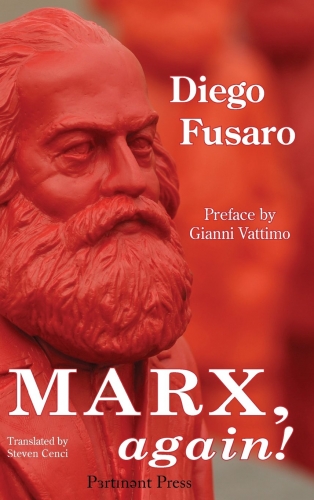 Par conséquent, la gauche, qui ne défend plus les idées de Gramsci et de Marx, mais qui défend directement le capital, du moins la plus grande partie de celui-ci, a besoin de maintenir l'antifascisme en vie pour se légitimer, afin que la contradiction ne soit pas visible et évidente ; c'est-à-dire que cette gauche veut dissimuler le fait pourtant patent que la gauche est restée antifasciste, alors que le fascisme n'existe plus mais n'est pas pour autant anticapitaliste, alors que le capitalisme progresse plus que jamais. Au contraire, les hommes de gauche utilisent l'antifascisme comme prétexte pour adhérer complètement au "fascisme" de la civilisation consumériste, à l'atout invisible de l'économie de marché. Je pense au cas français où la gauche forme un front antifasciste uni contre Le Pen pour accepter pleinement le "fascisme de marché" et l'élite financière cooptée par Rothschild, représentée par le libéral Macron.
Par conséquent, la gauche, qui ne défend plus les idées de Gramsci et de Marx, mais qui défend directement le capital, du moins la plus grande partie de celui-ci, a besoin de maintenir l'antifascisme en vie pour se légitimer, afin que la contradiction ne soit pas visible et évidente ; c'est-à-dire que cette gauche veut dissimuler le fait pourtant patent que la gauche est restée antifasciste, alors que le fascisme n'existe plus mais n'est pas pour autant anticapitaliste, alors que le capitalisme progresse plus que jamais. Au contraire, les hommes de gauche utilisent l'antifascisme comme prétexte pour adhérer complètement au "fascisme" de la civilisation consumériste, à l'atout invisible de l'économie de marché. Je pense au cas français où la gauche forme un front antifasciste uni contre Le Pen pour accepter pleinement le "fascisme de marché" et l'élite financière cooptée par Rothschild, représentée par le libéral Macron.
C'est le premier point fondamental. Si l'antifascisme était une question indispensable à l'époque de Gramsci, il devient aujourd'hui un alibi pour accepter le cosmopolitisme libéral, de sorte que le véritable antifascisme aujourd'hui est l'anticapitalisme radical de ceux qui n'ont pas encore vendu leur cœur et leur esprit au capitalisme dominant. Sur le deuxième point, il est clair, à mon avis, et je ne suis pas le seul à soutenir cette thèse - en Italie je pense, par exemple, à Costanzo Preve ou, plus récemment, à Carlo Formenti - que la lutte des classes aujourd'hui passe nécessairement par la récupération de la souveraineté nationale contre les dispositifs mondialistes du marché, et passe par ce que Formenti lui-même a appelé le "moment populiste".
En bref, le conflit de classes aujourd'hui est le conflit entre une classe cosmopolite liquide et financière d'une part, et les masses populaires nationales d'autre part, ces dernières subissant les effets de la mondialisation que je définis comme la "classe précaire", précaire non seulement dans le domaine du travail, par le biais du contrat de travail flexible et instable, mais aussi dans le monde de la vie, du Lebenswelt, dirait Husserl, car en fait les dominés d'aujourd'hui ne peuvent pas constituer une famille, avoir une stabilité existentielle ou participer activement à la politique en tant que citoyens de l'État souverain national.
Par conséquent, le conflit, aujourd'hui plus que jamais, est évidemment une lutte entre une "classe mondiale" cosmopolite, liquide et financière, qui est de droite - si l'on veut utiliser les anciennes catégories - dans l'économie, et de gauche dans la culture, et une masse populaire nationale souffrant de la mondialisation, constituée de la vieille classe moyenne précarisée et de la vieille classe ouvrière atomisée et réduite à des conditions précaires. La classe dominante est donc à droite dans l'économie et à gauche dans les coutumes et la culture. De droite sur le plan de l’économie parce qu'elle a assumé l'impératif libéral : privatisation, réduction des dépenses publiques, suppression des droits sociaux accordés jadis par l'Etat-providence. Tout cela se produit dans le cadre de la désobéralisation de l'économie. On dit que l'objectif de la "cession de souveraineté" est d'éviter les conflits, en réalité il s'agit de détruire les États nationaux souverains en tant qu'espaces de démocratie et de droits sociaux.
 Il n'y a pas d'autre réalité, dans la modernité, pour les droits sociaux et les démocraties en dehors des États souverains nationaux. C'est pourquoi l'expression de Che Guevara "la patrie ou la mort" a sa propre validité aujourd'hui encore, non seulement parce qu'elle revendique l'identité contre l'anonymat impersonnel des marchés, mais aussi parce qu'elle revendique l'idée de souveraineté nationale contre les processus de déracinement voulus par le capitalisme mondialiste. La classe dominante est de gauche en matière de coutumes et de culture parce qu'elle n'a pas fait sien l'impératif de la gauche anticapitaliste de Gramsci ou de Lénine, qu'elle a d'ailleurs répudié, mais a adopté celui de la gauche rose de 1968, qui identifie le communisme à la libéralisation individualiste de la consommation et des coutumes ; c'est-à-dire à la société de libre-service des consommateurs individuels qui ont toute la liberté qu'ils peuvent concrètement acheter et se sentir libres comme des atomes de Nietzsche, comme des surhommes avec une volonté de pouvoir illimitée, c'est-à-dire qu'ils conçoivent la liberté comme la propriété de l'individu déraciné par rapport aux communautés sédentaires qu’ils posent comme autoritaires : la communauté familiale, la communauté politique, la communauté religieuse.
Il n'y a pas d'autre réalité, dans la modernité, pour les droits sociaux et les démocraties en dehors des États souverains nationaux. C'est pourquoi l'expression de Che Guevara "la patrie ou la mort" a sa propre validité aujourd'hui encore, non seulement parce qu'elle revendique l'identité contre l'anonymat impersonnel des marchés, mais aussi parce qu'elle revendique l'idée de souveraineté nationale contre les processus de déracinement voulus par le capitalisme mondialiste. La classe dominante est de gauche en matière de coutumes et de culture parce qu'elle n'a pas fait sien l'impératif de la gauche anticapitaliste de Gramsci ou de Lénine, qu'elle a d'ailleurs répudié, mais a adopté celui de la gauche rose de 1968, qui identifie le communisme à la libéralisation individualiste de la consommation et des coutumes ; c'est-à-dire à la société de libre-service des consommateurs individuels qui ont toute la liberté qu'ils peuvent concrètement acheter et se sentir libres comme des atomes de Nietzsche, comme des surhommes avec une volonté de pouvoir illimitée, c'est-à-dire qu'ils conçoivent la liberté comme la propriété de l'individu déraciné par rapport aux communautés sédentaires qu’ils posent comme autoritaires : la communauté familiale, la communauté politique, la communauté religieuse.
C'est l'absurdité, la confusion, qui caractérise le monstre de la pensée unique dominante de l'élite capitaliste, contre laquelle, pour récupérer un discours de classe qui protège ceux d'en bas contre ceux d'en haut, le travail contre le capital, il est évidemment nécessaire de reprendre le contrôle de l'économie. C'est le thème du beau livre de Fazi et Mitchell Reclaiming the State, qui est sorti en italien sous le titre Sovranità o Barbarie [Souveraineté ou Barbarie]. Aujourd'hui, les classes dominées n'ont d'autre choix que de récupérer complètement la souveraineté nationale, économique, politique et géopolitique et de réintroduire des formes de lutte de classe dans les espaces de l'État souverain national, afin que le Serviteur et le Seigneur (ou l’Esclave et le Maître), selon les termes de Hegel, puissent à nouveau se regarder en face et que le conflit de classe, impossible à réaliser dans les espaces mondialisés, puisse être récupéré. Si nous voulons le dire autrement, l'État national souverain peut être démocratique et socialiste.
 Une économie sans politique et sans État ne sera jamais démocratique ou socialiste, elle sera toujours l'humus idéal pour le capital cosmopolite, qui est tout sauf socialiste et démocratique. D'où l'importance de ce que j'appelle le souverainisme internationaliste et populiste. Souveraineté parce que la souveraineté nationale est pleinement récupérée comme base des droits et des démocraties, du socialisme et des conquêtes sociales. Internationaliste parce que ce n'est pas le nationalisme de la droite réactionnaire, xénophobe et autoritaire, c'est une souveraineté internationaliste ouverte aux autres nations socialistes et démocratiques, elle crée un internationalisme prolétarien, comme on l'appelait autrefois, qui est à l'opposé du nationalisme individualiste et réactionnaire et du cosmopolitisme libéral auxquels la gauche rose a vendu sa tête et son cœur, comme je l'ai dit précédemment.
Une économie sans politique et sans État ne sera jamais démocratique ou socialiste, elle sera toujours l'humus idéal pour le capital cosmopolite, qui est tout sauf socialiste et démocratique. D'où l'importance de ce que j'appelle le souverainisme internationaliste et populiste. Souveraineté parce que la souveraineté nationale est pleinement récupérée comme base des droits et des démocraties, du socialisme et des conquêtes sociales. Internationaliste parce que ce n'est pas le nationalisme de la droite réactionnaire, xénophobe et autoritaire, c'est une souveraineté internationaliste ouverte aux autres nations socialistes et démocratiques, elle crée un internationalisme prolétarien, comme on l'appelait autrefois, qui est à l'opposé du nationalisme individualiste et réactionnaire et du cosmopolitisme libéral auxquels la gauche rose a vendu sa tête et son cœur, comme je l'ai dit précédemment.
C'est pourquoi il me semble important de récupérer le principe de la souveraineté internationaliste qui se fonde sur le populisme, compris comme une théorie du peuple et pour le peuple, comme une vision qui s'oppose aux processus de post-démocratisation administrés par les élites financières liquides et qui réaffirme le principe du national-populaisme, compris à la manière de Gramsci. Un populisme conçu non pas dans un sens régressif, c'est-à-dire, pour le dire clairement, dans un sens émancipateur, comme Laclau et Mouffe l'ont très bien écrit, un populisme de gauche, si l'on veut encore utiliser cette catégorie, un populisme dont le but est l'émancipation objective des classes dominées et qui est basé sur la démocratie socialiste. C'est le point fondamental qui apparaît également dans les œuvres de Carlo Formenti. Le paradoxe est que ce discours, qui en d'autres temps aurait été appelé léniniste, marxiste ou gramscien, aujourd'hui la gauche rose et arc-en-ciel le qualifie de fasciste.
C'est un paradoxe car je me réfère évidemment à Gramsci, à la démocratie socialiste, à la solidarité internationale, au slogan de Che Guevara "La patrie ou la mort", au modèle de solidarité souveraine et d'internationalisme, aux expériences bolivariennes en Amérique du Sud : àbnChávez au Venezuela, à Morales en Bolivie et à toutes les expériences de socialisme patriotique anti-américain et anti-mondialiste qui ne peuvent sans doute pas être qualifiées de fascistes. La catégorie du fascisme, de ce point de vue, nous introduit dans un paradoxe logique, aujourd'hui le fascisme est utilisé comme une catégorie complètement a-historique. Le fascisme n'est plus seulement et essentiellement celui de Mussolini, qui est mort en 1945. Aujourd'hui, nous comprenons le fascisme, je donne cette définition, comme tout ce qui n'est pas organiquement lié à la pensée unique politiquement correcte et éthiquement corrompue, plus précisément, le fascisme est, du point de vue du seigneur cosmopolite sans-frontiériste et de celui de la gauche colorée rose, fuchsia et en arc-en-ciel, tout ce qui s'oppose à la domination de la classe dominante, et je vous donne un exemple concret observé de nos jours. Aujourd'hui, l'une des thèses dominantes du seigneur cosmopolite est l'ouverture des ports et des frontières. Pourquoi ? Parce que le monde entier doit être réduit à un espace ouvert et déréglementé pour la libre circulation des biens et des personnes.
 Par conséquent, quiconque s'oppose à cette vision, revendiquant la primauté de l'humain et du politique, défendant la nécessité de réguler, réclamant la primauté du politique et de la démocratie sur les flux de capitaux, de personnes, de désirs, de consommation, est automatiquement calomnié comme fasciste par la gauche rose-fuchsia, pour qui tout ce qui ne se met pas au diapason avec le seigneur cosmopolite, dont ils sont les idiots utiles, est fasciste. Le paradoxe est le suivant, je le résume ainsi, cette gauche diffame tout ce qui s'oppose à l'ordre de la classe dominante sans-frontiériste, de la classe globocratique du capital, elle diffame comme fasciste l'idée de l'intervention de l'État dans l'économie, elle diffame comme fasciste le réveil des classes dominées, des opprimés qui, comme le disait Fichte, sont au-dessus de toute autorité qui prétend être supérieure.
Par conséquent, quiconque s'oppose à cette vision, revendiquant la primauté de l'humain et du politique, défendant la nécessité de réguler, réclamant la primauté du politique et de la démocratie sur les flux de capitaux, de personnes, de désirs, de consommation, est automatiquement calomnié comme fasciste par la gauche rose-fuchsia, pour qui tout ce qui ne se met pas au diapason avec le seigneur cosmopolite, dont ils sont les idiots utiles, est fasciste. Le paradoxe est le suivant, je le résume ainsi, cette gauche diffame tout ce qui s'oppose à l'ordre de la classe dominante sans-frontiériste, de la classe globocratique du capital, elle diffame comme fasciste l'idée de l'intervention de l'État dans l'économie, elle diffame comme fasciste le réveil des classes dominées, des opprimés qui, comme le disait Fichte, sont au-dessus de toute autorité qui prétend être supérieure.
Le peuple est souverain, la démocratie, après tout, est la souveraineté du peuple qui, pour s'exercer, a besoin d'un État souverain où le peuple est, à son tour, souverain ; sans souveraineté d'État, il ne peut y avoir de souveraineté d'État, de souveraineté populaire et, par suite, de démocratie. C'est précisément sur cette base que l'Union européenne se fonde, en éliminant la souveraineté des États afin d'anéantir la souveraineté populaire dans les États donc d'anéantir les démocraties et les droits sociaux qui y sont liés. Ainsi, l'antifascisme redevient la clé fondamentale des classes dominantes et des partisans de la gauche rose-fuchsia, afin de délégitimer toutes les propositions de renouvellement et de démocratisation de l'espace mondial.
Le paradoxe est qu'aujourd'hui, comme l'a dit Orwell, le rapport entre les mots et les choses est subverti, aujourd'hui la violence et la persécution de la libre pensée qui caractérisaient le fascisme réapparaissent sous le nom d'antifascisme, dans la figure sans précédent des brigades roses de l'antifascisme arc-en-ciel et des escadrons qui, au nom de l'antifascisme, attaquent, souvent non seulement de manière métaphorique, tous ceux qui n'adhèrent pas au seul verbe politiquement correct de la classe dirigeante.
Aujourd'hui, nous devons donc en prendre conscience et, évidemment, garder une distance de sécurité par rapport au fascisme historique, qui n'existe plus, et nous opposer au néolibéralisme cosmopolite, réellement existant et faussement progressiste d'aujourd'hui, auquel la gauche s'est lâchement adaptée en cultivant le paradoxe que nous avons décrit. Chaque fois que la gauche évoque « le retour du fascisme », elle crée un "front unique" qui légitimise le cosmopolitisme libéral ou, comme dirait Pasolini, le nouveau fascisme de la civilisation glamour des marchés.
00:56 Publié dans Actualité, Philosophie, Théorie politique | Lien permanent | Commentaires (0) | Tags : diego fusaro, gauche, gramscisme, marxisme, socialisme, philosophie, philosophie politique, italie, théorie politique, politologie, sciences politiques |  |
|  del.icio.us |
del.icio.us |  |
|  Digg |
Digg | ![]() Facebook
Facebook
samedi, 21 décembre 2019
John J. Mearsheimer, “The False Promise of Liberal Hegemony”
00:16 Publié dans Actualité, Géopolitique, Théorie politique | Lien permanent | Commentaires (0) | Tags : livre, john j. mearsheimer, libéralisme, gauche, états-unis, livre, politique internationale, géopolitique, théorie politique, politologie, sciences politiques, philosophie politique |  |
|  del.icio.us |
del.icio.us |  |
|  Digg |
Digg | ![]() Facebook
Facebook
vendredi, 12 avril 2019
Liberalism: the other God that failed
While Arthur Koestler was awaiting execution after being captured and sentenced to death by Francoist forces as a communist spy during the Spanish Civil War, he had a mystical experience. Formerly a Marxist materialist who believed the universe was governed by “physical laws and social determinants”, he glimpsed another reality. The world now seemed instead as “a text written in invisible ink”.
The experience left him untroubled by the prospect of his imminent death by firing squad. At the last moment, he was traded for a prisoner held by Republican forces. But the epiphany of another order of things that came to him in the prison cell stayed with him for the rest of his days, informing his great novel of communist faith and disillusion, Darkness at Noon (1940), his later writings on the history of science, and a lifelong interest in parapsychology.
 Koestler was a pivotal figure in the post-war generation that rejected communism as “the God that failed”— the title of a celebrated book of essays, edited by the Labour politician Richard Crossman and published in 1949, to which Koestler contributed. The ex-communists of this period followed a variety of political trajectories. André Gide, another contributor to the collection, abandoned communism, after a visit to the Soviet Union in 1936, to become a writer on issues of sexuality and personal authenticity.
Koestler was a pivotal figure in the post-war generation that rejected communism as “the God that failed”— the title of a celebrated book of essays, edited by the Labour politician Richard Crossman and published in 1949, to which Koestler contributed. The ex-communists of this period followed a variety of political trajectories. André Gide, another contributor to the collection, abandoned communism, after a visit to the Soviet Union in 1936, to become a writer on issues of sexuality and personal authenticity.
The rise of post-truth liberalism
Other ex-communists became social democrats, while a few became militant conservatives or lost interest in politics completely. Stephen Spender, poet and novelist and author of Forward from liberalism (1937), morphed into a cold-war liberal. James Burnham, a friend and disciple of Leon Trotsky, rejected Marxism in 1940 to reappear as a militant conservative, publishing The Suicide of the West: the meaning and destiny of liberalism (1964) and eventually being received into the Catholic Church. All of them became communists in a time when liberalism had failed. All were able to return to functioning liberal societies when they abandoned their communist faith.
When interwar Europe was overrun by fascism, the Soviet experiment seemed to these writers to be the best hope for the future. When the experiment failed, and they renounced communism, they were able to resume their life and work in a recognisably liberal civilisation.
Post-war global geopolitics may have been polarised, with a precarious nuclear stand-off between the Soviet Union and the US and its allies. Liberal societies may have been flawed, with McCarthyism and racial segregation stains on the values western societies claimed to promote. But liberal civilisation was not in crisis. Large communist movements may have existed in France, Italy and other European countries, while Maoism attracted sympathetic interest from alienated intellectuals. But even so, liberal values were sufficiently deep-rooted that in most western countries they could be taken for granted. The West was still home to a liberal way of life.
The situation is rather different today. Liberal freedoms have been eroded from within, and dissidents from a new liberal orthodoxy face exclusion from public institutions. This is not enforced by a totalitarian state, but by professional bodies, colleagues and ever vigilant internet guardians of virtue. In some ways, this soft totalitarianism is more invasive than that in the final years of the Soviet bloc.
How Thatcherism produced Corbynism
The values imposed under communism were internalised by few among those who were compelled to conform to them. Ordinary citizens and many communist functionaries were a bit like Marranos, the Iberian Jews forced to convert to Christianity in mediaeval and early modern times, who secretly practised their true religion for generations or centuries afterwards. Such fortitude requires rich inner resources and an idea of truth as something independent of subjective emotion and social convention. There are not many Marranos in the post-liberal west.
Some have attempted to revive classical liberalism, an anachronistic project that harks back to a time when western values could command a global hegemony. Others have opted for a hyperbolic version of liberalism in which western civilisation is denounced as being a vehicle for global repression.
In this alt-liberal ideology, the central values of classical liberalism — personal autonomy and the rejection of tradition in favour of critical reason — are radicalised and turned against the liberal way of life. A heretical cult, alt-liberalism is what liberalism becomes when it tears up its roots in Jewish and Christian religion. Today it is the ruling ideology in much of the academy and media.
In these conditions one might suspect self-censorship, since anyone expressing seriously heterodox views risks a rupture in their professional life. Yet it would be a mistake to think alt-liberals are mostly cynical conformists. Since practising cynics realise that the views they are publicly promoting are actually false, cynicism presupposes the capacity to recognise truth. In contrast, alt-liberals appear wholly sincere when they denounce the society that privileges and rewards them. Unlike the Marranos, whose public professions concealed another view of the world, alt-liberals conceal nothing. There is nothing in them to conceal. They are expressing the prevailing western orthodoxy, which identifies western civilization as being uniquely malignant.
Deluded liberals can't keep clinging to a dead idea
Of course, civilisational self-hatred is a singularly western conceit. Non-western countries — China, India and Russia, for example— are increasingly asserting themselves as civilisation-states. It is only western countries that denounce the civilisation they once represented. But not everything is as it seems. Even as they condemn it, alt-liberals are affirming the superiority of the West over other civilisations. Not only is the West uniquely destructive. It is only the West — or its most advanced section, the alt-liberal elite — that has the critical capacity to transcend itself. But to become what, exactly? Lying behind these intellectual contortions is an insoluble problem.
In his essay in The God that failed Gide wrote: “My faith in communism is like my faith in religion. It is a promise of salvation for mankind.” Here Gide acknowledged that communism was an atheist version of monotheism. But so is liberalism, and when Gide and others gave up faith in communism to become liberals, they were not renouncing the concepts and values that both ideologies had inherited from western religion. They continued to believe that history was a directional process in which humankind was advancing towards universal freedom.
Without this idea, liberal ideology cannot be coherently formulated. That liberal societies have existed, in some parts of the world over the past few centuries, is a fact established by empirical inquiry. That these societies embody the meaning of history is a confession of faith. However much its devotees may deny it, secular liberalism is an oxymoron.
A later generation of ex-communists confirms this conclusion. Trotskyists such as Irving Kristol and Christopher Hitchens who became neo-conservatives or hawkish liberals in the Eighties or Nineties did not relinquish their view of history as the march towards a universal system of government. They simply altered their view as to the nature of the destination.
You're reaping what you sowed, liberals
Instead of world communism, it was now global democracy. Western interventions in Afghanistan, Iraq and later Libya were wars of liberation backed by the momentum of history. The fiascos that ensued did not shake this belief. The liberalism of these ex-Trotskyists was yet another iteration of monotheistic faith.
Alt-liberals aim to deconstruct monotheism, along with the grand narratives it has inspired in secular thinkers. But what emerges from this process? Once every cultural tradition is demolished, nothing remains. In principle, alt-liberalism is an empty ideology. In practice it defines itself by negation.
Populist currents are advancing throughout the West and supply the necessary antagonist. The old liberalism that prized tolerance no longer survives as a living force. Iconoclasts who smash statues of colonial-era figures are raging at an enemy that has long since surrendered. An impish avatar of a vanished liberal hegemony, alt-liberalism needs populism if it is to survive.
Resistance to populist movements fills what would otherwise be an indeterminacy at the heart of the alt-liberal project. Privileged woke censors of reactionary thinking and incendiary street warriors are mutually reinforcing forces. At times, indeed, they are mirror-images of one another. Both have targeted the state of Israel as the quintessential embodiment of western evil, for example. Not only do alt-liberals and populists need one another. They share the same demonology.
Today's voguish communists should remember Budapest
Viewing the post-liberal West from a historical standpoint, one might conclude that it will suffer the same fate as communism. Facing advancing authoritarian powers and weakened from within, a liberal way of life must surely vanish from history. True, some traces will remain. Even in societies where denunciation for reactionary thinking is a pervasive practice, fossil-like fragments of ancient freedoms will be found scattered here and there. But surely the global liberal order will finally implode, leaving behind only defaced remnants of a civilisation that once existed.
In fact, any simple analogy between the fall of communism and the decay of liberalism is misleading. The difference is that old-style liberals have nowhere to go. To be sure, they could abandon any universalistic claim for their values and think of them as inhering in a particular form of life — one that is flawed, like every other, but still worthwhile.
Yet this is hardly a viable stance at the present time. For one thing, this way of life is under siege in what were once liberal societies. Yet liberals cannot help but see themselves as carriers of universal values. Otherwise, what would they be? Anxious relics of a foundering civilisation, seeking shelter from a world they no longer understand.
There may be no way forward for liberalism. But neither is the liberal West committing suicide. That requires the ability to form a clear intention, which the West shows no evidence of possessing. Nothing as dramatic or definitive will occur. Koestler and the ex-communists of his generation regarded communism as the God that failed because they once believed it to be the future. Today almost no one any longer expects liberal values to triumph throughout the world, but few are able to admit it — least of all to themselves. So instead they drift.
It is not hard to detect a hint of nostalgia among liberals for the rationalist dictatorships of the past. Soviet communism may have been totalitarian, but at least it was inspired by an Enlightenment ideology. Though it has killed far fewer people, Putin’s Russia is far more threatening to the progressive world-view.
China, on the other hand, is envied as much as it is feared. Its rulers have renounced communism, but in favour of a market economy, globalisation and a high-tech version of Bentham’s Panopticon — all of them imported western models. The liberal west may be on the way out, but illiberal western ideas still have a part in shaping the global scene.
When ex-communists became liberals, they shifted from one secular faith to another. Troubled liberals today have no such option. Fearful of the alternatives, they hang on desperately to a faith in which they no longer believe. Liberalism may be the other God that failed, but for liberals themselves their vision of the future is a deus absconditus, mocking and tormenting them as the old freedoms disappear from the world.
00:43 Publié dans Actualité, Philosophie, Théorie politique | Lien permanent | Commentaires (0) | Tags : libéralisme, libéralisme libertaire, gauche, gauche intellectuelle, idéologie, philosophie, théorie politique, politologie, sciences politique, philosophie politique |  |
|  del.icio.us |
del.icio.us |  |
|  Digg |
Digg | ![]() Facebook
Facebook
mardi, 26 mars 2019
Il est urgent de dépasser le clivage gauche-droite

Il est urgent de dépasser le clivage gauche-droite
Par Patrice-Hans Perrier
Ex: http://www.zejournal.mobi
Les grands médias alliés aux oligarques continuent de nous prendre pour des ânes en mettant en scène un combat simulé entre la gauche et la droite. Et, certains chroniqueurs en rajoutent en souhaitant que la jeunesse sorte de sa torpeur actuelle afin de reprendre goût à cette politique des apparences qui aura contribué à berner leurs parents. Parce que les clivages auxquels nous sommes habitués nous empêchent de poser les bons diagnostics sur les maux qui gangrènent nos sociétés.
Les patriotes qui se battent pour la survie de leur nation doivent éviter de tomber dans le piège des catégories politiques.
Une réalité qui dépasse les clivages politiques
Le politologue Arnaud Imatz, invité à débattre de la question sur le site de réflexion Le Cercle Aristote, estime que « la division Droite/Gauche est devenue un masque, qui sert à cacher une autre division, désormais beaucoup plus décisive : celle qui oppose les peuples enracinés aux élites autoproclamées vectrices du déracinement; celle qui oppose les défenseurs de la souveraineté, de l’identité et de la cohésion nationale aux partisans de la « gouvernance mondiale »; celle qui oppose les exclus de la mondialisation rejetés dans les zones périurbaines du pays […] aux privilégiés du système, à l’oligarchie dominante, à la classe dirigeante mondialisée ou l’hyperclasse qui vit dans les beaux quartiers des grandes villes […] ».
La droite et la gauche se renvoient la balle
En bref, les partisans de la gauche reprochent aux gens de droite d’être trop conservateurs, tout en refusant les inévitables changements qui sont le lot de nos sociétés en voie de liquéfaction. À droite, on refuse les schémas proposés par une gauche qui s’acharne à vouloir tout chambouler afin de favoriser l’émergence d’un « homme nouveau », sorte de citoyen d’une société éclatée où seuls les rapports économiques constituent l’étalon de mesure. La variable d’ajustement, pour parler comme certains économistes.
À gauche, on prône une plus grande justice sociale qui serait susceptible de se réaliser à travers le dépassement des habituels clivages socioculturels qui marquent le territoire de nos cités. Il n’y a plus de culture historique qui tienne pour ces partisans d’une lutte de classe qui se concentre sur une meilleure répartition des ressources économiques. Pourtant, on a qu’à gratter le vernis gauchiste plaqué sur ce type de formations politiques pour réaliser que leurs dirigeants ne sont que des arrivistes qui rament pour obtenir un strapontin bien au chaud au parlement.
La droite n’est pas en reste au chapitre des simulacres et ça fait des lustres que ses ténors ont jeté aux orties tout ce qui pouvait s’apparenter aux vertus d’un christianisme qui est devenu un triste simulacre. La droite est affairiste, elle émaille son discours de références patriotiques afin de faire passer la pilule d’un libre-marché à tous crins. Prônant un meilleur contrôle des mouvements humains aux frontières, elle ne dit plus rien quand vient le temps de s’opposer à toute cette flopée de traités de libre-échange destinée à paver la voie au grand capital apatride. Si elle reproche à la gauche d’imposer ses idées préconçues sur les campus universitaires, elle nous enfonce sa religion de l’argent-roi profondément dans la gorge.
Détruire l’État pour réaliser la dictature des marchés
On réalise que cette nouvelle droite, qualifiée maladroitement de libertarienne par certains, fantasme sur le projet de privatiser tous les actifs d’un État qui se voulait stratège à l’époque du général de Gaulle. Il n’y a pas à dire : on dirait que la gauche et la droite se lancent des défis truqués afin de distraire les électeurs pendant que les oligarques et les banquiers se préparent à liquider tous les actifs de nos nations affaiblies.
Le mondialisme à l’œuvre n’est pas un scénario idéaliste promu par une caste d’illuminés. Il s’agit, a contrario, d’un projet particulièrement bien ficelé, quelque chose d’effectif et de pragmatique. Ses architectes ont l’intention de faire éclater toutes les balises qui structuraient nos sociétés depuis des lustres. Rien ne doit s’opposer aux desseins du grand capital et l’humanité doit devenir une réserve de main-d’œuvre corvéable à merci. Et, c’est ce qui explique pourquoi il est si important de maintenir l’illusion d’un combat des idées opposant une gauche et une droite complètement inféodées aux diktats de l’hyperclasse aux commandes. Il est temps de passer à autre chose.
Un lien pertinent : Le Cercle Aristote
- Source : CARNETS D'UN PROMENEUR
00:43 Publié dans Actualité, Théorie politique | Lien permanent | Commentaires (0) | Tags : clivage gauche-droite, gauche, droite, politique, vie politique, théorie politique, politologie, sciences politiques, philosophie politique |  |
|  del.icio.us |
del.icio.us |  |
|  Digg |
Digg | ![]() Facebook
Facebook
lundi, 25 mars 2019
La gauche américaine et le piège identitaire

La gauche américaine et le piège identitaire
par Olivier Meuwly
Ex: https://www.letemps.ch
OPINION. L’auteur américain Mark Lilla prône une gauche réconciliée avec une citoyenneté qui aurait divorcé de ses démons identitaires et de son «narcissisme moralisant», explique l’historien Olivier Meuwly. Une leçon qui vaudrait aussi pour l’Europe.
La notion d’identité est traditionnellement accolée à la droite, surtout la plus extrême. Comme si l’identité ne renvoyait qu’à une ethnie ou une nation qu’il s’agirait de protéger contre une abrasive et universaliste modernité, hostile aux particularismes régionaux. Et si cette notion était plus complexe? Cette interrogation réside au cœur d’un essai du philosophe américain et homme de gauche Mark Lilla, récemment traduit en français*. L’auteur se demande ni plus ni moins, en s’adressant à ses amis membres du Parti démocrate, si la gauche ne se serait pas à son tour ménagé une politique identitaire, bien sûr antagonique à celle prévalant à droite, mais tout aussi mortifère, surtout pour ses propres intérêts. Son livre a été très mal reçu par ses amis politiques…
Mark Lilla estime que la gauche américaine, mais le constat vaut aussi pour l’Europe, a interprété l’individualisme des années 60 et 70 comme la matrice d’une politique orientée vers le moi, dans le prolongement du romantisme néoanarchiste en vogue à l’époque. Alors que la droite reaganienne dérivait vers un libéralisme «néo» vissé sur le profit, la gauche se serait représenté la société non comme un collectif, désormais dépassé, mais comme une juxtaposition de «moi» s’assemblant avec d’autres «moi» au gré de leurs similitudes, raciales, sexuelles, ou autres. Le monde de la gauche se serait ainsi transformé en un univers constitué de groupes partageant une identité dont la défense serait l’unique finalité. Tournant le dos à l’action politique, délégitimée dans le discours soixante-huitard, cette gauche aurait confié à la justice le soin de dresser des digues autour de ces identités pour mieux contourner les défaites enregistrées dans un champ politique de toute façon méprisé. Il est vrai que le système américain n’est pas avare d’opportunités en la matière…
Moralisme identitaire
Engluée dans cette quête identitaire génitrice d’un «politiquement correct» où le simple fait de ne pas adhérer pleinement à ses réquisitions est jugé amoral et donc condamnable, la gauche se réfugie dans l’anathème: l’identité de gauche n’aurait dès lors plus rien à envier à l’identité de droite récupérée par l’aile droite du Parti républicain, avec à la clé un repli identitaire d’obédience «populiste», voire cryptonationaliste.
La grande victime de ce virage identitaire serait l’idée même de citoyenneté que, devant le vide ainsi créé à gauche, la droite n’aurait, selon l’auteur, aucune peine à remplir de ses propres valeurs. Le citoyen s’étant ainsi effacé devant l’individu perçu à travers sa seule identité, le fossé se creuse entre le «nous», au bord de l’effondrement, et le «moi» triomphant. Piège d’autant plus pernicieux pour la gauche que l’individu se définit par des identités multiples que seule la conscience d’une appartenance collective aurait pu transcender. Or l’appartenance personnelle s’impose comme la seule référence, anesthésiant tout discours audible par l’ensemble des Américains.
Le citoyen s’étant effacé devant l’individu perçu à travers sa seule identité, le fossé se creuse entre le «nous», au bord de l’effondrement, et le «moi» triomphant
Mark Lilla s’abstient d’explorer toutes les raisons qui ont poussé la gauche à s’enliser dans ce moralisme identitaire à même de se retourner contre la légitime protection des minorités, mais survalorisant les marges au détriment de l’ensemble. L’égalitarisme ne mine-t-il pas les fondements de l’égalité? Il préfère ne pas aborder la question, douloureuse. Il aurait aussi pu évoquer l’exemple de l’islamo-gauchisme que l’Europe connaît bien et qui a été dénoncé par de nombreux auteurs, pas tous de droite.
Retrouver le bien commun
Mark Lilla ne manque néanmoins pas de courage et son plaidoyer pour une gauche réconciliée avec une citoyenneté qui aurait divorcé de ses démons identitaires, de ce «narcissisme moralisant» selon ses propres termes, mérite d’être analysé au-delà de sa seule famille politique. Car il ne dit pas qu’articuler un discours sur l’identité est mauvais en soi mais qu’au contraire la défense des identités, nécessaire, ne trouve sa justification ultime que dans la recherche du bien commun. Et ce bien commun se réalise dans le dialogue et le compromis, que Lilla reproche aux démocrates de son pays de négliger. Les social-démocraties européennes devraient être mieux outillées mais elles semblent elles aussi de plus en plus succomber à cet «identitarisme» malheureux.
Concentré sur les identités que la gauche a voulu prendre sous son aile mais sous lesquelles elle menace d’étouffer, l’auteur ne s’intéresse pas à l’identité nationale. Or la gauche peut-elle renouer avec cette citoyenneté réellement universelle sans réinventer un discours sur la nation et ses exigences minimales? Réciproquement, la droite doit réfléchir sur les façons de marier l’identité nationale avec les autres identités, expression de la liberté individuelle, pour ne pas s’illusionner d’une cohésion sociale «bricolée» par la seule grâce d’une nation magnifiée.
* La gauche identitaire. L’Amérique en miettes, Stock.
11:55 Publié dans Actualité, Livre, Livre, Théorie politique | Lien permanent | Commentaires (0) | Tags : gauche, gauche américaine, gauche identitaire, mark lilla, philosophie politique, théorie politique, politologie, sciences politiques, livre |  |
|  del.icio.us |
del.icio.us |  |
|  Digg |
Digg | ![]() Facebook
Facebook
mercredi, 13 février 2019
Historical Crossover Defines Changing Rules Of “Left” And “Right” Parties
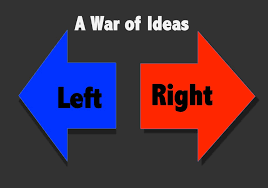
Historical Crossover Defines Changing Rules Of “Left” And “Right” Parties
Whenever an historical event of truly massive proportions not just manifests but reveals itself, the maneuvering begins. Existing interests do their best to position themselves to be the winning side of the arc of history in the small, and alignments change.
Our current age provides an example of such an event. A vast sea change has been underway for some time. The postwar order of world liberal democracy, seemingly the last man standing, has been in crisis since the 1980s, just one generation after the war ended.
Nonetheless it took time for the effects to become visible to more than those on the cutting edge. When your most intellectually sensitive citizens notice something, you are looking at the top one percent or less, and the rest will take years to figure it out.
When the war ended, it seemed that the world had finally united upon a common “System” that had outlasted all the others (think of the end of Willy Wonka And The Chocolate Factory). We thought great benefits would come from this kind of connectivity.
Then in turn when the Wall fell and the Soviet Union collapsed, we thought that our last opposition was gone, which allowed us to stop discriminating against our own home-grown versions of those ideas, like American and European socialism.
Europe, of course, had gone socialist in the years after the war because everyone was desperately poor and relied on the food trucks from government to survive since farms, businesses, and charities had all been demolished by the war.
This meant that by 1991 the world could unite on a “conservative” vision of the future that included both socialism and civil rights, despite those having origins in Leftist theory. Those Left-leaning ideas were substitutes for caste systems and natural rights, respectively.
Although its citizens were increasingly becoming miserable, this order moved ahead simply because nothing else could challenge it. Then only a decade later, it started to show signs of internal instability just as former third world powers rose to challenge it.
That shows us a fairly typical pattern which is that as soon as one system becomes dominant, it extends itself to its full logical conclusion, and at that point reveals its instability and begins to break down, encouraging others to challenge it.
Its inner doom came about through existential misery which was clear by the 1950s: on the surface, life was shiny, technology, safe, trustworthy, and new. Underneath, we saw the unfulfilled desires of humanity emerging in twisted ways.
Ours became a society of fetishes. Life under “capitalism” had become as regimented as life under “Communism”: you went to school, got some certs, then went to a job until you died. If you spoke out against the official dogma, you lost everything.
This quickly separated our political perspective into two groups: those who supported the status quo and therefore denied any serious problems with it, and those who saw the current state of things as moribund and destructive.
In this sense, the conservatives of today are acting out the role of the Leftists of yesterday by opposing established power and suggesting an alternate method. However, the conservative alternate is based on principle and history, not theory.
We have seen this kind of shift where the political “sides” changed roles before in American history:
One of them has to be the 1896 election, when the Democratic Party fused with the People’s Party, and the incumbent Grover Cleveland, a rather conservative Democrat, was displaced by the young and fiery William Jennings Bryan, whose rhetoric emphasized the importance of social justice in the priorities of the federal government. The next time the Democrats had a Congressional majority, with the start of Wilson’s presidency in 1913, they passed a raft of Bryanish legislation, including the income tax and the Federal Reserve Act. And the next Democratic president after that was FDR. So from Bryan onward, the Democratic Party looks much more like the modern Democratic Party than it does like the party of the 1870s.
Oddly though, during the first part of this period, i.e., the time of Bryan, the Republican Party does not immediately, in reaction, become the party of smaller government; there’s no do-si-do. Instead, for a couple of decades, both parties are promising an augmented federal government devoted in various ways to the cause of social justice. It’s not until the 1920s, and the era of Coolidge especially, that the Republican Party begins to sound like the modern Republican Party, rhetorically devoted to smaller government.
In other words, government captured one party and made it the advocate for more government. Bureaucracy expands to fill all space and resources available, and so as government became more powerful and centralized following the Civil War, it captured the party whose nature beliefs were closest to those required by big government.
The thing about government is that it needs a pretext. Per the idea of the social contract, government offers something to its citizens; if that needs to be more than mere stewardship of the existing natural and organic culture, government must offer a promise of something better, sort of like Utopia.
With Abraham Lincoln, America found a Soviet-style leader who would promise ideological purity and a quest toward Utopia through equality in exchange for greater control. No previous president had exercised as much authority as Lincoln did, nor had any attempted to make government as close to a European-style dictatorship as he did.
Bureaucracy thrives on impossible missions like “make everyone equal.” Since it cannot be done, they can never fail, only come back with more reasons why they need more money and more power in order to keep fighting the problem.
Inevitably, bureaucracy falls back on the idea of “progress,” or coming out of the natural state into a humanistic one where everything is better or, if we are honest, safer. The individual will be safe from the judgments of others when we achieve equality.
This type of ideological quest always causes a shift in polarities when one side gains control of government (or vice-versa!) and therefore, becomes a target of reformers and naysayers:
The world, he argues, is now split into two bitterly opposed camps: the New Conservatives and the New Radicals.
Their essential critique is that Britain’s establishment — in politics, in culture, in the public sector, in some big businesses — is decadent: that it continues to party while Rome burns; that it is pathologically self-absorbed; that it behaves as if the world owes it a favour, as if it deserves all of its privileges, as if the current order will go on forever even though it is clear that it is fast unravelling.
Our opponents are the New Conservatives, people who are:
…wedded to the status quo, who don’t really believe that there is much that is wrong with our society that a few tweaks cannot address. Until the Brexit referendum, such people generally thought we were moving in the right direction; today, they drift in a state of shock, stunned that progress, as they define it, isn’t inevitable, and that many want to upset the applecart.
These New Conservatives (which I think is where the name falls down slightly) still cleave to the Whiggish narrative of history as a process of continual improvement known as “progress”.
In this case, conservatives are naysayers. They do not promise a better future by affirmatively doing something, but by negatively doing something. If we remove big government and ideology, they argue, life will be better.
The populist crusade can be summarized in that simple statement. It wants to revoke the ideological mandate and massive bureaucracies of the postwar era, and possibly tear down government further until we reach the 1800s America of few rules and much opportunity.
That directly clashes with egalitarianism and the notion of progress. Egalitarianism says that our goal is to make everyone equal; nothing about peeling back the layers of government says that we are going to try to make anyone equal. Instead, we are rejecting equality entirely.
Our founding fathers did the same thing when they used the curious language “all men are created equal.” This does not mean that they are equal, or can be equal, but that the only equality which they are going to get is that they were all created. In other words, the Creator has a plan, each of us has a place, and in that place, we should be able to do what is appropriate for our role.
That entirely clashes with the 1860s and 1960s era Civil Rights acts which make government into an agency dedicated entirely to promoting and enforcing equality. In that government, everyone must treat everyone else equally or government will come destroy them.
At this point in time, we have to ask who the establishment really is. Trump answers this by calling them the “deep state” or “entrenched bureaucracy,” meaning those who are employed by big government and persist across administrations to enforce the mutual mission of equality.
However, the Right has defected from the notions of equality and progress. To it, progress consists of removing progress, and sticking with what works by keeping government at bay. This creates a flip in alignments.
Where the Left once saw government as the enemy and feared mainstream society, therefore argued that as a minority, it deserved “tolerance,” it now sees the government and mainstream as united against radicals who want to remove bureaucratic government and its ideology.
Conservatives, who have traditionally tried to conserve the best of the past and therefore always try to preserve institutions, including government, against the Leftist desire to tear them up, can no longer defend government. They want it gone.
Rebels are defined relative to what they rebel against, which means that they must be a weaker party assailing a stronger power. However, not all rebels are alike. Some promise Utopia, and others want to escape that quest for Utopia that destroys all civilizations.
Our current crop of rebels are anti-liberal, meaning that they reject egalitarianism and everything associated with making it work. Where conservatives were Leftist during the last century, in this century they have turned back toward conservatism.
That in turn has forced the Left to consolidate from the center through the extremes and, since it is now the majority, it has no idea of what it believes, and so the extremes win out because they are clearer than any other statement from the Left.
There are no new Conservatives and new Radicals. There is only Left and Right. The Left are egalitarians; the Right want order larger than the individual. Now, however, wanting anything other than Leftism is a rebellion against the established order.
You can find out where you stand easily. If you want equal rights as the basis of government, you are a Leftist; if you would prefer a hierarchical society with roles and privileges instead, and want government to protect that instead of changing it, you are on the Right.
This shows us the importance of understanding historical flips so that we can understand our current one. The parties have not changed views, only changed from offense to defense and vice-versa.
That in turn means that we can look at who is playing defense and see which ideology currently grips the world, and in turn, realize that this ideology is falling and will soon be replaced. The only progress is to un-do “progress.”
Tags: democrats, egalitarianism, flip, new conservatives, new radicals, progress, republicans, southern strategy, william jennings bryan
00:50 Publié dans Actualité, Histoire, Théorie politique | Lien permanent | Commentaires (0) | Tags : actualité, histoire, théorie politique, sciences politiques, politologie, philosophie politique, gauche, droite, bipolarité politique |  |
|  del.icio.us |
del.icio.us |  |
|  Digg |
Digg | ![]() Facebook
Facebook
jeudi, 09 août 2018
Le mouvement AUFSTEHEN de Sahra Wagenknecht fait polémique

Le mouvement AUFSTEHEN de Sahra Wagenknecht fait polémique: « l’ouverture des frontières désavantage les plus pauvres de nos concitoyens »
Sahra Wagenknecht, Présidente de la fraction LINKS (« La Gauche ») à la Diète fédérale allemande, vient de créer un nouveau mouvement rassembleur, AUFSTEHEN (Debout) ; elle entend proposer et imposer une nouvelle politique d’asile dans son parti et dans la société allemande. Dans un article rédigé spécialement pour la Nordwest-Zeitung d’Oldenbourg, elle a fustigé le « ressentiments » qui animerait les militants de l’AfD mais aussi et surtout, « cette morale générale qui entend promouvoir une culture de l’accueil sans frontières ». Elle écrit : « Une politique réaliste de gauche rejette ces deux exigences maximalistes ». Ce texte a été écrit en collaboration avec le dramaturge berlinois Bernd Stegemann, également membre du nouveau mouvement rassembleur.
Selon Wagenknecht et Stegemann, « les nombreux volontaires de la société civile qui s’occupent d’intégrer les réfugiés » devront recevoir toute l’aide nécessaire mais, par ailleurs, la gauche ne doit plus se laisser dicter sa conduite « par des bandes de passeurs criminels qui amènent des gens en Europe par des voies illégales ». Parce qu’elle a écrit cet article, et quelques autres de même teneur, Wagenknecht a essuyé de vives critiques dans les rangs de son propre parti.
On lui reproche notamment cette phrase : « Nous pensons que la fixation sur la thème des réfugiés est l’expression d’une colère qui s’est accumulée au fil du temps et provient de tous autres domaines de la vie quotidienne. Celui ou celle qui n’a plus que des contrats de travail à durée limitée, celui ou celle dont la retraite est trop chiche et dont les enfants ne peuvent plus recevoir une éducation scolaire décente parce que les écoles publiques vont à vau-l’eau et qu’il manque des professeurs, eh bien, tous ceux-là ont plein de raisons d’être furieux contre ‘ceux d’en haut’ ».
Dans un entretien accordé au Spiegel, elle s’est exprimée sans détour : « Les frontières ouvertes n’apportent que désavantages aux plus pauvres de nos concitoyens car ils n’auront jamais l’opportunité de s’en aller ailleurs. Nous combattons la pauvreté dans les pays en voie de développement mais cela n’est pas possible si nous importons en Europe leur classe moyenne ».
12:57 Publié dans Actualité, Affaires européennes, Politique | Lien permanent | Commentaires (0) | Tags : actualité, politique, politique allemande, affaires européennes, europe, allemagne, sahra waenknecht, aufstehen, die linke, gauche, gauche allemande, politique internationale |  |
|  del.icio.us |
del.icio.us |  |
|  Digg |
Digg | ![]() Facebook
Facebook
vendredi, 11 mai 2018
Das linke Schiff steuert nach rechts: Fünf Beispiele

Das linke Schiff steuert nach rechts: Fünf Beispiele
20:42 Publié dans Actualité, Affaires européennes | Lien permanent | Commentaires (0) | Tags : gauche, gauche allemande, allemagne, actualité, europe, affaires européennes |  |
|  del.icio.us |
del.icio.us |  |
|  Digg |
Digg | ![]() Facebook
Facebook
mardi, 19 décembre 2017
Sahra Wagenknecht ou l'art politique de suggérer des alternatives originales
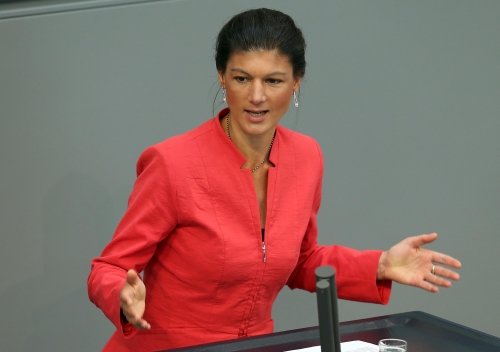
Alexander Schleyer :
Sahra Wagenknecht ou l’art politique de suggérer des alternatives originales
Dans le « Parti de Gauche » en Allemagne (la « Linkspartei ») la base gronde et grogne. Elle n’est plus vraiment seule : de nombreux élus refusent désormais d’obéir à la présidente du parti, Sahra Wagenknecht. Pourquoi ? Parce que cette femme de caractère formule des critiques serrées du statu quo et se montre adepte d’une Realpolitik bien adaptée aux réalités contemporaines. Du coup, la « Gauche » estime que sa propre présidente est trop à droite !
Sahra Wagenknecht est têtue : elle prend sans hésiter la liberté de dire haut et clair que tout le monde ne peut pas venir s’installer en Allemagne. Cette audace, elle est quasi seule à la partager. Les menées asociales des patrons de l’économie subissent ses critiques les plus vertes, de même que la valetaille politicienne qui est embourbée jusqu’au cou dans les intrigues des soi-disant « employeurs ». Elle a aussi l’outrecuidance de rejeter l’idée qu’un islam politique puisse s’implanter en Allemagne. A la différence de Merkel qui, au titre de secrétaire à la propagande, a toujours su exploiter le système à son profit, Sahra Wagenknecht ruait déjà dans les brancards au temps de la RDA communiste. Elle fit bien quelques tentatives pour rejoindre sa mère à l’Ouest mais sans succès : elle a vécu chez ses grands-parents dans les environs d’Iéna. Sa mère vivait et étudiait à Berlin et aurait bien voulu garder sa fille près d’elle mais la petite Sahra ne s’est adaptée à aucune école maternelle : elle était rebelle ; dans le jargon communiste de la RDA, elle était « incapable de comportement collectif » (« kollektivunfähig »).
 Sa scolarité a été marquée du même esprit de rétivité : elle était certes une élève très douée, qui obtenait les meilleures notes mais le régime ne lui a pas permis d’accéder à l’enseignement supérieur. Il a condamné la jeune fille rebelle à descendre de l’échelle sociale : elle a dû abandonner ses études et aller travailler comme secrétaire. Très vite, elle donne sa démission, vivote de petits boulots occasionnels, tout en restant une belle jeune femme aux allures altières.
Sa scolarité a été marquée du même esprit de rétivité : elle était certes une élève très douée, qui obtenait les meilleures notes mais le régime ne lui a pas permis d’accéder à l’enseignement supérieur. Il a condamné la jeune fille rebelle à descendre de l’échelle sociale : elle a dû abandonner ses études et aller travailler comme secrétaire. Très vite, elle donne sa démission, vivote de petits boulots occasionnels, tout en restant une belle jeune femme aux allures altières.
Elle adhère malgré tout à la SED (l’inamovible parti socialo-communiste au pouvoir) pendant l’été 1989, tout en conservant et son idéalisme et son individualisme. Rebelle sous le régime communiste, elle s’affiche communiste dans la République Fédérale néo-libérale. Jamais elle ne reniera son engagement de l’été 1989 : elle restera la dirigeante majeure de la dite « plateforme communiste ». Pourquoi ? La lâcheté de toujours vouloir « se distancer » est le propre des conventionnels sans épine dorsale et des conservateurs de salon qui, en bout de course, finissent par adopter tous les travers de leurs adversaires de gauche. Cette rébellion anti-communiste d’hier et cette fidélité au communisme aujourd’hui rendent justement le discours de Sahra Wagenknecht intéressant dans un paysage politique, uniquement composé désormais d’opportunistes et d’obséquieux. Sahra Wagenknecht est marxiste : elle défend donc une vision de la politique qui est collectiviste. Mais cela ne l’empêche pas de rester elle-même, la rebelle que personne ne parvient à dompter.
Elle a la langue acerbe et le ton tranchant, ce qui se remarque tout de suite quand elle est invitée sur les plateaux de télévision, notamment aux émissions du modérateur Markus Lanz. Wagenknecht y a exprimé sans fard son euroscepticisme. Lanz, qui est évidemment un conformiste, fut désarçonné et perdit les derniers lambeaux de sympathie qui lui restait auprès du public, surtout après sa dernière question, dépourvue de pertinence, où il demandait combien gagnait Sahra Wagenknecht.
Dans la question des réfugiés, Sahra Wagenknecht campe résolument sur ses positions, même après deux séances houleuses de sa fraction au parlement allemand. Elle a gardé le cap, n’a édulcoré que quelques détails de son discours, où elle avait notamment déclaré : « Juridiquement parlant, le terme ‘droit d’hôte’ (‘Gastrecht’) n’est certainement pas correct ». « Mais la grande majorité le ressent ainsi ». Cette citation ne vise pas les demandeurs d’asile mais ceux qui demandent simplement une protection (provisoire) au nom de la convention de Genève sur les réfugiés. Leur renvoi, que réclame Wagenknecht, est bel et bien inscrit dans le droit en vigueur, prévu depuis toujours. « Le gouvernement n’est pas maître de la situation », a-t-elle répété sans cesse pour fustiger les résultats de la crise provoquée par l’afflux massif de réfugiés en Allemagne. Jamais elle n’a épargné Merkel, personnification du scandale qui ébranle aujourd’hui la société allemande de fond en comble : « Elle a toujours cru que sa fonction consistait à reconnaître pleinement la souveraineté américaine en Allemagne et à l’accepter sans broncher, ce qui signifie, que cette souveraineté étrangère doit être reconnue comme telle et cela, à jamais », a déclaré Sahra Wagenknecht lors d’un entretien accordé à « Russia Today ».
Tout naturellement, son esprit de rébellion et son hostilité à la domination américaine l’ont amenée à considérer que la seule piste pour sortir la Syrie de la crise était d’amorcer « une coopération plus étroite avec la Russie et de ne plus jouer la seule carte de la confrontation ». Pour assurer la paix au monde, il faut « dissoudre l’OTAN et la remplacer par un système de sécurité collective, qui puisse inclure la Russie ». Dans le cadre de l’Allemagne actuelle, l’idéal d’accueil de la chancelière Merkel, qui est évidemment aberrant, a eu pour résultat de créer dans le pays des problèmes insolubles en matière d’intégration. « C’est un problème aux dimensions gigantesques qui jette le doute dans l’esprit des Allemands et rencontre leur désapprobation profonde ».
Ce qui frappe le plus les observateurs de l’histoire politique allemande depuis les années 1950, c’est que cette femme combattive est tout à la fois l’une des dernières à défendre la RDA et son système social et l’une des dernières admiratrices du Chancelier Ludwig Erhard qui avait fait de la République de Bonn un Etat social bien plus acceptable (même pour une communiste !) que la nouvelle République de Berlin, percluse de néolibéralisme asocial. Ce n’est donc pas un hasard si Sahra Wagenknecht s’est toujours portée candidate sur les listes de gauche en Rhénanie du Nord/Westphalie : elle est bien l’avocate des perdants de la réunification à l’Ouest et non celle des anciennes élites de l’Est.
Alexander Schleyer.
(article paru dans « zur Zeit », Vienne, n°49/2017, http://www.zurzeit.at ).
16:49 Publié dans Actualité, Affaires européennes, Politique | Lien permanent | Commentaires (0) | Tags : sahra wagenknecht, gauche, allemagne, politique, europe, affaires européennes |  |
|  del.icio.us |
del.icio.us |  |
|  Digg |
Digg | ![]() Facebook
Facebook
lundi, 16 octobre 2017
Unintended Consequences: How the Left Keeps Helping Us

Unintended Consequences:
How the Left Keeps Helping Us
Ex: http://www.counter-currents.com
Everything is going exactly according to plan. This is what super-villains always say, usually just before their plans are upset. (“Seize him, you fools! He’s getting away!”) So, I am may be tempting fate by saying such a thing, but actually I don’t think so. As of late it really does seem like something — Providence, the Invisible Hand, the Cunning of Reason, or what have you — has been at work behind the scenes, helping our cause. In truth, we don’t have a plan, but events are unfolding as if someone does, and as if that someone is smiling upon us (perhaps from atop his perch in Asgard).
None of this should be particularly surprising. After all, we have the truth on our side. And the truth is reality. No individual and no civilization can exist for long in revolt against reality. Reality always finds a way to thwart our denial and our delusions, and to call attention to itself over and over again — until finally we are compelled to listen. Aristotle said that “truth seems to be like the proverbial door, which no one can fail to hit.” Actually, truth is like the proverbial Mack truck which cannot fail to hit us, if we try denying it for very long.

Now, an important part of how this Providence/Cunning of Reason stuff works is that if there is a truth that needs to come out, or a major societal shift that needs to take place, whatever human actors do will tend to advance this. In other words, once we reach a certain set of conditions where the denial of truth is no longer viable, and the truth is just aching to get out, even those who oppose this process will wind up helping it along. Their actions, in short, have unintended consequences. We now see this playing out in a big way in how the Left is conducting itself, especially in its attempts to oppose us. Some of the ways this is happening are obvious, and have been commented on before; others are not so obvious.
The Left thinks it has scored some recent victories by “infiltrating” our private gatherings and reporting on them. This includes the London Forum and the Counter-Currents-sponsored Northwest Forum. As Greg Johnson has already pointed out, all these infiltrators succeeded in doing was proving that we say the same things in private that we do in public. (The claims of Leftists that we’ve been “exposed” are therefore especially comical.) Aside from this, what we are quoted as saying will probably attract more people than it will repulse. Of course, Leftists are constitutionally incapable of perceiving this. They think that our ideas are so self-evidently evil all they have to do is lay them bare. But to almost everyone who isn’t a committed Left-wing ideologue, at least some of our ideas seem . . . well . . . true.

For example, Greg Johnson was secretly recorded at the London Forum quoting someone saying that “while the survivors [of the Manchester Islamic terrorist attack] were still picking bloody bits of children from their hair, Britain’s leaders were rushing toward the nearest camera to profess their undying commitment to diversity.” This is actually an extraordinarily powerful observation, which would stir many people at least to say “you know, he’s got a point.” But, of course, Leftists cannot see this: they broadcast the comment to all the world, thinking it would be summarily rejected by all right-thinking people. Umm, not quite. Thank you, Leftists! If you had but one face I would kiss it (and then get a shot of penicillin).
But this infiltration has the potential to birth an even more important, and less obvious, unintended consequence (and this one is real Cunning of Reason stuff). After the infiltration of the Northwest Forum, the organizers have now decided to make these events public. Our movement already has annual or semi-annual conferences, such as AmRen and NPI. However, the vast majority of events are private, invitation-only affairs which rely on secrecy: vetting (sometimes none-too-successful-vetting, it seems), announcing the location at the last minute, etc. These infiltrations teach us that the way forward may be to end this practice, and make many of our events open to the public. This would make us more visible — more of a regular part of the social and political landscape.
The unintended consequence of Leftist infiltration would therefore be one that Leftists desperately want to avoid: our “normalization.” Publicly-held, New Right events would simply become a “regular thing.” Going (more) public would also require many participants in our events to face a tough choice. They would have to ask themselves whether they are willing to take the risk of being seen at a public event, or forgo attending altogether. More and more of our hitherto reclusive comrades, I believe, have reached a point where they are willing to say “fuck it” and show up anyway, regardless of the consequences. And as more of these public events begin popping up, and more people show up (if only out of curiosity) it will be harder and harder to penalize attendees in some fashion or other. Again, thanks Leftists.

To cite one specific case, Greg Johnson has hitherto been famously camera shy, due to his desire to follow the advice of Socrates and maintain as much as possible “a private life.” But Greg’s recent video exposure has forced him to confront the fact that maintaining a private life is now pretty much a lost cause — the Left (as well as some douchebags on “our side”) won’t allow it. And that’s very good for us. Greg has the best mind in the American New Right scene. Abandoning his former reclusiveness means that we will be seeing more of him: more public lectures and conference appearances, and possibly YouTube videos. Ironically, in “exposing” Greg the Left has . . . well . . . increased his exposure; it has freed him (or perhaps I should say “unleashed” him). This isn’t what the Left wanted — but, again, ideology has made them too stupid to see that they are cooperating in undermining themselves.
Then there are the growing number of “hit pieces” that have been published in recent months, targeting prominent members of our movement. These are stuffed to the gills with unintended consequences. As everyone knows by now, Mike Enoch was the subject of a recent exposé in The New Yorker. One gets the impression that the author probably tried hard to make Mike look bad — but, predictably, the article has the unintended consequence, to any unbiased reader, of making him look like rather a swell fellow. As one of my (very objective) correspondents put it: “One gets the impression that Enoch really is seeking for truth. There are also details like him taking care of his handicapped mischling brother, that make him look rather nice and caring. Also, he does not say anything bad about his (I assume soon-to-be-ex)-wife, which is usually the case with any divorce. In fact, his attachment to her comes through strongly. The overall picture is rather complex and a far cry from the usual villain caricatures.”
An even better example of the unintended consequences of Leftist exposés is the profile of the German Götz Kubitschek which appeared just before the Enoch piece in The New York Times. This is, without question, the most fair and objective article I think I have ever seen on a Right-wing figure. But I suspect that the (presumably Left-wing) reporter simply allows Kubitschek to speak for himself because he thinks that, again, our ideas are so self-evidently evil all one need do is report them accurately. This backfires in a very, very big way. Not only does Herr Kubitschek seem sweetly reasonable, we learn that he has seven children and a farm full of lovingly-tended goats and bunny rabbits. At one point, he absents himself from the interview to go and heal an ailing baby goat. The only way this could have been better for us is if Kubitschek had been depicted curing lepers or miracling bread into existence. Once again, the Left takes careful aim at its own foot and opens fire.

Götz Kubitschek milks goat
Mention must also be made of the Left’s attempts to censor us, de-platform us, ruin our lives and careers, etc. (I have already written an essay about how to deal with these dangers on a day-to-day basis.) Every time this happens — if it gets some exposure — the Left comes off looking more and more desperate, hateful, and intolerant. A reversal is taking place very, very quickly: the Left is positioning itself as the defensive, tyrannical Establishment, and simultaneously positioning us as the rebels, the true “liberal” advocates of freedom of thought, and as the new counter-culture. Thanks! Sensible, average people cannot help but see the hateful, censorious behavior of the Left as the last gasp of a dying ideology. In other words, at some level of their awareness they see this behavior and think “What’s wrong with these people? What are they trying to hide? What are they trying to compensate for?” This is not the behavior of people confident in the truth of their views — it is the behavior of cornered rats; of criminal types who know the jig is up; of moochers who’ve realized the free lunch is over with.
Needless to say, this also applies to the violence of the Left, especially when it is perpetrated by Antifa and Black Lives Matter. Decent, average folks deeply disapprove of lawlessness, and of violence used as a tool of oppression, especially when it is directed at the underdog (this is very deeply set in the American character). Thus, Trump very wisely appealed, as did Nixon in 1968, to “law and order.” This is very probably a major part of why he won. Since the election, of course, the Left has continued to oblige us by amping up the violence. In general, as has been pointed out by many, the general bat-shit-crazy antics of the Left since the election of Donald Trump have only been helping us. More and more people are fed up with Leftism, and getting more bold about saying so.

And we must add to this the fact that, in addition to violence and mischief of all sorts, the Left seems completely clueless about the fact that Americans in vast numbers have repudiated their policies — every one of which has been a disaster for the country, and for the electoral prospects of liberals. Just the other day the liberal-controlled Boy Scouts of America announced that it will accept girls, presumably including girls who think they are boys. But this is just an extension of the “gender madness” that seriously harmed Democrats in the last election. Now California seems poised to pass a law criminalizing the use of the wrong pronouns when dealing with “transgender” people (while simultaneously making it no longer a felony to deliberately infect someone with HIV).
It’s really like Leftists just can’t help themselves. And, indeed, they can’t. They are committed to a life-denying morality that, taken to its logical conclusion, destroys families, communities, and all the basic institutions of civilization. That includes liberal families, communities, and institutions. And the moral fanaticism of the Left requires them to carry their ideas to their logical conclusion — to the extreme. What we are seeing is the Left beginning to eat itself, in a dialectic that spells their doom. The Left cannot abandon the ideology in which it has invested so much — the ideology through which its overly-socialized adherents find their self-worth; the ideology through which its base of slave-types and defective oddballs seeks to revenge itself upon the strong and the healthy. The Left will only continue to double-down and become more insane, more extreme. And the result will be that it will destroy itself, and probably quicker than any of us think. It seems right on course to do this, and the signs are everywhere. We can help this along through our activities, but really the Left is doing all the heavy lifting for us.
Three cheers for unintended consequences!
This just in: An appearance by Martin Sellner and Martin Lichtmesz at the Frankfurt Book Fair made international news when they were accosted by Antifa. Result: 3,000 copies of Lichtmesz’s new book have sold! Thank you again, Leftists. We owe you so much!

15:51 Publié dans Actualité, Nouvelle Droite | Lien permanent | Commentaires (0) | Tags : actualité, allemagne, états-unis, gauche, antifa, götz kubitschek, nouvelle droite, nouvelle droite allemande, neue rechte |  |
|  del.icio.us |
del.icio.us |  |
|  Digg |
Digg | ![]() Facebook
Facebook
vendredi, 06 octobre 2017
Jean-Claude Michéa: Between Capital & Archaic Socialism

Jean-Claude Michéa: Between Capital & Archaic Socialism
By Michael WalkerAudio version: To listen in a player, click here [2]. To download the mp3, right-click here [2] and choose “save link as” or “save target as.” To subscribe to the CC podcast RSS feed, click here [3].
 Jean-Claude Michéa
Jean-Claude Michéa
Notre Ennemi, le Capital
Paris: Climats, 2016
Following the election of Donald Trump as the forty-fifth President of the United States, there was a flood of YouTube clips of Clinton supporters, mostly female, throwing tantrums of biblical proportions (the reader will know the sort of thing: he rent his garments and covered himself with sackcloth, etc.) which afforded this writer both amusement and bewilderment. The tearful outbursts of grief were without insight or intelligence of any kind, with one exception.
The exception was a young lady who, after assuring her viewers that she had “stopped crying about it,” turned her wrath on Hillary Clinton. Hillary, it seemed, had enabled “a fascist” to become President, and thereafter unfolded an attack on Clinton from one of the disappointed YouTube amazons, the first of its kind which indicated that a functioning human mind was at work. “We told you,” the lady wailed, “we warned you” (who she meant by “we” was unclear – Bernie supporters, perhaps?) “but you would not listen. We told you: don’t ignore the working man. Don’t ignore the rust belt . . . Hillary Clinton, we overlooked a lot, we overlooked the corruption, we overlooked your links to Goldman Sachs. We warned you. Hilary Clinton, oh, we kept warning you and you wouldn’t listen. You were so sure, so damn arrogant. I’m through with you. You ignored the working man. You ignored the rust belt. Now we’ve got this and it’s your fault! It’s your fault!” Amidst the wailing and petulance, this Clinton voter had made a telling point. Donald Trump won because he had not ignored the rust belt, and his opponent had.
The two seismic upsets of 2016, Brexit and the election of Donald Trump, confounding both polls and media expectations, would not have come about without the common man, the rust belt, the blue-collar worker, Joe Sixpack, slipping harness and voting with “the Right.” Those who had faithfully and reliably followed the Democrat/Labour parties through one election after another, as their parents had done, and in many cases their parents’ parents, voted in opposition to the way the urban professional class voted. These events highlighted the distance between the wealthy liberal elites deciding what constituted progressive and liberal politics, and the political priorities of the indigenous low-paid classes.
The gulf between wealthy urban liberals and an ignored, socially conservative working class is the focus of a new and impassioned political essay by the French sociologist Jean-Claude Michéa called Notre Ennemi, le Capital (Our Enemy: Capital). Jean-Claude Michéa is a socialist, but his analysis of recent events is far from that of the establishment Left-wing’s alarm at the “worrying rise of populism.” His critique of the Left – he does not call himself a Left-winger and indeed makes a critical distinction between Left-wing and socialist – is the hardest a socialist could make, namely that it has abandoned a realistic or meaningful critique of capitalism. “The modern Left,” Michéa claims, “has abandoned any kind of coherent critique of capital.”
The title of Michéa’s book might arguably be Our Enemy: Liberalism, since it is against the liberalism of the affluent that his ire is directed. The word liberal has slightly different connotations in France and the Anglophone world. In France, liberalism is primarily the ideology of faith in free markets with minimal state interference, “those who lose deserve to lose, those who win deserve to win”; and secondly, the expression of an ideology of individual freedom from social constraint. Michéa distinguishes two radically different trends at the heart of socialist/emancipatory movements in history. “In fact, socialism and the Left draw on, and have done from their very beginnings, two logically distinct narratives which only in part overlap.” (p. 47) Put simply, one is the doctrine which seeks the emancipation of the working class, that is to say, the de-alienation of all who work in society, a society organized from the bottom up and based in the organic community, while the other is the Left-wing notion of progress, the ongoing struggle to free individuals from social restraint or responsibility, for minority rights and abstract issues in the name of progress, a demand from the top down. This latter kind of progressive politics, according to Michéa, is not only not opposed to global capitalism, it undermines the very kind of social solidarity which should be expected to oppose global capitalist growth.
Michéa understands the liberal element of parties of progress as being fundamentally anti-democratic, echoing here the distinction made by the French thinker, Alain de Benoist, between democracy and liberalism. Liberalism, obsessed with minorities and what another socialist, George Galloway, famously mocked as “liberal hothouse” issues, is not in principle opposed to the centralization of economic power at all, according to Michéa. Quite the contrary. It is, however, opposed to democracy, that is to say to any entitlement giving a role in the allocation of power to the majority of the people and of any entitlement to a nation to decide its own destiny. In short, liberalism extends economic sovereignty at the expense of political sovereignty.
Michéa’s argument is given credence by the actions of the leaders of the European Union, who are as enthusiastic about deregulating trade as they are unenthusiastic about allowing popular democratic decisions to be made about trade. Liberalism, according to Michéa, is a belief system operating in the cause of capital which supports a minority to oppress a majority. He notes that the very authoritarian and viscerally anti-socialist General Pinochet in Chile pursued an extremely liberal economic policy based on the free market ideas of Friedrich Hayek, who did not much care about democratic liberties so long as rulers got the economy right and followed the economic precepts of Milton Friedman, whose pupils were advisers to the government. Michéa quotes Jean-Claude Juncker (from Le Figaro, January 29, 2015) as stating that “there could be no democratic choice against the European treaties.”
The stream of venom from the rich kids of Britain which erupted, and has not ceased, since June 23, 2016 (the day the EU referendum result was announced) is another casebook example of the liberal loathing of democracy. Liberal outrage is directed at the very notion that major political or economic decisions should be made by a majority of the people, instead of by a minority of wealthy experts, in the first place. A piece that is exemplary in its anti-democratic virulence was penned by the author Julian Barnes and published in the London Review of Books (“People Will Hate Us Again [4]“) in the aftermath of the referendum result in which he described how he and his affluent London dinner-party friends discussed whom they despised most among those who were responsible for the result. (Nearly all remainers were against having a referendum at all.) Barnes’ choice alighted on Nigel Farage. Here is a taste of Julian Barnes:
Farage . . . had been poisoning the well for years, with his fake man-in-pub chaff, his white paranoia and low-to-mid-level racism (isn’t it hard to hear English spoken on a train nowadays?). But of course Nigel can’t really be a racist, can he, because he’s got a German wife? (Except that she’s now chucked him out for the Usual Reasons.) Without Farage’s covert and overt endorsement, the smothered bonfire of xenophobia would not have burst into open flame on 23 June.
 Here is what can be understood as a socialist (in Michéa’s sense of the word) comment by the Filipino writer Karlo Mikhail, discussing Barnes’ novel Flaubert’s Parrot on his blog [5]:
Here is what can be understood as a socialist (in Michéa’s sense of the word) comment by the Filipino writer Karlo Mikhail, discussing Barnes’ novel Flaubert’s Parrot on his blog [5]:
That novels like this have sprouted everywhere like mushrooms in recent decades is expressive of a particular socio-political condition. The persistence of a world capitalist system that prioritizes individual profit over collective need goes side by side with the elevation of a hedonistic bourgeois writer to the pedestal as the bearer of individual creativity and artistic beauty.
Interestingly, Jean-Claude Michéa picks out the very same French writer, Gustave Flaubert, as an example of an early liberal’s obsession with minorities (in Flaubert’s case, with gypsies) – a love of minority rights accompanied by disdain for collective identities and aspirations as well as the working classes. Then and now, the liberal does not greatly care for your average Joe, at least not if Joe’s face is white. As Aymeric Patricot wrote in Les Petits Blancs (Little Whites), “They are too poor to interest the Right and too white to interest the Left.”
Michéa appeals to the notion highlighted by George Orwell (whom he greatly admires) of common decency, morality, and social responsibility. But liberalism, notes Michéa, has become the philosophy of skepticism and generalized deconstruction. There is all the difference in the world between a socialism of ordinary folk and a socialism of intellectuals, the latter being nothing more than a championing of causes by a deconstructivist elite. Liberalism is the philosophy of “indifferentiation anchored in the movement of the uniformity of the market” (p. 133). It is a central thesis of the book that liberalism creates individuation in human societies so that the individual is increasingly isolated and social cohesion declines, while paradoxically and running parallel to this development, the economic structures of the world become increasingly uniform, dominated by the power of capital and concentrated in the hands of an increasingly wealthy few.
Michéa stresses that liberalism then becomes obsessed by phobias. A “phobia,” once coined by the National Socialists in occupied Europe to describe the members of the French and Serb resistance movements, he notes wryly, has been recently reappropriated, presumably unknowingly, by opponents of Brexit to describe Brexiters, namely: “europhobe.” Michéa gives a sad but well-known example of the stultifying effects of the “phobia” label: the Rotherham scandal, which erupted in 2014 after the publication of the Jay Report. The report revealed that, from 1997 to 2013, over a thousand girls between ages 11 and 16 had been kidnapped or inveigled by Pakistani gangs to go with them, who were then abused, drugged, plied with alcohol, raped, and in some cases even tortured and forced into prostitution. The town council did nothing about it for over a decade, in spite of being informed about the situation, out of fear of being found guilty of one of the liberal phobias (in this case, “Islamophobia”). For Michéa, this is an example of “common decency” being sacrificed to a liberal prejudice. The protection of the young was seen as less important than risking the allegation of “Islamophobia.” Michéa then quotes Jean-Louis Harouel: the rights of man took precedence over the rights of people.
It is the often-concealed reality of the power of capital which constitutes the fraud of liberal progressive politics, for liberalism as an ideology is increasingly understood as an ideology of the well-to-do. The notion of social justice has shifted from the belief in fair pay and fair opportunities towards hothouse issues which serve to undermine social solidarity. So it is that feminists at the BBC are more concerned about equality of pay between high-earning male and female media executives than a fairer deal for the poor, whether male or female, in society as a whole. This feminist focus on highly-paid women was also evident in Hillary Clinton’s campaign. The Democratic Party seemed more concerned that women in top jobs should receive the same pay as men in comparable jobs than in wishing in any way to close the gap between America’s wealthy and poor. For poor Democrat families living on $1,500 a month, the “glass ceiling’” debate and the “solidarity of sisters” must have seemed very remote from their daily concerns.
For Michéa, all this is no coincidence, since progressive politics, as he sees it, has become a contributory force to the intensification of the power of capital and a vehicle of social disintegration, serving to reinforce the ever-greater concentration of capital in the hands of the few. All prejudices are combated except one: the prejudice of fiscal power. That is to say, nobody should face any barrier other than the barrier of money; and nobody should be excluded from any club, from buying any house, from doing anything he or she wants to do, so long as they have the financial means to do it. If they do not have the financial means to join the club, then their entitlement is withdrawn. Money is everything.
 Michéa, like Marx, believes that development by internationalist capitalism acts as a centrifuge to separate the two extremes of those who possess capital from those who do not. Modern society offers increasingly fewer loyalties other than loyalty to the principle of individual competition in a free market. This is why all group adhesion and group loyalty, whether ethnic or geographic or of social class, is undermined or openly attacked by the proponents of progress. In the tradition of socialist conservatives going back to George Orwell, Michéa sees the simplification of language, the dumbing-down of society, and the failure of modern education as part of a pattern.
Michéa, like Marx, believes that development by internationalist capitalism acts as a centrifuge to separate the two extremes of those who possess capital from those who do not. Modern society offers increasingly fewer loyalties other than loyalty to the principle of individual competition in a free market. This is why all group adhesion and group loyalty, whether ethnic or geographic or of social class, is undermined or openly attacked by the proponents of progress. In the tradition of socialist conservatives going back to George Orwell, Michéa sees the simplification of language, the dumbing-down of society, and the failure of modern education as part of a pattern.
An example of this centrifugal tendency as practiced by the European Union is the new guidelines issued by the Central European Bank to national banks, which state that mortgage loans should only be granted to those who can prove that they will be able to service the debt in its entirety within the span of their working life. This astonishing provision, which has received little publicity, is purportedly a measure to prevent a repetition of the American mortgage crisis of 2008, but if Michéa is correct, it is more likely a measure aimed at depriving the working and middle classes of the opportunity to become property owners. It will effectively accelerate the widely-noted tendency in Europe to reduce the power of the middle class, which is being driven upwards or downwards towards the minority of haves or the majority of have-nots. It used to be a Marxist axiom that the middle classes would turn to fascism if deprived of their livelihoods by capitalism, as an alternative to joining the ranks of the dispossessed. Michéa does not directly reiterate this Marxist analysis but he certainly implies it; he has obviously read Marx, and if he is not a Marxist (he leans more toward the writings of Pierre-Joseph Proudhon, the anarchist/socialist critic of Marx), he certainly owes a debt to the social-psychological analyses of the author of Das Kapital.
The capitalist system, to which even the Right-wing critiques of immigration are wed, necessarily strives towards growth, profit, greater efficiency, and expanding markets. All this means an ever-increasing globalization of business. There is an underlying contradiction between on the one hand an appeal to a conservative electorate fearful of job losses and distrustful of immigration, and a pursuit of growth and free trade to maximize profits on the other. Michéa identifies, rightly I believe, mass immigration as a phenomenon backed by the capitalist ruling order to ensure that full employment is never achieved, for the fear of unemployment is the best way to keep wages down. In this respect, pro-immigration anti-fascists act as security guards for high finance, terrorizing any opposition to cheap labor immigration. The contradiction between an appeal to job security and internationalization of capital and free financial markets underlies the promise to impose trade barriers and build walls while at the same time vigorously pursuing and furthering the cause of global trade and financial interdependence.
The liberalization and privatization which became fashionable in the 1980s was a response by the state to the collapse of Soviet Communism and a reaction against Keynesian solutions to stagnation and economic inertia. Michéa favors neither big government of the traditional socialist kind nor a free-market system caught, as he sees it, in a contradiction between a conservative wish to halt the free flow of individuals and its encouragement of the free flow of finance. Instead, Michéa argues for a third kind of social and economic order, one which eschews the centralization and economic top-down principles of Fordism and Leninism on the one hand and the liberal atomization of society as envisaged by progressives on the other. For Michéa, both are alienating and both destroy human communities in service to growth and the concentration of power in a political and economic center. Such centralist notions of ordering society are characterized even in post-war architecture: Michéa cites here the example of the ill-famed Pruitt-Igoe apartment complex [6], demolished in 1976, which was a monument to collectivist folly and liberal “good intentions,” and which can be summed up in the expression of all experts, in this case architectural and engineering experts: “Trust us, we know what’s best for you.”
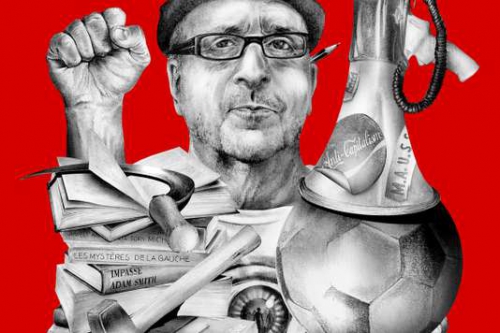
All abstract revolutionary doctrine, whether economic or political, warns Michéa, sacrifices the people to its power-seeking goals, whether Taylorist (revolutionizing the means of production to maximum efficiency) or Leninist (revolutionizing the control of the means of production to the point of absolute central control). Michéa finishes with a dire warning that what he calls “Silicon Valley liberalism” is the new face of an old ideology whose ideals are growth and progress in a world which cannot bear much more of either, and whose victims are the great mass of human beings, whose natural ethnic, geographical, and social attachments are being destroyed by humanity’s great enemy, capital. This is what Michéa has to say about the condescending pose of modern advanced and affluent liberal thinkers:
For a growing number of people of modest means, whose daily life is hell, the words “Left-wing” mean, if they mean anything at all, at best a defense of public sector workers (which they realize is a protected corral, albeit they may have an idealized view of public employees’ working conditions), and at worst, “Left-wing” means to them the self-justification of journalists, intellectuals, and show-business stars whose imperturbable and permanently patronizing tone has become literally intolerable. (p. 300) (Emphasis Michéa’s)
So now we are back where I started. Clinton ignored the rust belt and Donald Trump won the election. But now Donald Trump seems to be more interested in what he is most skilled at: accumulating capital. Brexit spokesmen seem to be more concerned with proving that Britain’s exit from the EU will open the way for more international trade than stressing that it provides the nation with the ability to close its borders and create a fairer society.
The liberal global model is one model of society, proposed to us today by the champions of globalism and growth; the society where, as John Rawls approvingly put it, individuals can exist side by side with each other while being mutually indifferent. Michéa asks, what is the second element within socialism, distinct from liberal notions of progress and growth, that is a model of society which is socialist but not global, not top-down? It is the socialism of the living indigenous community, of those who, as he puts it, “feel solidarity from the very beginning,” and socialism will be the rebirth, in superior form, of an archaic social type. The choice, in other words, is between a true community of kindred spirits and the barbarism of global centralized power, whose aim is to reduce human society to a mass of hapless individuals easily divided and oppressed.
18:26 Publié dans Livre, Livre, Philosophie, Théorie politique | Lien permanent | Commentaires (0) | Tags : socialisme, libéralisme, jean-claude michéa, théorie politique, politologie, sciences politiques, gauches, gauche, philosophie, capitalisme, philosophie politique |  |
|  del.icio.us |
del.icio.us |  |
|  Digg |
Digg | ![]() Facebook
Facebook
dimanche, 29 janvier 2017
UNDERSTANDING THE LEFT'S WEAPONIZATION OF CATEGORIES

UNDERSTANDING THE LEFT'S WEAPONIZATION OF CATEGORIES
Ex: http://alternative-right.blogspot.com
The greatest humiliations are to be outwitted by morons and shamed by scumbags, but that is exactly what keeps on happening to Conservatives whenever they run into the Left.
Based on what they espouse, the Left are clearly the lowest of the low. They freely believe in any number of ostensibly absurd and immoral ideas, but they nevertheless manage to run rings round their Conservative opponents, using a formula that should be relatively easy to understand and counter, but which Conservatives fail to do.
The way that the Left gulls Conservatives is as follows. They take two categories that are central to human identity, and which were formerly taken for granted, namely gender and race, and apply them to the social, moral, and cultural realms.
To defeat the Left we must recognize that there are in fact good forms of "racism" and "sexism," as well as bad ones, plus many gradations, none of them necessarily evil. The goal of political and philosophical debate should then be to identify where the good lies and which groups benefit and to what degree, and to slot this into a framework of the greater good.
The way that the Left gulls Conservatives is as follows. They take two categories that are central to human identity, and which were formerly taken for granted, namely gender and race, and apply them to the social, moral, and cultural realms.
There is nothing inherently wrong with this, but it requires a lot of complexity and subtlety, and calls for a case-by-case analytical approach using data and context. But, instead of doing that, the Left takes advantage of the fact that most people experience these categories on the individual level as identitarian absolutes. This allows the Left to give them a simple on/off moral character, a process that is facilitated by invoking the negative/positive dichotomy and turning them into simple moral negatives. The process is complete when the "-ist" suffix is added, marking them as somehow "sinister."
This is how the Left distorts things. Race and sex—extended from the individual to the social, moral, and cultural levels—should be categories of multifarious interpretation but the Left magically transforms them into crude moral simplicites with a prepackaged verdict. Categories that could have been applied productively to a wide range of issues, are thus reduced to mere "racism" and "sexism"—fixed, over-emotionalized states that either exist or don't in the same way that murder or pregnancy is or isn't.
But, even in its negative form, as a weaponized tool of the Left, Racism, given its polymorphous application, continually resists its oversimplification as a crude moral tool. It has many degrees that range from extremely harmful ethnomasochism all the way through to psychopathic and self-harming hatred of the Other, via a number of beneficial and even mutually beneficial states in between. This is something that the Left has to work constantly to stop us seeing.
The various degrees of Racism and Sexism can be likened to the three bowls of porridge in the children's story "Goldilocks and the Three Bears": One is too hot, one too cold, and one just right. What the Left has done however is to convince "Goldilocks" that all the bowls of porridge are scalding hot, and thus scared her away from ever going anywhere near porridge. In the same way, the Left manages to convince Conservatives that racism and sexism are "always too hot," even when there are clearly examples of them being "just right."
From a debate over whether something is harmful or beneficial in a specific situation, or about what groups benefit and to what degree, we have moved into an inquisition and an assertion of evil. In short, a medievalist approach has prevailed. This suits the regressive nature of the Left.
When the Left decides to attack something, you will often see stories that start with headlines or intros asking the question whether such-and-such a thing/person is "racist" or "sexist," or, if the Left is soft-peddling for some reason, "symbolic of our racist/sexist past," etc.
This simplification and weaponization of categories gives the Left an enormous advantage over their opponents, because, almost everything human touches on gender or race in some way, and involves inequalities. Thus anything can be spun as "racist" or "sexist"—and therefore deeply negative—in order to suit whatever agenda the Left wishes to run with that day.
Once the Left is able to point to something that indicates any kind of inequality of outcome and connect it to race or gender, it is essentially game over. Conservatives have little option but to pack their knapsacks and resume their endless trudge backwards.
The way that this can be fought is to simply reject the Left's relentless imposition of moral simplicity and absolutism on categories that are complex, contextual, and gradated, and which include beneficial as well as detrimental aspects.
To defeat the Left we must recognize that there are in fact good forms of "racism" and "sexism," as well as bad ones, plus many gradations, none of them necessarily evil. The goal of political and philosophical debate should then be to identify where the good lies and which groups benefit and to what degree, and to slot this into a framework of the greater good.
A version of this article was previously published at Counter-Currents
Connected Article:
Racism and Sexism Viewed as Aristotelian Virtues
Connected Article:
Racism and Sexism Viewed as Aristotelian Virtues
11:43 Publié dans Définitions, Philosophie | Lien permanent | Commentaires (0) | Tags : alt-right, gauche, philosophie, définition |  |
|  del.icio.us |
del.icio.us |  |
|  Digg |
Digg | ![]() Facebook
Facebook
mercredi, 30 novembre 2016
François Hollande, fossoyeur de la gauche de gouvernement

François Hollande, fossoyeur de la gauche de gouvernement
par Jean-Paul Baquiast
Ex: http://www.europesolidaire.eu
En France, jusqu'ici, la gauche dite de gouvernement, c'est-à-dire capable dans le cadre de la 5e République, de faire élire un président se réclamant d'elle, était incarnée par le Parti socialiste, PS. En face d'elle, la droite de gouvernement l'était essentiellement par un parti majoritaire en son sein, appelé successivement UMP puis plus récemment Les Républicains.
Lors de la dernière élection présidentielle, la gauche l'avait emporté en faisant élire un président se réclamant d'elle, François Hollande, face à un président se réclamant de la droite, Nicolas Sarkozy. Cependant, une part de plus en plus importante de l'électorat ne s'était pas reconnue, pour des raisons diverses que nous n'analyserons pas ici, tant dans la droite que dans la gauche. Elle avait rejoint le Front National, FN, incarné par Marine Le Pen. Le FN est dit d'extrême droite ou populiste par ses adversaires, mais il revendique plutôt le qualificatif de souverainiste.
L'échec du quinquennat Hollande
L'échec du quinquennat Hollande
L'exercice du pouvoir par l'actuel président socialiste, François Hollande, n'avait pas permis malgré quelques réussites mineures, à donner au PS la capacité de mettre en oeuvre de véritables changements susceptibles de satisfaire les exigences de son électorat. Il en est résulté que la France, dans le cadre de l'Union européenne, UE, n'est plus en état de concurrencer l'Allemagne. Selon de nombreux analystes, parmi lesquels nous nous rangeons, elle n'aurait pu le faire qu'en adoptant un système d'économie politique où l'Etat aurait exercé un rôle important d'investisseur face à l'industrie allemande, laquelle n'a pas besoin de l'Etat allemand pour investir ni pour exporter.
C'est dans le domaine des services publics que l'intervention de l'Etat aurait permis de valoriser les atouts industriels et de recherche spécifiquement français. Elle se serait heurtée, dira-t-on aux résistances de l'UE, provenant essentiellement de la volonté allemande de conserver le monopole de la puissance dans l'économie européenne Mais aujourd'hui nul ne doute que la France, par la voix de son président, aurait eu gain de cause en menaçant de quitter l'UE si les statuts de celle-ci n'avaient pas été modifiés afin de lui permettre de jouer de son atout, l'investissement public.
Malheureusement, François Hollande ne s'est pas montré capable de défendre les intérêts français au sein de l'UE. Ceci par manque de compétence ou plus gravement par manque de caractère. On rappelle aujourd'hui de plus en plus que si Charles de Gaulle avait été président à la place de François Hollande, il aurait pu le faire.
Les prochaines élections présidentielles
Il s'ensuit que face à l'échec du quinquennat Hollande, la droite de gouvernement, depuis quelques jours incarnée brillamment par François Fillon, sera en mesure de remplacer le PS lors du prochain quinquennat. Peut-être pourra-t-elle conserver le pouvoir un temps indéterminé par la suite.
Quant au FN, son avenir au pouvoir de gouvernement se jouera sur sa capacités à attirer des électeurs déçus par la gauche et la droite. Jusqu'à ces dernières semaines, on pouvait penser que le FN, en l'espèce Marine Le Pen, grâce à des apports de voix provenant des déçus du socialisme tel qu'incarné par François Hollande, serait en mesure de vaincre finalement les candidats que lui opposeraient les autres partis. Ceci reste aujourd'hui encore tout à fait possible. Mais aujourd'hui, certains analystes se demandent si, grâce au programme annoncé par François Fillon, un certain nombre des électeurs ayant choisi faute de mieux le FN, ne reviendraient par dans l'orbite de la droite. Dans cas, le succès de François Fillon à la prochaine présidentielle serait presque assuré.
Resterait pourtant à savoir ce qu'il adviendrait du PS et des autres partis de la gauche de gouvernement. Le PS conserverait-il assez d'électeurs pour se placer en concurrent crédible tant des Républicains que du FN? Compte tenu de la déception et l'amertume résultant du quinquennat désastreux à leurs yeux de François Hollande, ceci paraît hautement improbable. On peut pronostiquer sans grand risque que lors de la prochaine présidentielle, ils voteraient pour François Fillon ou pour Marine Le Pen. Tout au moins, ils s'abstiendraient.
Il en serait donc fini des espoirs du PS de conserver le pouvoir, tout au moins au plan national. Ceci peut-être définitivement, si l'application des programmes respectifs de François Fillon et de Marine Le Pen se révélait suffisamment convaincante pour leur permettre de respectivement renforcer durablement leur électorat.
Renoncer à se représenter
La plupart des cadres politiques du PS voire des autres mouvements de gauche se sont rendu compte de cette situation. Ils ont compris que s'ils ne présentaient aux prochaines élections des programmes véritablement crédibles pour sortir le pays de son déclin actuel, ils ne convaincront pas les électeurs. De plus et surtout, puisque dans notre régime présidentiel tout est incarné par un Président, il faudra impérativement que ces programmes soient conçus et appliqués par le futur Président.
Les candidats crédibles pour ce faire existent. On mentionne notamment Jean-Luc Mélenchon, s'il était capable de rassembler autour de lui tous les déçus du socialisme actuel. Certains mentionnent aussi Arnaud Montebourg. Encore faudrait-il qu'ils annoncent des programmes suffisamment « révolutionnaires » pour permettre à la France de mettre en oeuvre, éventuellement en dehors de l'UE, les politiques d'investissement public indispensables pour que le pays de redevienne un partenaire crédible dans le monde multipolaire qui se met en place.
Un autre candidat de gauche à la présidentielle aurait pu être Manuel Valls. Même si nul ne connait les détails du programme qui aurait été le sien, son caractère énergique et sa longue expérience de la vie politique, tant en France qu'à l'international en faisaient un candidat très sérieux, face à François Fillon ou à Marine Le Pen. Encore aurait-il fallu pour qu'il ait les mains libres, soit qu'il abandonne ses fonctions de Premier ministre, soit que François Hollande renonce rapidement à se représenter.
Le dernier « déjeuner » entre Hollande et Valls organisé par l'Elysée le 28/11 a montré qu'il n'en serait rien (voir par exemple http://www.francetvinfo.fr/politique/ps/primaire-a-gauche...) . D'une part François Hollande, sans annoncer encore de décision définitive, a clairement montré qu'il avait l'intention de ne pas renoncer à briguer le pouvoir. Les raisons qu'il invoque s'inspirent des plus hautes ambitions politiques au service du pays. Mais vu son bilan désastreux, il est évident qu'elles s'inspirent surtout de son intérêt personnel. Il ne veut pas, en annonçant qu'il ne se représentera pas, renoncer à tout espoir, fut-il mince, de rester à l'Elysée et de jouir des avantages de cette position.
Il en est de même pour Manuel Valls. Au lieu de démissionner de son poste de Premier ministre et courir tous les risques en résultant immédiatement pour sa carrière, il a préféré conserver quelques mois encore ce poste éminent et les avantages y afférents. Et ceci, là encore et quoiqu'il en dise, par intérêt personnel immédiat.
Ce sera donc finalement François Hollande qui, en refusant de renoncer à se représenter, pourra mériter, comme l'annonce le titre de notre article, le qualificatif peu enviable de fossoyeur de la gauche de gouvernement.
Cette situation montre bien les risques que fait courir au pays la constitution actuelle laquelle donne un rôle excessif au Président de la République. Tant que celui-ci n'est pas incarné par un homme de la trempe de ce que fut Charles de Gaulle, elle confie la tâche de diriger la nation à des personnalités politiques qui, sauf exception toujours possible, sont en fait animées par des ambitions personnelles démesurées, lesquelles cachent mal leur incompétence en profondeur. Nous ne visons ici ni François Fillon ni Marine Le Pen. Dans leur cas,il faudra attendre pour juger.
Il ne semble pas que ce handicap affecte les autres Etats européens, dotés de constitutions ou de pratiques politiques moins favorables à la recherche durable du pouvoir personnel.
NB au 20/11, 16h. Voir sur ce sujet un article très intéressant de Jacques Sapir
http://russeurope.hypotheses.org/5472
16:41 Publié dans Actualité, Affaires européennes, Politique | Lien permanent | Commentaires (0) | Tags : gauche, socialisme, françois hollande, france, europe, affaires européennes, politique internationale, politique |  |
|  del.icio.us |
del.icio.us |  |
|  Digg |
Digg | ![]() Facebook
Facebook
jeudi, 08 septembre 2016
Le clivage droite/gauche est-il mort?

Le clivage droite/gauche est-il mort?
Entretien avec Arnaud Imatz
Propos recueillis par Alexandre Devecchio
(Figaro Vox, 4 septembre 2016)
Ex: http://metapoinfos.hautetfort.com
 Emmanuel Macron a présenté sa démission à François Hollande, qui l'a acceptée. L'ancien ministre de l'économie va se consacrer à son mouvement «En marche» et préparer une éventuelle candidature à la présidentielle. Il entend dépasser le clivage droite/gauche. Est-ce le début de la fin de ce que vous appelez une «mystification antidémocratique»?
Emmanuel Macron a présenté sa démission à François Hollande, qui l'a acceptée. L'ancien ministre de l'économie va se consacrer à son mouvement «En marche» et préparer une éventuelle candidature à la présidentielle. Il entend dépasser le clivage droite/gauche. Est-ce le début de la fin de ce que vous appelez une «mystification antidémocratique»?
À l'évidence Monsieur Macron a des atouts dans son jeu. Il est jeune, intelligent, il apprend vite et il n'est pas dépourvu de charisme et de charme. Il a en outre eu la bonne idée de créer une petite structure, En Marche ce que n'avait pas pu, su, ou voulu faire en son temps Dominique de Villepin. Mais si un «mouvement» ou -pour être plus exact - une simple association de notables peut jouer un rôle de parti charnière, et in fine obtenir un ou deux portefeuilles ministériels, je ne crois pas qu'elle puisse suffire pour positionner sérieusement un leader comme candidat crédible à la présidentielle de 2017. Sous la Ve République, seuls les chefs de grands partis, ceux qui en contrôlent les rouages, ont des chances de succès. On voit mal comment dans un parti socialiste aux mains de vieux éléphants un consensus pourrait se dégager spontanément autour de quelqu'un dont le style et les idées ne sont appréciés ni des barons, ni de la majorité des militants. Mais en politique il ne faut exclure aucune hypothèse. Macron est un politicien, sinon chevronné, du moins déjà expérimenté. Il connaît très bien la magie des mots. Il a dit et laisser dire qu'il souhaitait dépasser le clivage droite/gauche et qu'il n'était pas socialiste (après tout il semble qu'il ne l'ait été, comme membre du Parti socialiste, que de 2006 à 2009… à l'époque où il était encore banquier d'affaires). Il s'est réclamé récemment de Jeanne d'Arc flattant à peu de frais un certain électorat de droite toujours sensible aux envolées lyriques devant un des symboles de la nation. Le jour de sa démission, il a précisé qu'il n'avait jamais dit qu'il était «ni de droite, ni de gauche», ce qui d'ailleurs ne lui a rien coûté car cette double négation ne veut pas dire grand-chose. Sans doute eût-il été plus honnête et plus correct d'affirmer devant les français: «je ne suis pas simultanément de droite et de gauche». Cela dit, il s'est aussi déclaré dans le camp des progressistes contre celui des conservateurs. J'imagine sans peine que forcé de nous expliquer ce que sont pour lui les progressistes et les conservateurs, il ne manquerait pas de nous asséner quelques lieux-communs sur les prétendus partisans du progrès, de la raison, de la science, de la liberté, de l'égalité et de la fraternité face aux immobilistes, aux réactionnaires et aux populistes. Je dirai que Macron est un énième remake de Tony Blair, Bill Clinton et Gerhard Schröder. N'oublions pas que ces vedettes politiques de l'époque cherchaient à s'approprier, par-delà les clivages de droite et de gauche, la capacité de mobilisation de la «troisième voie».
Le système des primaires est-il un moyen de faire perdurer cette «mystification»?
Oui! bien évidemment. Il y a en fait une double mystification antidémocratique. Il y a d'abord celle de la division droite / gauche, à laquelle je me réfère dans mon livre. C'est celle que José Ortega y Gasset qualifiait de «formes d'hémiplégie morale» dans La révolte des masses déjà en 1929. C'est aussi celle dont Raymond Aron disait qu'elle reposait sur des «concepts équivoques» dans L'opium des intellectuels en 1955 (Je fais d'ailleurs un clin d'œil admiratif à son œuvre dans l'intitulé de mon livre). Cette dichotomie a été également dénoncée ou critiquée par de nombreuses figures intellectuelles aussi différentes que Simone Weil, Castoriadis, Lasch, Baudrillard ou Gauchet et, elle l'a été plus récemment par une kyrielle d'auteurs. Mais il y a aussi une seconde mystification antidémocratique qui affecte directement les partis politiques. Ce sont les leaders et non les militants qui se disputent le pouvoir. À l'intérieur des partis la démocratie est résiduelle, elle exclut la violence physique mais pas la violence morale, la compétition déloyale, frauduleuse ou restreinte. Il y a bien sûr des partis plus ou moins démocratiques qui parviennent à mitiger et à contrôler les effets de leur oligarchie mais s'ils existaient en France, en ce début du XXIe siècle, je crois que ça se saurait.

L'opposition droite/gauche peut-elle vraiment se résumer à un «mythe incapacitant»? Comme le souligne Denis Tillinac, ces deux courants ne sont-ils pas, malgré tout, irrigués par un imaginaire puissant dans lequel les électeurs se reconnaissent?
Il ne s'agit pas d'essences inaltérables. Je ne crois pas qu'il y ait «des valeurs permanentes de droite» et des «principes immortels de gauche». Il n'y a pas d'opposition intangible entre deux types de tempéraments, de caractères ou de sensibilités. Il n'y a pas de définitions intemporelles de la droite et de la gauche. Denis Tillinac nous parle de deux courants qui seraient «irrigués par un imaginaire puissant». Mais un imaginaire forgé par qui? Par les Hussards noirs de la République et les Congrégations religieuses? Et depuis quand? Depuis 1870, depuis1900 voire depuis 1930 nous répondent les historiens.
Je n'ignore pas bien sûr le point de vue des traditionalistes. Je sais que pour les traditionalistes être de droite ce n'est pas une attitude politique mais une attitude métaphysique. Je sais qu'ils considèrent que la gauche s'acharne à réduire l'homme à sa mesure sociale et économique. Que pour eux la droite et la gauche sont caractérisées par deux positions métaphysiques opposées: la transcendance et l'immanence. Ils sont les défenseurs d'une droite idéale, sublime, transcendantale ou apothéotique, celle que les partisans de la religion républicaine, d'essence totalitaire, Robespierre et Peillon, vouent perpétuellement aux gémonies.
Pour ma part, en me situant sur les plans politique, sociologique et historique, je constate que les chassés croisés idéologiques ont été multiples et permanents. Je peux citer ici le nationalisme, le patriotisme, le colonialisme, l'impérialisme, le racisme, l'antisémitisme, l'antichristianisme, l'antiparlementarisme, l'anticapitalisme, le centralisme, le régionalisme, l'autonomisme, le séparatisme, l'écologisme, l'américanophilie/américanophobie, l'europhilie/europhobie, la critique du modèle occidental, l'alliance avec le tiers-monde et avec la Russie, et bien d'autres exemples marquants, qui tous échappent à l'obsédant débat droite/gauche. Il suffit de s'intéresser un minimum à l'histoire des idées pour se rendre compte très vite que les droites et les gauches ont été tour à tour universalistes ou particularistes, mondialistes ou patriotiques, libre-échangistes ou protectionnistes, capitalistes ou anticapitalistes, centralistes ou fédéralistes, individualistes ou organicistes, positivistes, agnostiques et athées ou théistes et chrétiennes. Un imaginaire puissant dans lequel les électeurs se reconnaissent? Non! je dirais plutôt, avec le marxologue Costanzo Preve, que ce clivage est «une prothèse artificielle».
Selon vous, un nouveau clivage politique oppose désormais le local au mondial, les enracinés aux mondialisés…
J'avoue que la lecture de la philosophe Simone Weil m'a profondément marqué dans ma jeunesse. Elle a su brillamment démontrer que la dyade vecteur du déracinement / soutien de l'enracinement, explique la rencontre durable ou éphémère entre, d'une part, des révolutionnaires, des réformistes et des conservateurs, qui veulent transformer la société de manière que tous ouvriers, agriculteurs, chômeurs et bourgeois puissent y avoir des racines et, d'autre part, des révolutionnaires, des réformistes et des conservateurs qui contribuent à accélérer le processus de désintégration du tissu social. Elle est incontestablement une «précurseuse». Depuis le tournant du XXIe siècle nous assistons en effet à une véritable lutte sans merci entre deux traditions culturelles occidentales: l'une, est celle de l'humanisme civique ou de la République vertueuse ; l'autre, est celle du droit naturel sécularisé de la liberté strictement négative entendue comme le domaine dans lequel l'homme peut agir sans être gêné par les autres. L'une revendique le bien commun, l'enracinement, la cohérence identitaire, la souveraineté populaire, l'émancipation des peuples et la création d'un monde multipolaire ; l'autre célèbre l'humanisme individualiste, l'hédonisme matérialiste, le «bougisme», le changement perpétuel, l'homogénéisation consumériste et mercantiliste, l'État managérial et la gouvernance mondiale sous la bannière du multiculturalisme et du productivisme néocapitaliste.
Le général De Gaulle savait qu'on ne peut pas défendre réellement le bien commun la liberté et l'intérêt du peuple, sans défendre simultanément la souveraineté, l'identité et l'indépendance politique, économique et culturelle. Passion pour la grandeur de la nation, résistance à l'hégémonie américaine, éloge de l'héritage européen, revendication de l'Europe des nations (l'axe Paris-Berlin-Moscou), préoccupation pour la justice sociale, aspiration à l'unité nationale, démocratie directe, antiparlementarisme, national-populisme, ordo-libéralisme, planification indicative, aide au Tiers-monde, telle est l'essence du meilleur gaullisme. Où voyez-vous les gaullistes aujourd'hui? Henri Guaino? qui est peut être l'héritier le plus honnête? Mais combien de couleuvres a déjà avalé l'auteur des principaux discours du quinquennat de «Sarko l'Américain»?

La chute du mur de Berlin a-t-elle mis fin à ce clivage?
Souvenez-vous de ce que disait le philosophe Augusto del Noce peu de temps avant la chute du mur de Berlin: «le marxisme est mort à l'Est parce que d'une certaine façon il s'est réalisé à l'Ouest». Il relevait de troublantes similitudes entre le socialisme marxiste et le néo-libéralisme sous sa double forme sociale-libérale et libérale-sociale, et citait comme traits communs: le matérialisme et l'athéisme radical, qui ne se pose même plus le problème de Dieu, la non-appartenance universelle, le déracinement et l'érosion des identités collectives, le primat de la praxis et la mort de la philosophie, la domination de la production, l'économisme, la manipulation universelle de la nature, l'égalitarisme et la réduction de l'homme au rang de moyen. Pour Del Noce l'Occident avait tout réalisé du marxisme, sauf l'espérance messianique. Il concluait à la fin des années 1990 en disant que ce cycle historique est en voie d'épuisement, que le processus est enfin devenu réversible et qu'il est désormais possible de le combattre efficacement. Je me refuse à croire que la décomposition actuelle nous conduit seulement à la violence nihiliste. Je crois et j'espère qu'elle est le signe avant-coureur du terrible passage qu'il nous faudra traverser avant de sortir de notre dormition.
Arnaud Imatz, propos recueillis par Alexandre Devecchio (Figaro Vox, 4 septembre 2016)
00:05 Publié dans Actualité, Entretiens, Livre, Livre, Théorie politique | Lien permanent | Commentaires (0) | Tags : arnaud imatz, entretien, france, livre, politique, théorie politique, gauche, droite, progressisme, conservatisme, politologie, sciences politiques, philosophie politique |  |
|  del.icio.us |
del.icio.us |  |
|  Digg |
Digg | ![]() Facebook
Facebook
lundi, 11 juillet 2016
Sid Lukkassen interviewt Yernaz Ramautarsing; "Alles aan links is hypocriet!"
00:05 Publié dans Actualité, Entretiens | Lien permanent | Commentaires (0) | Tags : actualité, pays-bas, sid lukkassen, yernaz ramautarsing, débat, gauche, politiquement correct |  |
|  del.icio.us |
del.icio.us |  |
|  Digg |
Digg | ![]() Facebook
Facebook
jeudi, 02 juin 2016
German Left Party's Geopolitical Split
00:05 Publié dans Actualité, Affaires européennes, Politique | Lien permanent | Commentaires (0) | Tags : politique internationale, politique, actualité, europe, allemagne, affaires européennes, géopolitique, gauche, gauche allemande, die linke, sarah wagenknecht |  |
|  del.icio.us |
del.icio.us |  |
|  Digg |
Digg | ![]() Facebook
Facebook









Ganz leicht weicht das stinkende linke Narrativschiff von seinem seit Jahren festen Kurs ab. Ob heraufziehende Klippen den Steuermann umdenken lassen? Vom „Kurve kriegen“ kann natürlich noch keine Rede sein, aber ein paar kleine Details stechen messerscharf ins Auge.
Fünf total nazihafte Vorfälle, die verwundern – und ein bisschen Hoffnung entstehen lassen.
Erstens: Volker Beck
Ex-Bundestagsabgeordneter Volker Beck, der wegen seines Crystal-Meth-Konsums in die Schlagzeilen geraten war, forderte im April das Land Hessen auf, dem islamischen Verband DITIB den Status als Religionsgemeinschaft abzuerkennen. Grund dafür war ein militärisch inszeniertes Kindertheaterstück in einer Moschee.
Beck wollte zwar hauptsächlich die Kurden, die linke Lieblingsethnie in Schutz nehmen, aber das Ergebnis ist das Gleiche: Ein bekannter Linker, selbst wenn er aus dem Bundestag gegangen wurde, greift klar und offen den Islam in Deutschland an – das hätte es vor zwei Jahren noch nicht gegeben.
Zweitens: Indymedia
Das linke Fußvolk marschiert neben dem Flaggschiff MS-Links. Auch ihre Richtung hat sich geändert. Etwa nach rechts? Die neue Indymedia-Seite, die nach dem Verbot durch das Bundesverfassungsgericht innerhalb kürzester Zeit aus dem Boden schoss, berichtete kürzlich über den Angriff der Antifa. Nichts Besonderes? Schließlich wird jedes Wochenende eine neue Schweinerei begangen.
Tatsächlich warfen die Linksterroristen ihren Brandsatz nicht in ein AfD-Bürgerbüro, sondern in eine Moschee. Grund: Die stand angeblich türkischen Rechtsextremen, der Partei BBP (Büyük Birlik Partisi) nahe. „Nachdem bereits viel spekuliert worden ist, bekennen wir uns zu dem Angriff mit Molotow-Cocktails gegen den Treffpunkt türkischer Faschisten in der Kasseler Bunsenstraße“, gibt die Antifa im Wortlaut bekannt.
Drittens: Wagenknecht
Sara Wagenknecht und Oskar Lafontaine trauten sich. Sie stellten sich als rebellische Establishment-Vertreter, im Angesicht brennenden Realismus gegen die bunte Multi-Kulti-Ideologie. Zumindest ein bisschen. Dazu hagelte es zwar Torten und linke Kritik, man sprach von rechten Verwirrungen, einer Querfront und Alterssenilität. Aber die „Nazi“-Vorwürfe gegen eine demokratische Sozialistin ließen Wagenknecht nicht von ihrer realpolitischen Überzeugung abrücken.
Zwar ist es ruhiger geworden, und die Politikerin ist froh die Sache nicht wieder ausdiskutieren zu müssen, aber in oppositionellen und im patriotischen Lager setzt man die ehemalige Stalinistin nicht mehr mit Blümchen-Hofreiter, Fatima-Roth oder „Freu-mich-drauf“-Göring-Eckardt gleich. Es gibt also noch eine, zumindest akzeptable Linke im Land.
Die wird zwar noch immer von Multikultis gewählt, allerdings mischen sich auch halbpatriotische Sozialisten und desillusionierte Grünwähler unter die Anhängerschaft. Von daher hat Wagenknecht strategisch alles richtig gemacht, auch wenn sie zum linken Buhmann auserkoren wurde. Sie erweitert das Spektrum der Linken und bietet der „Nummer vier“ eine Heimat.
Viertens: Kreuzberg
Im April gab der Berliner Senat bekannt, wo sogenannte „MUFs“ gebaut werden. Modulare Flüchtlingsunterkünfte, „Sammelwohnorte im Schnellbauverfahren“ nennt der RBB die neuen Wohnungen für Flüchtlinge. Die werden jetzt eben nicht weit weg gebaut, um linkes Gewissen zu befriedigen, aber niemanden zu stören, sondern direkt vor ihre Nase. In Berlin-Kreuzberg, der Ratiborstraße, direkt neben ein linkes Kollektiv. Dort leben Handwerker, Künstler, Lebenskünstler und Hippies auf einem freiräumigen Areal, wo durch die Politik nun 500 Flüchtlinge angesiedelt werden sollen.
Die Linken sträuben sich, egal ob Anwohner oder Handwerker, und sind „nicht generell dagegen“ Auch sagen sie: „Wir sind gerne bereit, als Kreuzberger diese Verantwortung anzunehmen“, aber – und damit löscht man alles, was vor dem „aber“ steht und outet sich als Nazi – aber eben nicht bei uns. Auch wollen sie „keinen falschen Applaus von irgendwelchen AfD-Leuten, weil Kreuzberg jetzt gegen Flüchtlinge ist“, deswegen schweige ich sofort.
Betonen sollte man abschließend, dass noch kein einziger Flüchtling auf dem Areal lebt, wo Linke der verschiedensten Couleur sich durch ihr Leben improvisieren – was geht da erst ab, wenn 500 Neubürger zwischen Familien und Arbeitsstätten umherwuseln?
Fünftens: Boris Palmer
Absolut wunderbar ist einfach „Grünen-Chef-Nazi“ Boris Palmer, seines Zeichens Oberbürgermeister von Tübingen. Dass man „Grünen-Chef-Nazi“ auch mit „gesundem Menschenverstand“ übersetzen kann, zeigt die aktuelle Stellungnahme Palmers. Dieser war vor einer Versammlung auf dem Weg durch die Fußgängerzone, als er sich von einem schwarzen Radfahrer gestört fühlte, der lässig im Zick-Zack durch die Leute fuhr und dabei Musik hörte.
Palmer machte seinem Ärger Luft und kritisierte das Verhalten des Schwarzen. Eine Grüne KritikerX_In meinte anschließend, was denn die Hautfarbe mit dem Fehlverhalten des Mannes zu tun habe. Palmer platzte der Kragen: „Weil der Typ mit nacktem Oberkörper, Kopfhörer und einer unglaublichen Dreistigkeit um die Leute rumgekurvt ist. Das gehört sich für niemand und für einen Asylbewerber schon dreimal nicht.“ Später ruderte er ein wenig zurück und verlor sich in Wischi-waschi-Begründungen, aber bei seiner Grundaussage blieb er.
Abschluss mit Houellebecq
Die nächsten Jahre werden Klarheit bringen. Die Stellung der politischen Akteure könnte sich wandeln, wie das bereits Michel Houellebecq in seinem Roman Unterwerfung beschrieben hatte. Bisher koalierten die Linken mit ihren gewünschten Neubürgern. Doch das ist ein Spiel auf Zeit. Zu brachial wird der Islam in unser Leben eintreten und selbst den verblendetsten linken Spinner sich zumindest überlegen lassen, wer die „Guten“ sind. Hoffen wir, dass es bis dahin nicht zu spät ist.
Ein letztes persönliches Wort als „Nazi“: Dafür, dass ihr Linken die letzten Jahre echt scheiße wart, würde ich mich freuen wieder was mit euch zu unternehmen. Im Gegenzug werde ich aber den Rest meines Lebens selbstgefällig grinsen. Wenn euch das nicht passt, könnt ihr ja wieder zu euren anderen Freunden gehen.